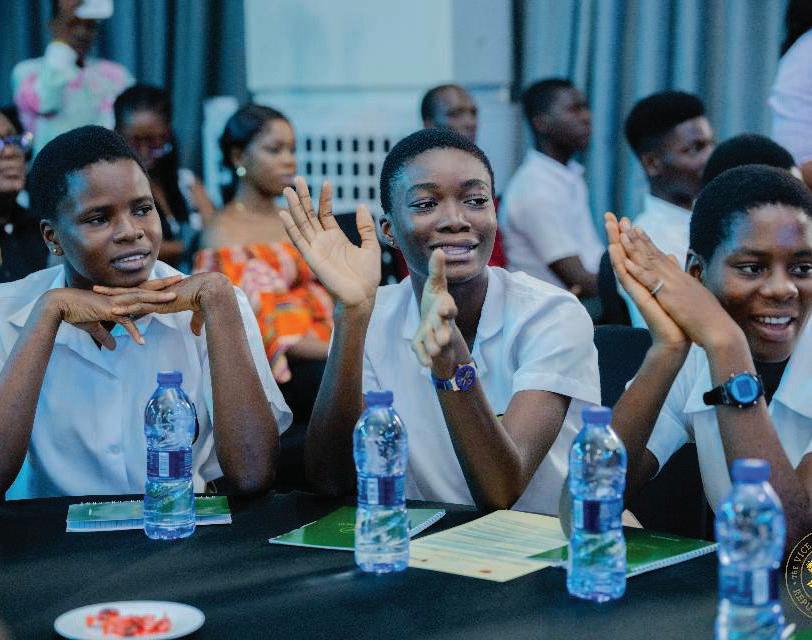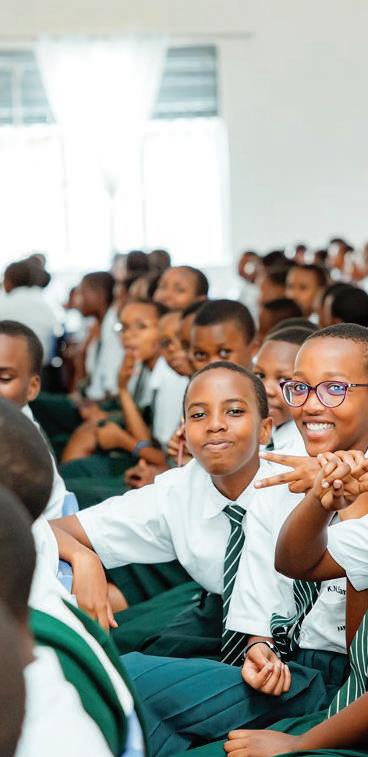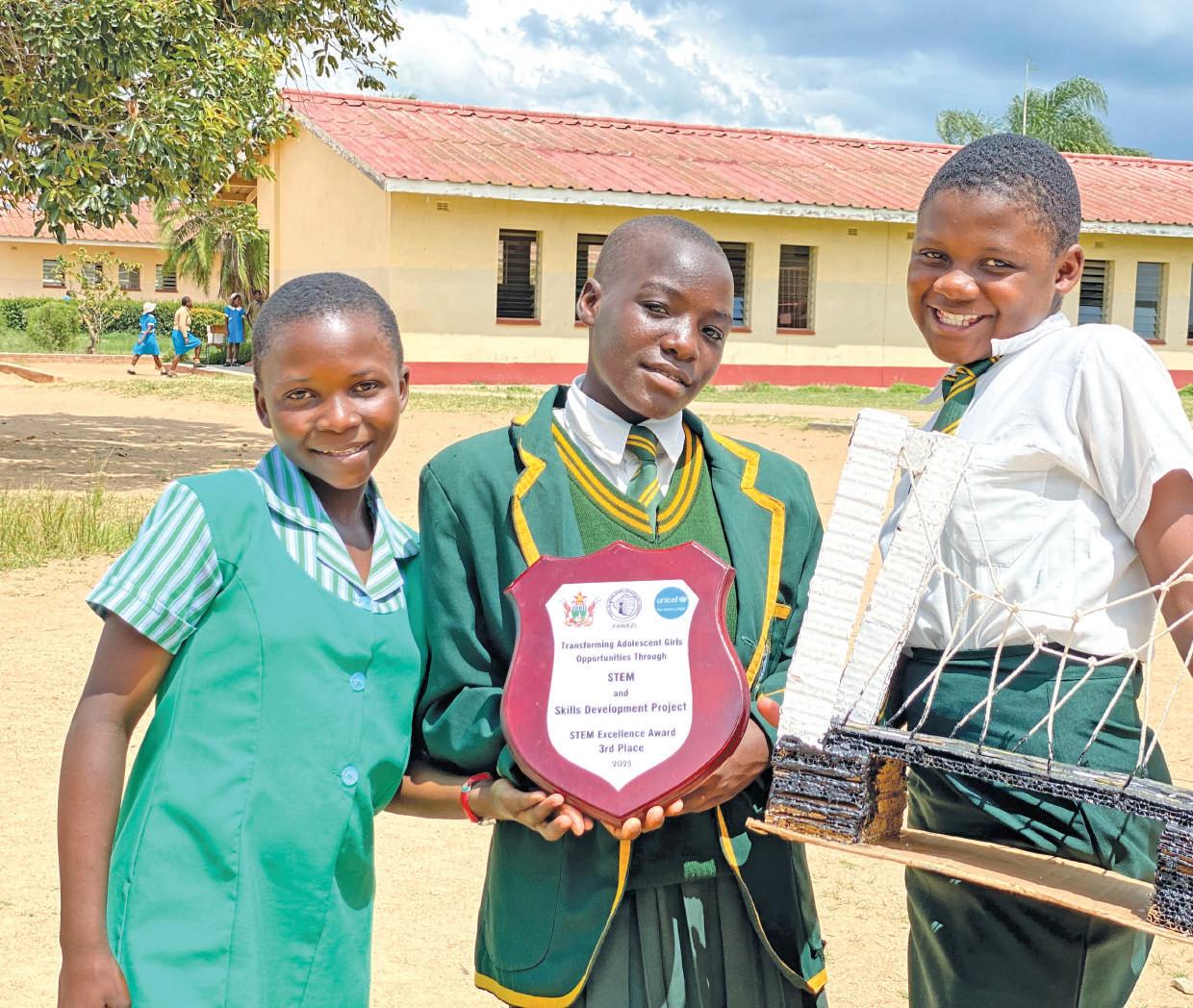

ANNUAL REPORT 2024
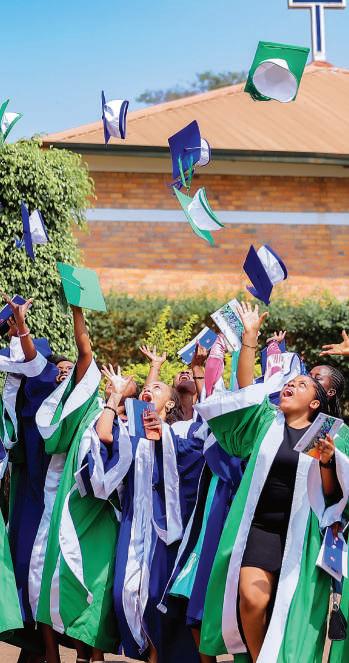
The Forum for African Women Educationalists (FAWE) is a membership-based pan-African Non-Governmental Organization that operates through 34 National Chapters in sub-Saharan Africa to promote girls’ and women’s education. FAWE’s vision, mission, and goal are all resolute on the well-being of girls’ education. FAWE’s Regional Secretariat is based in Nairobi, Kenya.
FAWE National Chapters: Benin, Burkina Faso, Burundi, Cameroon, Chad, Comoros, Congo, Ethiopia, Gabon, Ghana, Guinea, Kenya, Liberia, Madagascar, Malawi, Mali, Mozambique, Namibia, Nigeria, Democratic Republic of Congo, Rwanda, Senegal, Seychelles, Sierra Leone, Somalia, South Sudan, Swaziland, Tanzania, The Gambia, Togo, Uganda, Zambia, Zanzibar, and Zimbabwe.

COPYRIGHT:
This publication must not be reproduced for any purposes without prior written permission from FAWE. FAWE cannot be held responsible for any inaccuracies. Parts of this publication may be copied for use in research, advocacy, and education, provided that the source is acknowledged.
©FAWE Forum for African Women Educationalists (FAWE).
Cover photo: School children from Zimbabwe proudly display their STEM Excellence Award trophy.
FAWE/Mastercard Foundation Scholars Program participants at their graduation ceremony in Kigali, Rwanda.
Executive Summary
A Bold Step Forward for Girls’ Education in Africa
The year 2024 marked a pivotal moment for the Forum for African Women Educationalists (FAWE). Against the backdrop of the African Union’s Year of Education, FAWE launched our new Strategic Plan 2024–2028, a roadmap that places gender equality and inclusive learning at the heart of Africa’s development agenda.
Rooted in three strategic objectives, FAWE’s work this year focused on:
• Enhancing access to quality education and training opportunities for girls and women
• Generating and utilizing research to inform education policy and practice
• Strengthening the institutional capacity and operational effectiveness of the FAWE Network
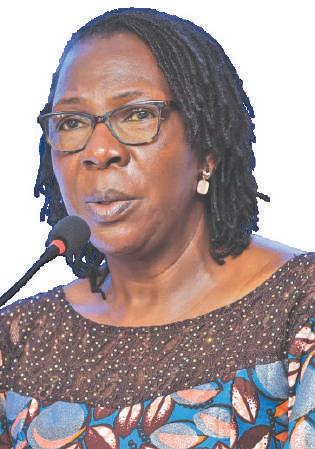
From the community level to the global stage, FAWE has remained a steadfast advocate for gender-responsive education systems that empower the continent’s girls and young women.
Key Milestones of 2024
• Phase II of the Mastercard Foundation-FAWE Partnership was launched, targeting 10,550 young people across 10 African countries with scholarships, TVET opportunities, and entrepreneurship support—empowering Africa’s most marginalized youth, especially girls and young people with disabilities.
• The Phase II programme was successfully launched in four countries (Uganda, Zambia, Malawi, and Ethiopia) bringing together key stakeholders to lay the Foundation for smooth implementation.
• 272 scholars graduated in Rwanda, and more than 5,000 girls reentered school in Kenya under the Imarisha Msichana programme. In Ethiopia, emergency support enabled girls at risk of dropout to stay in medical school— testimonies of resilience and timely intervention.
• Through FAWE’s digital innovation, a Tuseme App was piloted in 160 schools across Kenya, with 15,000+ learners enrolled, promoting empowerment and life skills through an accessible digital platform.
• FAWE took part in high-level global and continental advocacy platforms, including the Summit of the Future, ACERWC, ACHPR and the GIMAC Conferences, where FAWE championed calls for investment in girls’ education, youth leadership, and SRHR.
Dr. Martha Muhwezi, Executive Director, FAWE Africa.
• In partnership with UNESCO and ADEA, FAWE helped bring to life the Spotlight on Africa foundational literacy reports by documenting the lived experiences of children in Ghana and Senegal—bridging research and real-life impact.
•FAWE continued to lead research efforts across the region, publishing studies on gender norms, education access, the impact of genderresponsive schools, and a School Related Gender Based Violence manual that is being used to train teacher on the issue across the continent. FAWE’s work in Burkina Faso, Chad, DRC, and São Tomé revealed new insights into community engagement, menstruation management, and the persistence of harmful social norms.
•FAWE also led institutional strengthening through regional capacitybuilding workshops, enhancing the skills of national chapter teams in communication, fundraising, grant management, and program delivery—ensuring stronger and more sustainable impact across the network.
• FAWE worked on enhancing the governance of its chapters by General Assemblies and Board inductions in Benin, Nigeria, Rwanda, etc.
Looking Ahead
FAWE’s mission remains clear: to unlock the potential of every African girl through education. The organisation is proud of what has been achieved, but even more inspired by what lies ahead. Together with partners, governments, and communities, FAWE will continue to break down barriers, challenge inequality, and build a future where every girl can thrive.
Their success is our purpose. Their dreams, our responsibility.” Dr. Martha R.L. Muhwezi
As you read through this report, we invite you to reflect on the progress made and the journey ahead. We encourage all stakeholders, partners, and friends to continue working with us to create a future where every African girl and woman has access to quality, inclusive education and the opportunity to thrive.
Acknowledgments
The Forum for African Women Educationalists (FAWE) extends its sincere gratitude to all who contributed to the achievements reflected in this Annual Report.
We begin by recognizing the FAWE Africa Board, under the leadership of Hon. Aicha Bah Diallo, for their unwavering strategic oversight, commitment, and guidance that continue to steer the organization toward its vision of gender equality in education.
We equally appreciate the dedication and leadership of the Regional Secretariat, led by Dr. Martha Muhwezi, Executive Director, whose visionary direction continues to expand FAWE’s impact across the continent. Special appreciation goes to Ms. Teresa Omondi-Adeitan, Deputy Executive Director and Head of Programmes, for her exceptional stewardship in coordinating the implementation of the FAWE Strategic Plan, overseeing programmatic exellence across the network, documentation of the milestones achieved and recorded in this report.
We are deeply thankful to our development partners and donors for their continued trust, partnership, and support. Your contributions have been instrumental in sustaining and scaling our initiatives to empower African girls and young women through education.
To our 34 National Chapters, we express our heartfelt appreciation. Your dedication and country-level leadership have translated FAWE’s vision into life-changing actions across communities. Your tireless efforts are the backbone of our success.
Our gratitude also goes to all staff at the FAWE Regional Secretariat, whose professionalism, collaboration, and commitment made this report possible.
We offer special recognition to the Knowledge Management Department, led by Mr. Gordon Aomo, for ensuring that this report is anchored in evidence and reflects the impact of our work. We also thank the Communications Department, under Mr. Kossi Tsenou, with support from Ms. Emily Buyaki, Mr. Birane Diarra, Mr. Jérémie Sagna, and Mr. Alvin Musebe, for effectively documenting, designing, and amplifying FAWE’s milestones and stories.
To our members, alumni, and programme participants, we thank you for your voices, experiences, and resilience. Your stories lie at the heart of this report and continue to inspire our collective mission.
As you read this Annual Report, we invite you to reflect on how far we have come and to walk with us as we continue to build a future where every African girl has the right and opportunity to learn, lead, and thrive.
Preamble
When a girl is educated, it does more than transform her life — it sparks a ripple effect that uplifts families, strengthens communities, and accelerates national development. For over 33 years, the Forum for African Women Educationalists (FAWE) has remained steadfast in its mission to dismantle barriers to girls’ education and champion the rights of women and girls across Africa.
The year 2024 was not an ordinary one. Declared the African Union Year of Education, it served as a moment of reflection and reimagination — a chance to envision an Africa where every child, particularly every girl, accesses transformative, inclusive, and futureready education. FAWE embraced this moment with clarity of purpose and unwavering commitment.
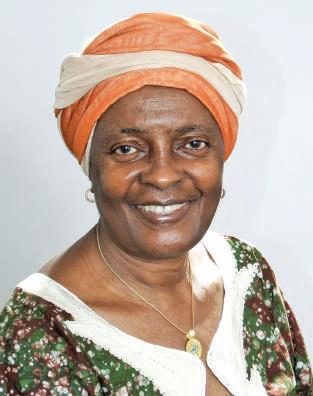
Under the leadership of Executive Director Dr. Martha Muhwezi and the support of the Regional Secretariat, FAWE made significant strides throughout the year. The organization launched its new Strategic Plan (2024–2028) and rolled out the Second Chance Pathways for Increased Access to Tertiary Education for Marginalized Young Women and Men — a seven-year programme implemented in 10 countries that supports over 10,550 young people, including refugees, teen mothers, and youth with disabilities, to transition into higher education and dignified livelihoods.
FAWE’s advocacy efforts were equally impactful. As the lead convener of the GIMAC platform during the AU Year of Education, the organization amplified the voices of girls and young women, ensuring their needs remained central to continental education priorities.
FAWE also strengthened its role in regional policy and human rights spaces, maintaining observer status with the African Committee of Experts on the Rights and Welfare of the Child (ACERWC) and the African Commission on Human and Peoples’ Rights (ACHPR). In both Maseru and Banjul, FAWE presented key recommendations on girls’ education, which were included in official outcome documents — affirming the organization’s credibility and influence.
Additionally, FAWE continued to co-lead the African Union’s Cluster on Girls’ and Women’s Education, while contributing to clusters on Teacher Development, Early Childhood Education, and TVET — ensuring a gender lens remains embedded throughout Africa’s education ecosystem.
The year concluded with FAWE’s participation in the Summit of the Future in New York, where the organization joined global leaders in shaping an inclusive education agenda. On the sidelines, at the Mastercard Foundation’s Powering Parity side event, FAWE launched Phase II of its partnership with the Foundation — a significant milestone in the shared mission to transform educational opportunities for Africa’s most marginalized youth.
Behind every figure in this report is a story of courage, resilience, and transformation — from girls returning to school after pregnancy, to teachers embracing inclusive practices, to communities beginning to see girls not as liabilities, but as future leaders.
This annual report is more than a record of achievements; it is a call to action. FAWE invites all partners and stakeholders to deepen collaboration, amplify their shared voice, and stay the course in building a future where no African girl is left behind and every dream has the opportunity to thrive.
Hon. Aïcha Bah Diallo, Chairperson, FAWE Africa Board
Hon. Aïcha Bah Diallo, Chairperson, FAWE Africa Board.
Abbreviations and Acronyms
ACER-UK Australian Council for Educational Research
ADEA Association for the Development of Education in Africa.
AMWIK Association of Media Women in Kenya
AU African Union
AUC African Union Commission
AU CIEFFA African Union / International Centre for Girls and Women’s Education in Africa
AUDA-NEPAD African Union Development Agency
AU ESTI African Union, Education, Science, Technology and Innovation
CEO Chief Executive Officer
CESA Continental Education Strategy for Africa
CIES Comparative and International Education Society
COCAFEM The Concertation of Collectives of Women’s Associations in the Great Lakes region
CSW Commission on the Status of Women
DRC Democratics Republic of Congo
EAC East African Community
ECOSCO Economic and Social Council
EDUFAM Girls’ Education for a Better Future EU European Union
FGM Female Genital Mutilation
FLN Foundational Literacy and Numeracy
GBV Gender-based violence
GIMAC Gender Is My Agenda Campaign Network
GIZ German Agency for International Cooperation
GPE Global Partnership for Education
GRP Gender Responsive Pedagogy
HEAC Higher Education Access Certificate
HERS-EA Higher Education Resource Services –East Africa
IDP Internally Displaced Person
ILO The International Labor Organization
INES Ruhengeri (Rwanda) The Institute of Applied Sciences (French: Institut d’Enseignement Supérieur de Ruhengeri)
IT Information Technology
KCPE Kenya Certificate of Primary Education
KCSE Kenya Certificate of Secondary Education
RS Regional Secretariat
SPG Strategic Planning Group
SRGBV School-Related Gender-Based Violence
SRHR Sexual and Reproductive Health and Rights
STEM Science, Technology, Engineering, and Mathematics
TVET Technical and Vocational Education and Training
UN United Nations
UNESCO United Nations Educational, Scientific and Cultural Organization
UNICEF United Nations Children’s Fund
WPP Women in Political Participation
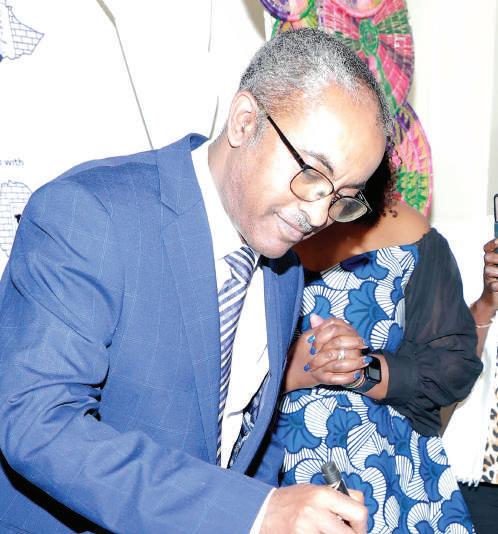
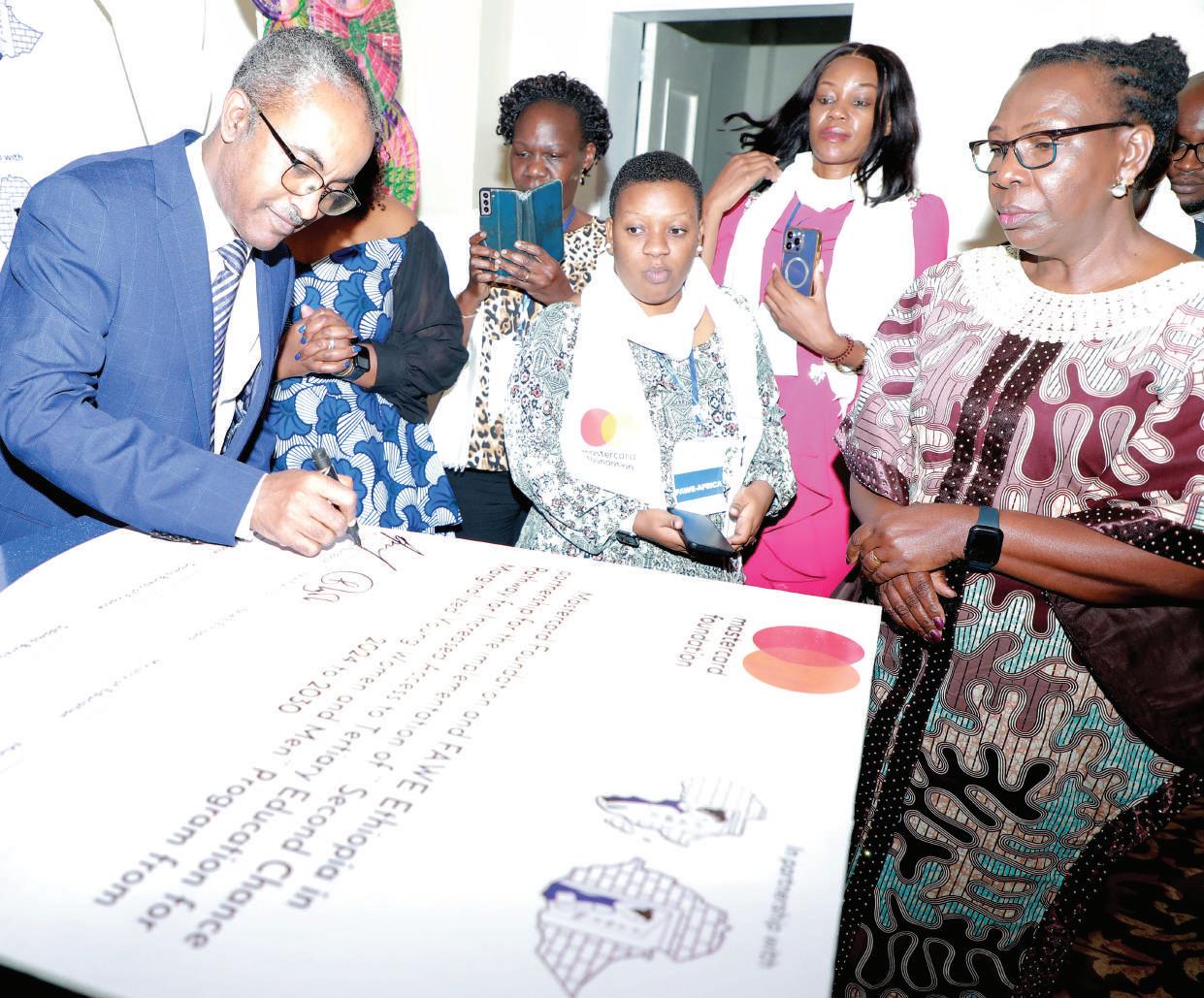
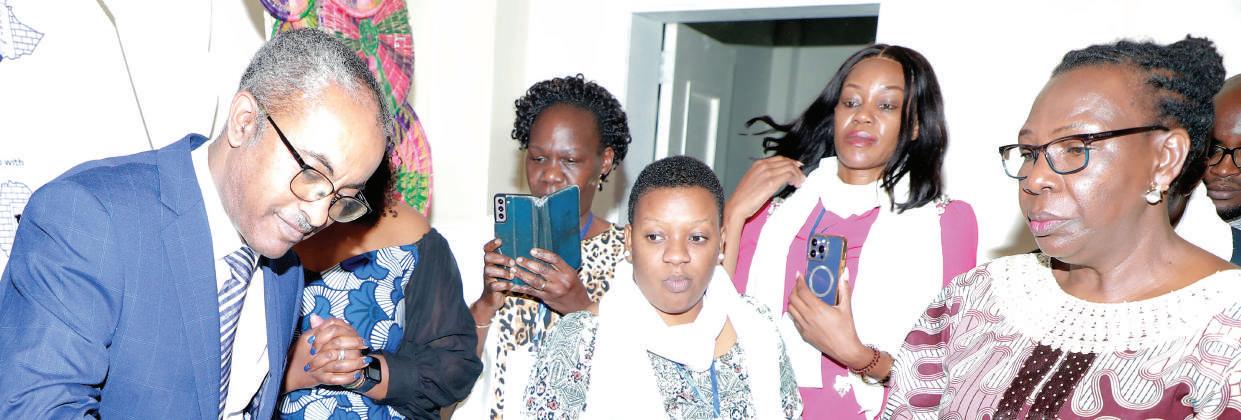
CHAPTER 01
Strategic Leadership and Vision for Girls’ Education
Asfaw, Head of Workforce Development at the Mastercard Foundation, Ethiopia, signs a board to signify the launch of the FAWE/ Mastercard Foundation Phase II Program in Ethiopia. Looking on are FAWE Executive Director Dr. Martha Muhwezi (right), FAWE Zimbabwe Executive Director Ms. Lydia Madyirapanzi (second right) Programme Manager FAWE Tanzania, Ms. Mary Mwakawago (center), and FAWE Uganda National Chapter Coordinator, Ms. Susan Opok Tumusiime (holding a mobile phone)
Dr. Fikadu
Dr. Martha R.L. Muhwezi: A beacon of Inspiration for Girls’ Education in Africa.
FAWE Africa celebrates the doctorate award to the Executive Director Dr. Martha Muhwezi, who has devotedly served the organisation for over 15 years. Dr. Martha earned her PhD in African Women Studies from the University of Nairobi. Her choice of specialisation not a surprise, as she is renowned for her passion for girls’ quality education and gender equality in Education for African girls. This academic achievement reinforces her expertise in education policy and gender advocacy, strengthening her role as a leading voice in shaping policies that support girls’ education across Africa. This remarkable milestone is a testament to her dedication, perseverance, and passion for advancing gender equality and education.
At a time when progress toward gender equality in education is facing setbacks, FAWE is confident that with a team leader of distinction and excellence, her academic accolade will grow FAWE’s body of research that informs education policies across the continent.
Her voice is recognized in major forums, including the African Union and global education summits, where she continues to push for transformative policies that ensure girls have equal access to quality education. She has been recognised and awarded by various institutions including named among top 10 finalist for the Africa Education Medal 2023 by T4 Education and HP in collaboration with Microsoft. The Africa Education Medal is Africa’s most prestigious education accolade.
Dr. Martha continues to be at the forefront of efforts to address gender disparities in education. She has fearlessly advocated for gender responsive education policies in Africa through high level advocacy with governments, development partners, and civil society organizations to advocate for policies that
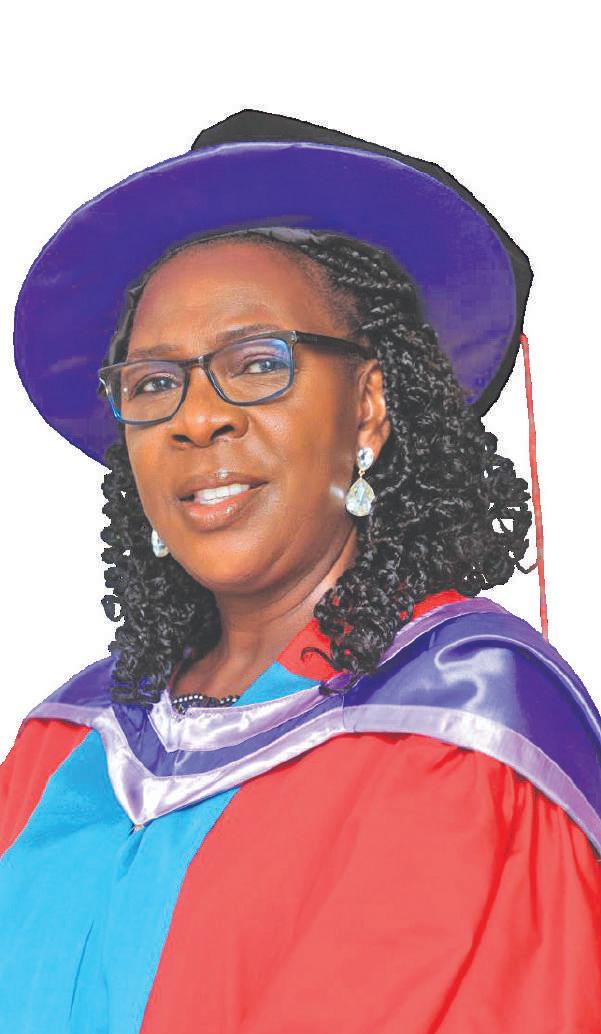
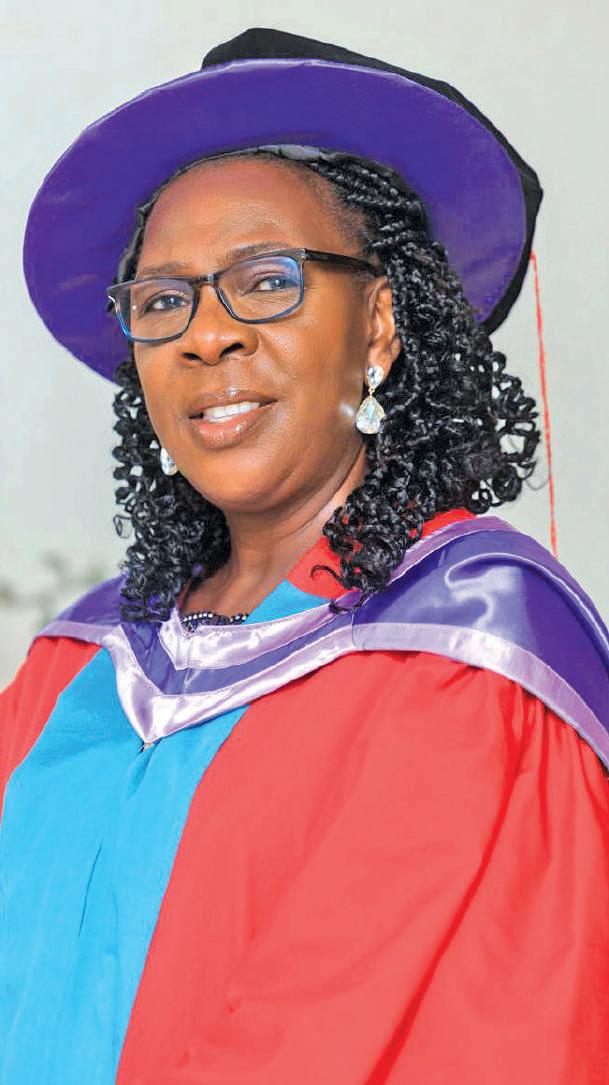
keep girls in school, including the re-entry of teenage mothers, addressing school-related gender-based violence, and increasing access to STEM for girls.
Her doctoral research specifically delved on gender perspectives in Technical Vocational Education Training (TVET); a deeper analytical foundation for tackling challenges faces by young when yet the world speaks to skills acquisition in the science world. The field examines the intersection of social structures, power dynamics, and systemic inequalities—key issues
Dr. Martha Muhwezi, Executive Director, FAWE Africa.
that directly influence education policies. With this expertise, Dr. Martha Muhwezi is positioned to drive more evidence-based and gender-responsive policy recommendations that align with Africa’s broader education and development goals.
Dr. Martha Muhwezi’s latest academic achievement is not just a personal triumph—it is an investment in the future of education policy in Africa. By combining her
she is set to deepen FAWE’s impact, drive stronger policy implementation, and further elevate the conversation on gender equality in education. She is an inspiration to girls in Africa whom FAWE champions for their education rights.
“We are told to let our light shine and if it does, we won’t need to tell anybody it does” Dwight L. Moody
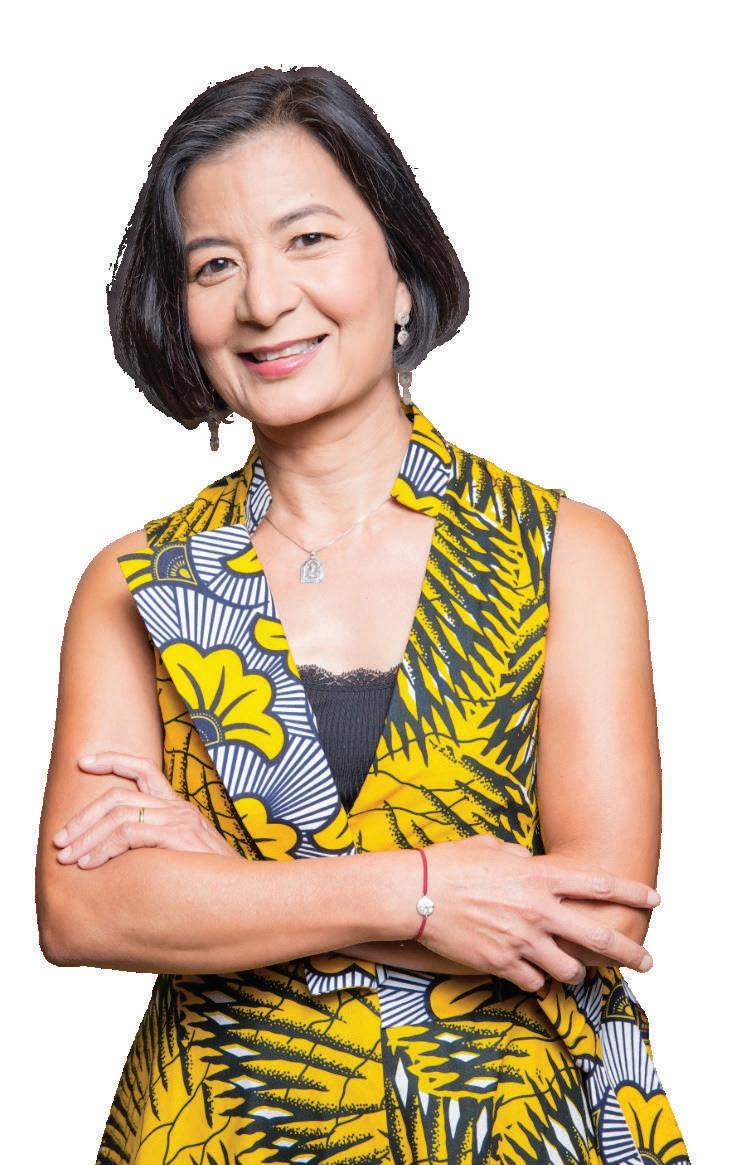
Keep shining Dr. Martha, FAWE is proud of you.
A
Legacy of Transformative Leadership and Partnership with FAWE
For over a decade, Reeta Roy has exemplified visionary leadership at the Mastercard Foundation, spearheading initiatives that have reshaped education, economic opportunities, and gender equity across Africa. As she transitions from her role as President and CEO, FAWE reflects on the remarkable legacy she leaves behind— one defined by impact, collaboration, and an unwavering commitment to the empowerment of young women and girls.
Reeta’s tenure at the Mastercard Foundation has been transformational for FAWE and the broader education landscape. Under her leadership, the Foundation prioritized African-led solutions, recognizing that sustainable
Reeta Roy, President and CEO Mastercard Foundation.
change must be rooted in the knowledge, aspirations, and agency of local communities. This philosophy was at the heart of our partnership, enabling FAWE to expand its reach, strengthen its institutional capacity, and refine its advocacy efforts to influence policy at national and regional levels.
Through initiatives such as the Mastercard Foundation Scholars Program, the Higher Education Access Program (HEAC), and the game-changing Phase II Program, thousands of young women who once faced formidable barriers to education have been given the chance to rewrite their futures. These programs have not only increased access to education but have also provided mentorship, leadership development, and pathways to dignified employment— ensuring that education translates into real-world opportunities.
FAWE has grown stronger through this collaboration. With the support of the Mastercard Foundation, we have been able to bolster our structures, enhance our programmatic approach, and amplify our advocacy for gender-responsive education systems. This partnership has reinforced FAWE’s ability to champion girls’ education at scale, ensuring that no girl is left behind, regardless of her background or circumstance.
Reflecting on Reeta Roy’s leadership and impact, Dr. Martha Muhwezi, Executive Director of FAWE, shared:
“Reeta Roy’s leadership has been truly transformative— not just for the Mastercard Foundation, but for the millions of young people whose lives have changed because of the opportunities she helped create. Her belief in the potential of African girls and young women has fueled groundbreaking programs that have reshaped the education and employment landscape. FAWE is deeply grateful for her partnership, her vision, and the lasting impact of her work. As she embarks on her next chapter, we celebrate the legacy she leaves behind—a legacy of inclusion, empowerment, and opportunity.”
As Reeta transitions from the Foundation, FAWE remains committed to advancing the shared vision of an Africa where education unlocks the full potential of every girl. Her legacy will continue to inspire and guide us as we work to ensure that education remains a powerful tool for transformation, equity, and prosperity.
FAWE expresses its heartfelt gratitude to Reeta Roy for her extraordinary leadership and unwavering support. The seeds she has planted will continue to flourish, shaping the lives of generations to come.
Reeta Roy’s leadership has been truly transformative—not just for the Mastercard Foundation, but for the millions of young people whose lives have changed because of the opportunities she helped create. Her belief in the potential of African girls and young women has fueled groundbreaking programs that have reshaped the education and employment landscape. FAWE is deeply grateful for her partnership, her vision, and the lasting impact of her work. As she embarks on her next chapter, we celebrate the legacy she leaves behind—a legacy of inclusion, empowerment, and opportunity.
FAWE Africa Unveils Strategic Plan 2024-2028 on the International Day of Education
On January 24, 2024, FAWE Africa marked a pivotal moment in its journey toward gender equality in education by launching its Strategic Plan 2024-2028 in Lusaka, Zambia. This new roadmap reaffirmed
SO 1
To enhance provision and access to quality education and training opportunities for girls and women in Africa.
FAWE’s unwavering commitment to advancing girls and women’s education across the continent.
The Strategic Plan is anchored on three key strategic objectives:
SO 2 SO 3
To enhance the generation and utilization of research evidence to inform education policy and practice.
“The FAWE Strategic Plan 2024-2028 represents our vision for the future. It is a comprehensive framework that sets ambitious goals and strategies to address the complex issues hindering the realization of gender equity in education,” stated Hon. Aïcha Bah Diallo, FAWE Africa Board Chairperson.
Each of these strategic objectives is aligned with targeted initiatives designed to create lasting impact. By prioritizing gender-responsive policies, removing systemic barriers, and fostering an inclusive educational environment, FAWE aims to empower millions of girls and women across Africa.
Speaking at the launch, Zambia’s Minister of Education, Hon. Douglas Syakalima, emphasized the alignment between FAWE’s vision and national educational objectives:
“FAWE’s Strategic Plan seamlessly integrates with Zambia’s education goals, emphasizing inclusivity and equal opportunities for all. In a country where education access remains a challenge, FAWE has been a beacon of hope, tirelessly working to dismantle barriers that hinder the educational journey, particularly for young girls.”
The unveiling of the Strategic Plan underscores FAWE’s
To strengthen institutional capacity and enhance the operational effectiveness of the FAWE network.
long-standing commitment to promoting gender equality in education. Over the past three decades, FAWE has collaborated with governments, local partners, schools, and communities to mainstream gender in education policies and interventions, influencing transformative change across Africa.
Reflecting on FAWE’s achievements and future aspirations, Dr. Martha Muhwezi, Executive Director of FAWE Africa, shared:
“I am profoundly proud of the remarkable milestones achieved over the past five years and the enduring legacy built during FAWE’s 30-year journey. Together, we have empowered countless girls across Africa, breaking barriers and opening doors to education. As we embark on the next chapter with our new strategic plan, I am filled with optimism. With unwavering commitment and collaborative efforts, we aim to amplify our impact, transforming more lives and shaping a future where every girl’s potential is nurtured and celebrated.”
The momentum continued in 2024, with FAWE national chapters such as FAWE Zambia, FAWE Malawi, FAWE Uganda, FAWE Ethiopia and FAWE Sierra Leone launching their own strategic plans, further solidifying their commitment to governance best practices and local impact.
FAWE’s Strategic Plan 2024-2028 serves as a roadmap for action and measurable impact. Over the next five years, FAWE will focus on strengthening organizational capacity and leadership, enhancing programmatic outcomes, and driving sustainable development. Key priority areas include expanding access to quality education, improving teaching and learning outcomes, promoting gender-responsive policies, and advocating for systemic reforms at national and regional levels.
As FAWE embarks on this new strategic phase, the organization remains steadfast in its mission to ensure that no girl is left behind in Africa’s educational transformation. With bold aspirations and a clear vision, FAWE is poised to drive significant progress in gender equality and education across the continent.
Scan to Access the Full Strategic Plan Document.
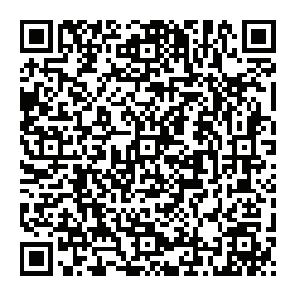
As we embark on the next chapter with our new strategic plan, I am filled with optimism. With unwavering commitment and collaborative efforts, we aim to amplify our impact, transforming more lives and shaping a future where every girl’s potential is nurtured and celebrated.”
Dr. Martha Muhwezi
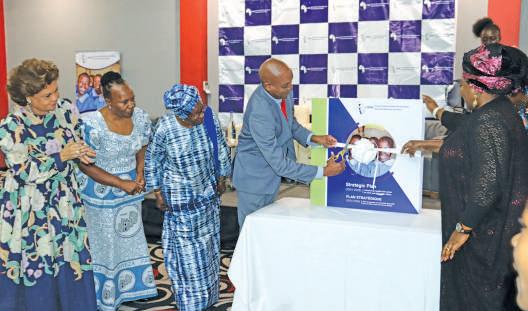
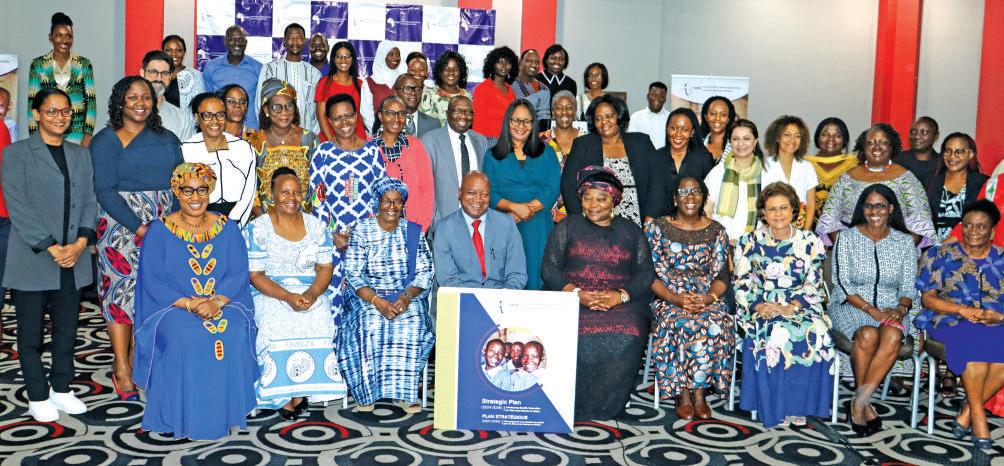
(Top) Minister of Education in Zambia, Hon. Douglas Syakalima cuts a ceremonial ribbon to signify the launch of the FAWE Africa Strategic Plan (2024-2028) in Zambia. Looking on are Prof. Sarah Anyang Agbor, Vice Chairperson, FAWE Africa Board (right), Hon. Aicha Bah Diallo, Chairperson, FAWE Africa Board (third left), Prof. Enala Tembo Mwase, Board Chairperson FAWE Zambia Board (second left) and Hon. Simon De Comarmond, one of FAWE’s founders and Board Member, FAWE Africa Board.
(Above) A group photo at the launch event.
Governance: The Pillar of Strength Behind FAWE’s Network
At the Forum for African Women Educationalists (FAWE), governance is not just a structure—it is the foundation that sustains and propels the network’s mission of advancing gender-responsive education across Africa. Throughout 2024, FAWE reaffirmed its strong commitment to participatory, transparent, and accountable governance across the regional secretariat and its 34 National Chapters
At the national level, several National Chapters held their General Assemblies, reinforcing the importance of member participation and leadership renewal. General Assemblies serve as vital moments for reviewing achievements, setting strategic priorities, and ensuring that governance structures are aligned with FAWE’s vision and core values
In 2024, FAWE Regional Secretariat supported governance systems across chapters including FAWE Kenya, FAWE Congo Brazzaville, FAWE Tanzania, FAWE Liberia, FAWE Ethiopia, and FAWE
Burundi. Full General Assemblies, followed by the induction of newly elected Boards, were conducted in FAWE Seychelles, FAWE Guinea, FAWE Nigeria, FAWE Benin, and FAWE Mali. Each of these gatherings was crucial in strengthening leadership, renewing mandates, and reaffirming the chapters’ commitment to FAWE’s mission.
Recognizing the need for strong institutional capacity to sustain impactful programming, FAWE prioritized governance capacity building. In 2024, a total of 42 participants from 11 National Chapters were trained in 2024 on effective programme management and governance practices to enhance gender equality in education.
In addition, several chapters including FAWE Zimbabwe, FAWE Ghana, FAWE Liberia, FAWE Chad, FAWE Mali, FAWE Namibia, FAWE Somalia, FAWE Togo, and FAWE Zambia undertook g overnance strengthening initiatives ranging
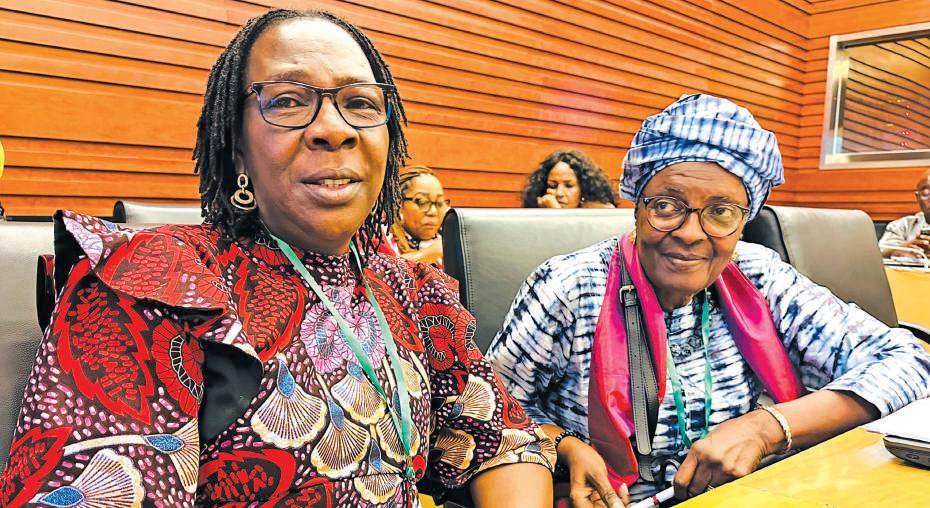
Dr. Martha Muhwezi, Executive Director, FAWE Africa (left) and Hon. Aïcha Bah Diallo Chairperson, FAWE Africa Board (right) at the AU Pan African Conference on Girls and Women’s Education.
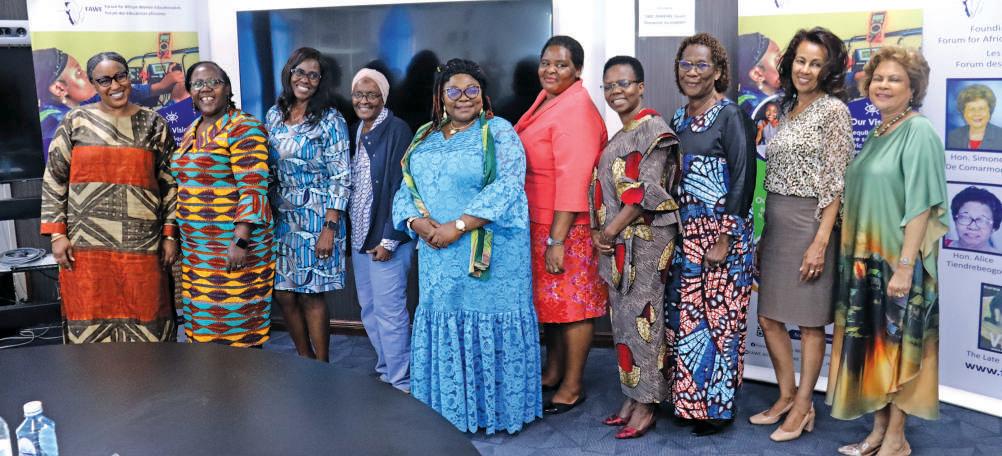
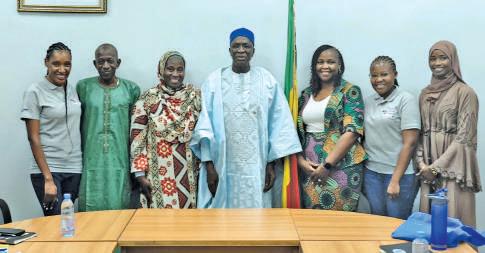
From left, FAWE Finance Officer Ms. Catherine Mwangi, Mr. Moussa Ba, General Secretary of the FAWE Mali Board, Ms. Magnigne Diarra, National Chapter Coordinator FAWE Mali, Dr. Amadou Sy Savané, Minister of Education, Mali, Ms. Teresa Omondi-Adeitan, Deputy Executive Director and Head of Programmes FAWE Africa, Ms. Fraciah Kagu, Advocacy and Partnerships Officer, FAWE Africa and Ms. Fatimata Kane, Programme Officer, FAWE Africa take a photo with the Malian Minister of Education at the ministry offices in Bamako, Mali.
from revising internal policies to expanding membership and strategic planning.
At the regional level, FAWE Africa, in accordance with its Constitution, successfully convened two Board meetings in 2024. The FAWE Africa Board—comprising esteemed educationists and leaders from across the continent—provides critical oversight, strategic guidance, and fiduciary responsibility for the entire network. The Board meetings served as important opportunities to review FAWE’s regional performance, financial sustainability, and policy direction. Key decisions were taken to operationalize the 2024–2028 Strategic Plan, reinforce collaboration across National Chapters, and sharpen FAWE’s advocacy agenda at
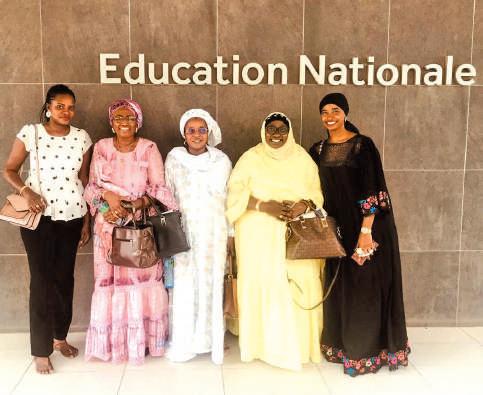
Senegal and FAWE WASRO staff at the education ministry offices in Dakar, Senegal from left, Ms. Ndeye Fatou Diouf, Ms. Ndeye Oumou Ms. Khairy Sall Diouf, Ms. Adama Mbaye and Ms. Fatimata Kane.
the continental level.
Throughout these processes, FAWE’s commitment to inclusive and participatory governance remained clear. General Assemblies and Board meetings are not merely administrative exercises—they are essential spaces where visions are refined, partnerships are strengthened, and collective energy is harnessed to advance education for girls and women across Africa.
In a landscape where governance is often the differentiating factor between vision and sustained impact, FAWE continues to stand as a beacon of how strong, transparent, and values-driven governance can transform lives across generations.
FAWE
FAWE Africa Board members.
Strengthening the FAWE Network: Capacity Building for Impact
In line with FAWE’s Strategic Objective 3—to strengthen institutional capacity and enhance the operational effectiveness of the FAWE network—two pivotal capacitybuilding trainings were held in 2024. These sessions, which took place in Uganda (April 2024) and Saly Senegal in May 2024, brought together FAWE National Chapters to enhance skills, knowledge, and collaboration across the network.
The trainings covered a broad spectrum of topics essential for advancing FAWE’s mission, including fundraising strategies, effective communication, grant management, governance, Advocacy, and the implementation of FAWE’s proven models. These sessions provided National Chapters with the tools to mobilize resources, improve advocacy efforts, and strengthen project implementation for greater impact.
Through peer learning and expert-led sessions, participants deepened their understanding of best practices in organizational growth and sustainability. The trainings also fostered cross-country collaboration, ensuring that FAWE’s advocacy and programmatic interventions remain robust, evidence-based, and responsive to the needs of girls and women in Africa.
By investing in its network, FAWE continues to build a stronger foundation for achieving its vision of a genderequitable and inclusive education system across the continent. These capacity-building initiatives are a testament to FAWE’s commitment to equipping its teams with the knowledge and skills necessary to drive lasting change in education.
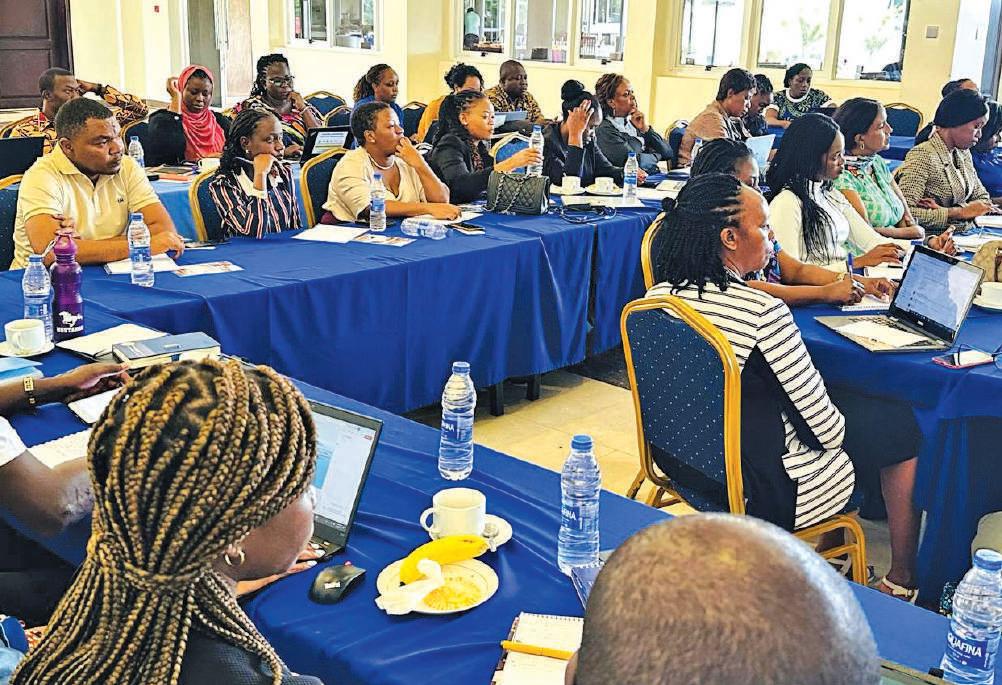
FAWE staff from across Africa at the FAWE/ Mastercard Foundation Phase II Program inception meeting held in Mbale, Uganda.
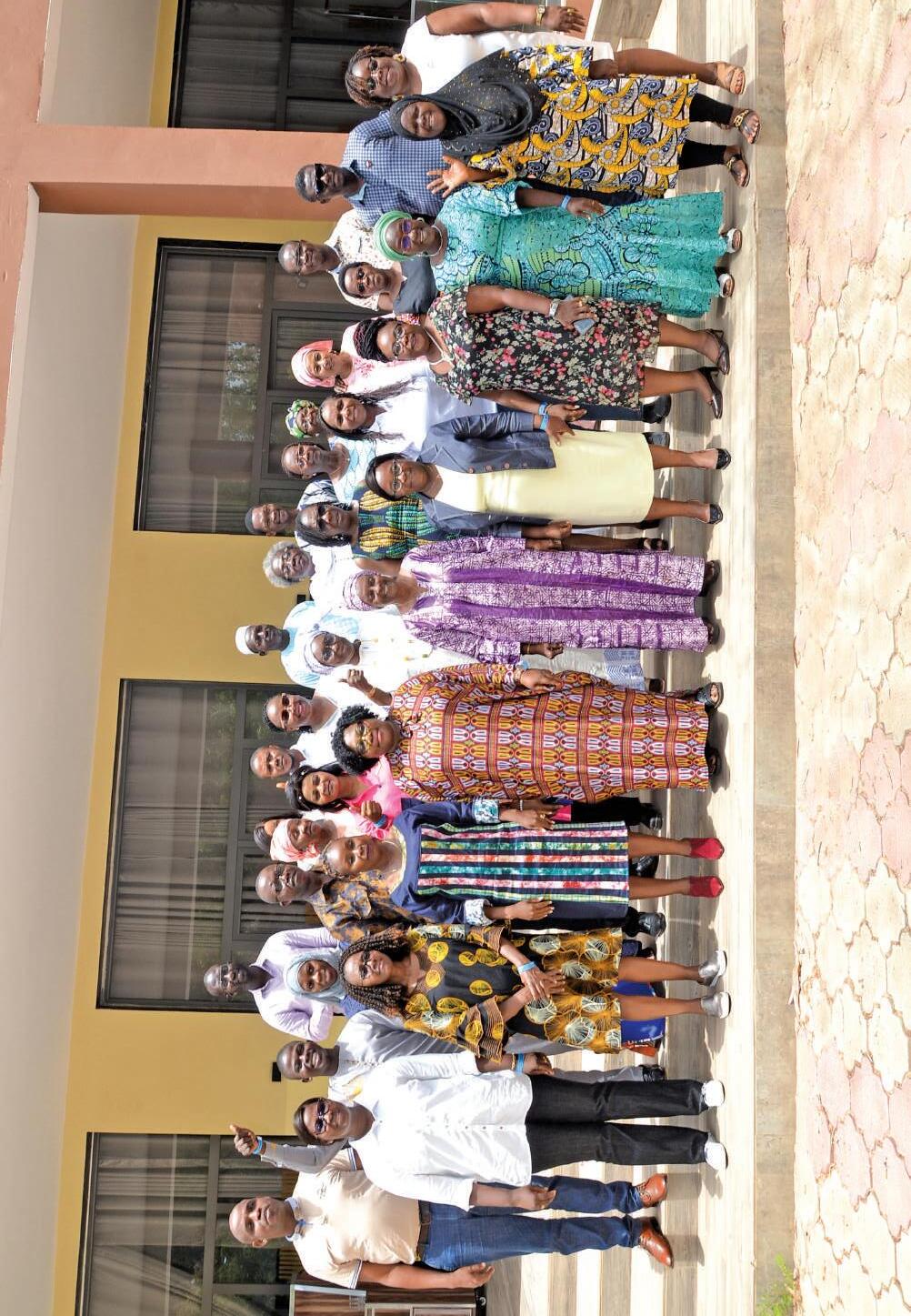
staff from National Chapters, FAWE Africa staff and FAWE Africa Board members at a capacity building meeting held in Saly, Senegal.
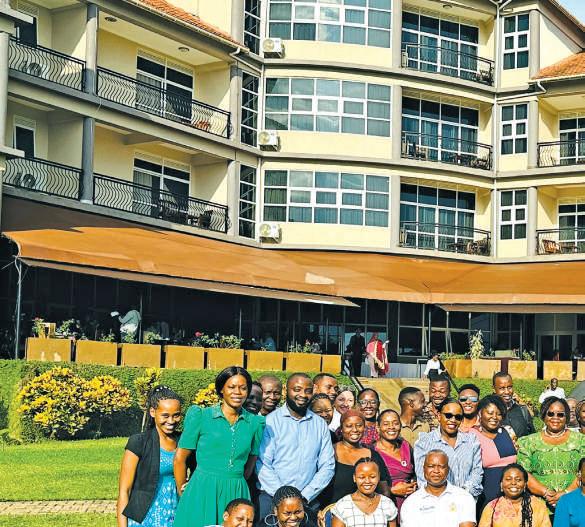
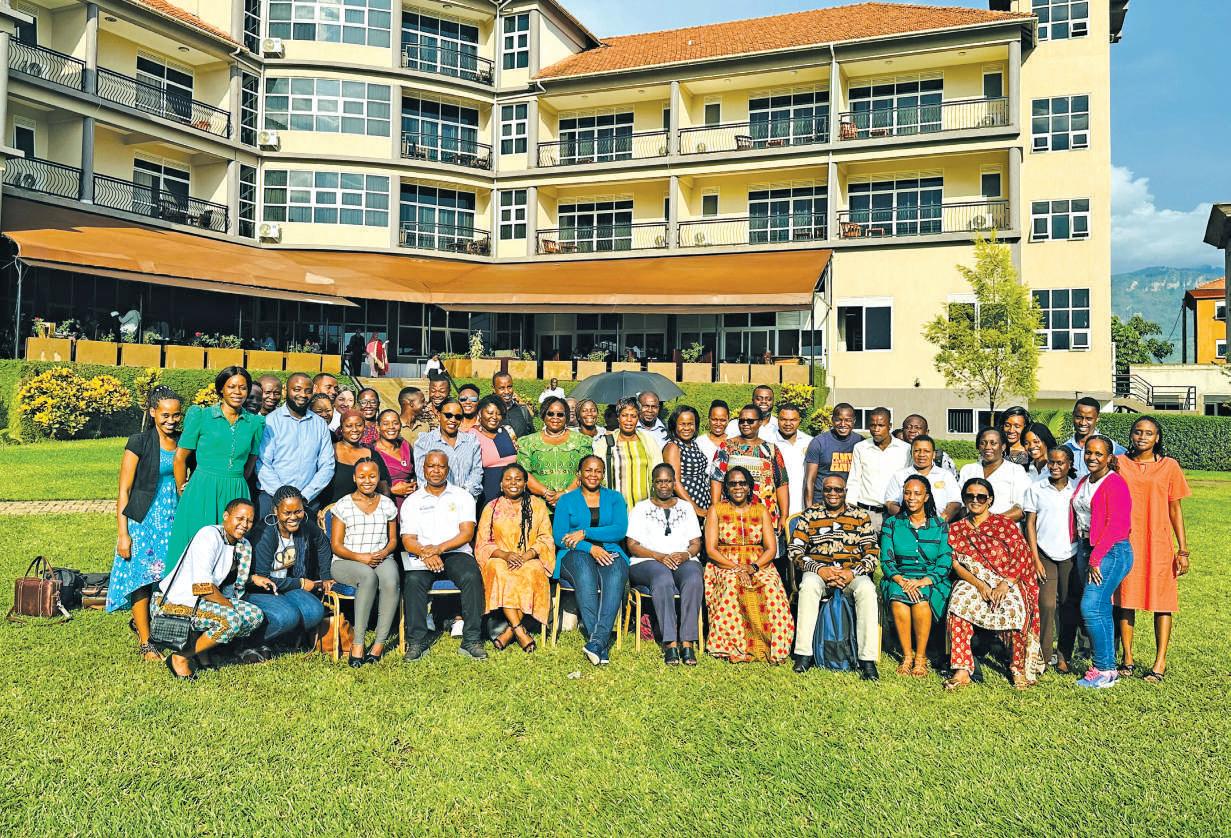
CHAPTER
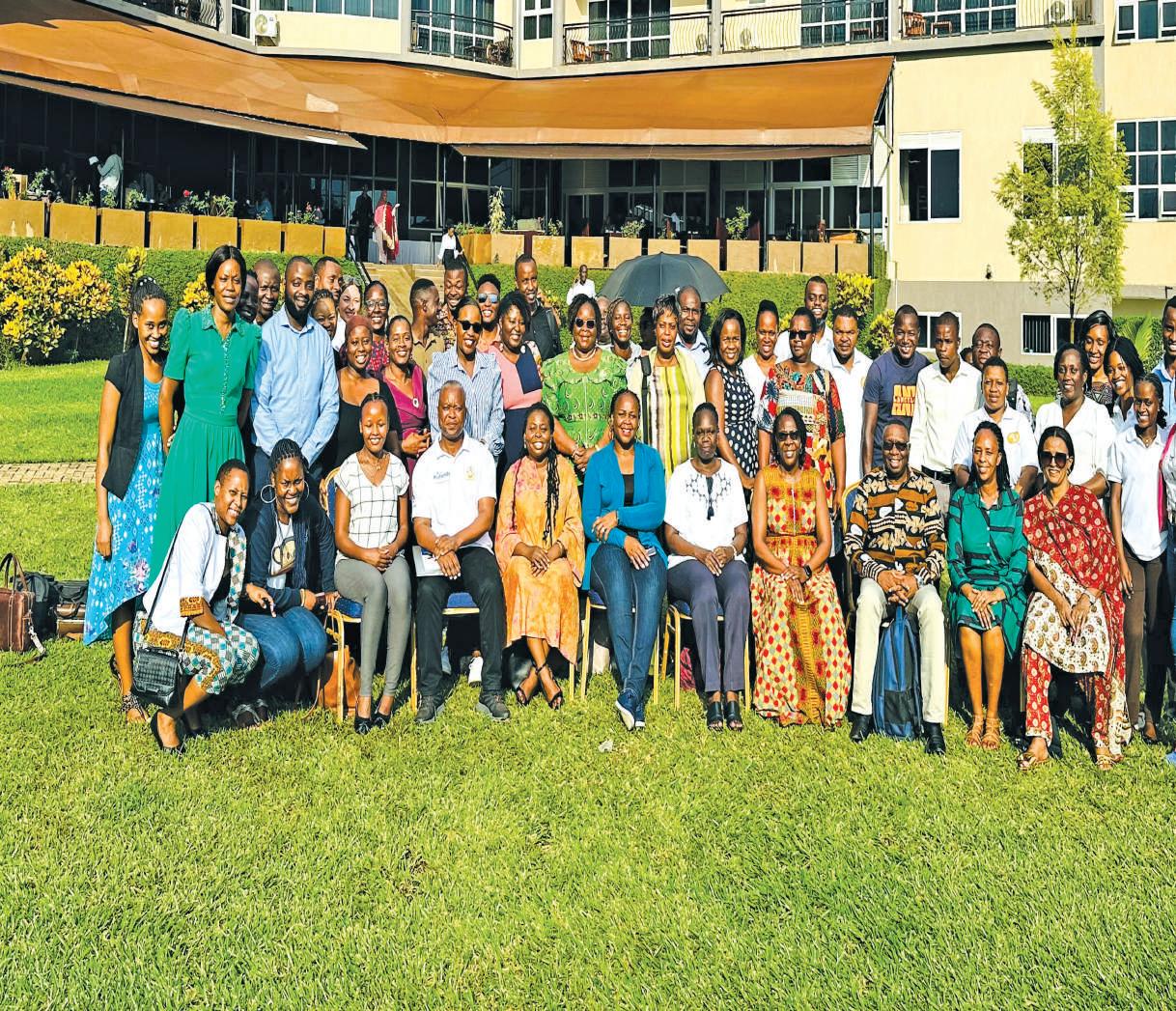
02
Transforming Lives Through Education and Opportunity
FAWE staff from across Africa pose for a group photo at the FAWE/ Mastercard Foundation Phase II Program inception meeting held in Mbale, Uganda.
Creating Second Chances: The FAWE–Mastercard Foundation Phase II Programme
What the Programme Stands For?
Launched in 2024, the FAWE–Mastercard Foundation Phase II Programme, titled Second Chance Pathways for Increased Access to Tertiary Education for Marginalized Young Women and Men, is a transformative seven-year initiative (2024–2030) implemented across 10 African countries: Uganda, Rwanda, Zambia, Malawi, Ghana, Liberia, Tanzania, Zimbabwe, Ethiopia, and Senegal.
The programme targets 10,550 young women and men aged 15–25, with a deliberate focus on reaching marginalized groups, including young people with disabilities and refugees, who represent 10–15% of the target population. It seeks to increase access to tertiary education and relevant skills training, creating viable pathways toward dignified work, entrepreneurship, and lifelong learning.
Anchored in FAWE’s commitment to innovation and equity, the programme aligns with the Mastercard Foundation’s Young Africa Works strategy and its broader Education and Transitions Programming Framework, which envisions 30 million young Africans, especially women, in dignified employment by 2030
2024 Official Launches - Uganda, Ethiopia, Zambia and Malawi
In its foundational year, the programme was launched in Uganda, Ethiopia, Zambia, and Malawi, following a rigorous planning and induction process. These launches were the result of strong coordination and collaboration with local stakeholders, including ministries of education, public institutions, and civil society partners.
A key focus of stakeholder engagement was on addressing systemic barriers to tertiary education—particularly the lack of bridging opportunities that help disadvantaged young people transition from secondary education into higher learning. Building on lessons from Phase I in Uganda, where bridging programmes significantly increased access to university and TVET pathways, FAWE is now scaling this advocacy model to eight additional countries.
Through dialogue with Ministries of Education, National Councils for Higher Education, curriculum accreditation bodies, universities, and TVET institutions, FAWE is laying the groundwork to institutionalize secondchance opportunities. These high-level engagements are essential in creating a policy environment and institutional support systems that enable equitable access to tertiary education.
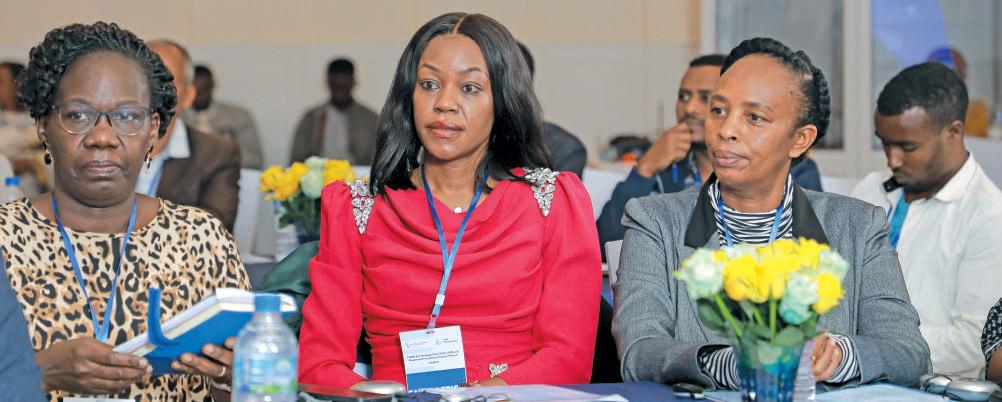
(From left) FAWE Uganda National Chapter Coordinator Ms. Susan Opok-Tumusiime, FAWE Zimbabwe Executive Director Ms. Lydia Madyirapanzi (center) and FAWE Rwanda National Chapter Coordinator Ms. Antonia Mutoro (right) at the launch of the FAWE/ Mastercard Foundation Phase II Program in Ethiopia.
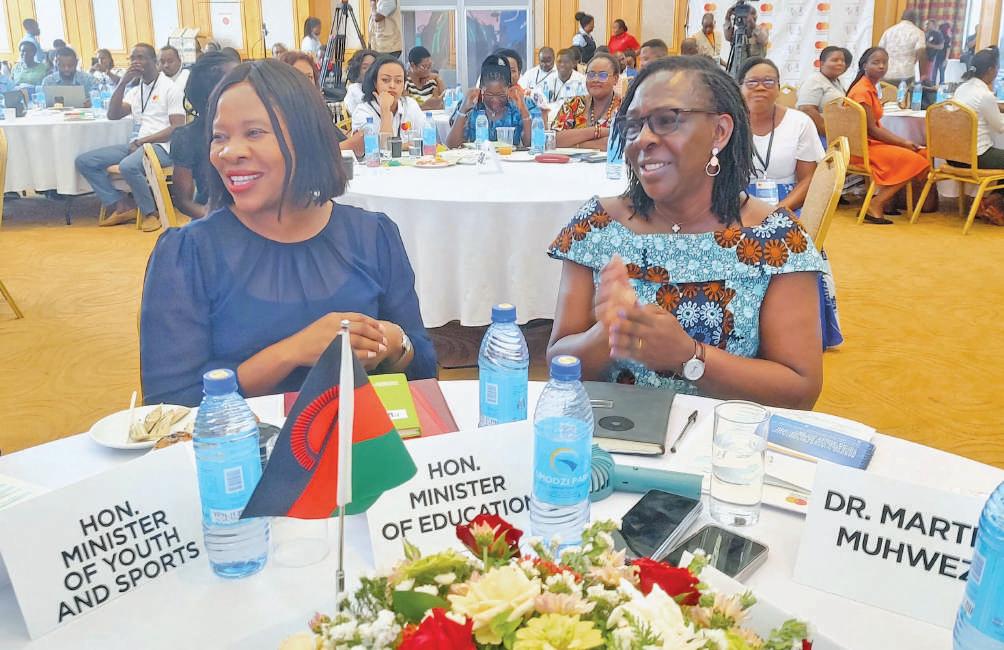
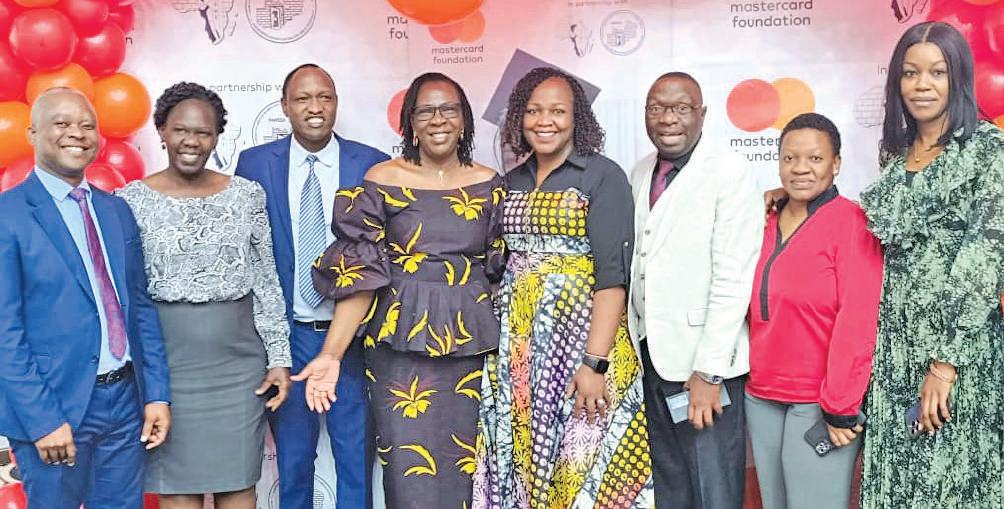
(Left) Malawi Minister of Education Honorable Madalitso Kambauwa Wirima and FAWE Executive Director Dr. Martha Muhwezi at the launch of the FAWE/ Mastercard Foundation Phase II Program in Malawi.
(Left) Mr. Wesley Chabwera FAWE Malawi National Chapter Coordinator, FAWE Uganda National Chapter Coordinator Ms. Susan Opok-Tumusiime, Mr. Richard Chelagat Finance and Administration Director at FAWE Africa, Dr. Martha Muhwezi, Executive Director, FAWE Africa, Ms. Teresa Omondi-Adeitan, Deputy Executive Director and Head of Programmes FAWE Africa, Mr. Costern Kanchele, Executive Director, FAWE Zambia, Ms. Mary Mwakawago, Programme Manager FAWE Tanzania and FAWE Zimbabwe Executive Director Ms. Lydia Madyirapanzi at the launch of the FAWE/ Mastercard Foundation Phase II Program in Zambia.
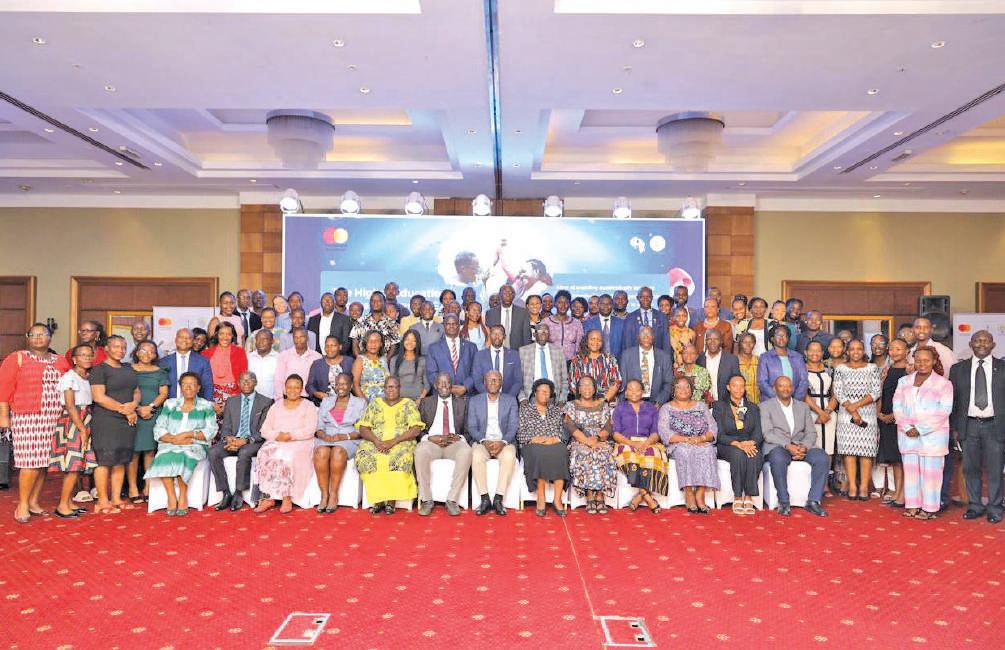
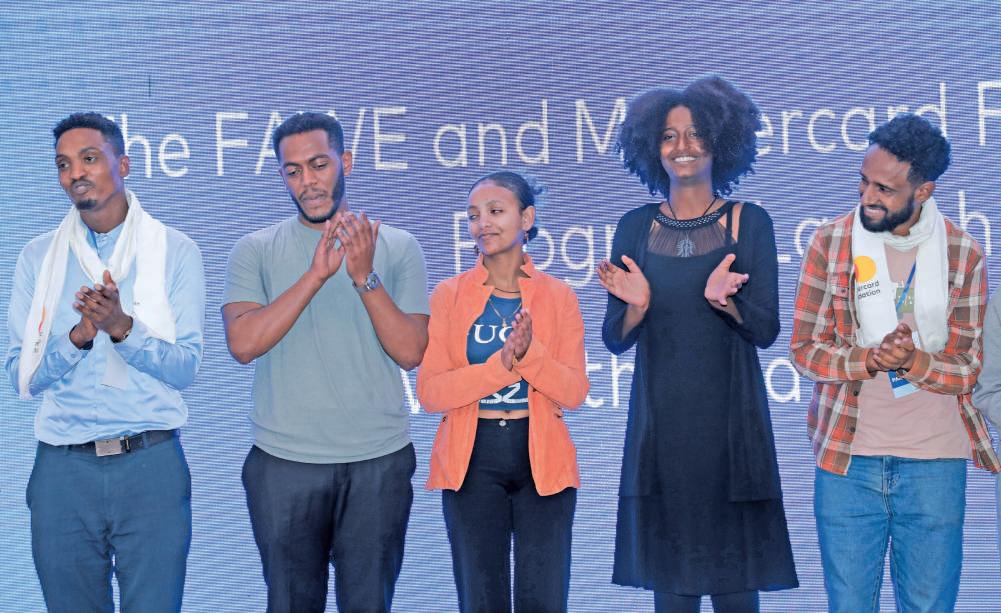
Participants of the launch of the FAWE/ Mastercard Foundation Phase II Program in Uganda pose for a group photo.
FAWE alumni namely (from left) Abayneh Abule, Abdurahman Mohammed, Maria Andualem, Kasech Dires, Fitsum Wendesen at the launch of the FAWE/ Mastercard Foundation Phase II Program in Ethiopia.
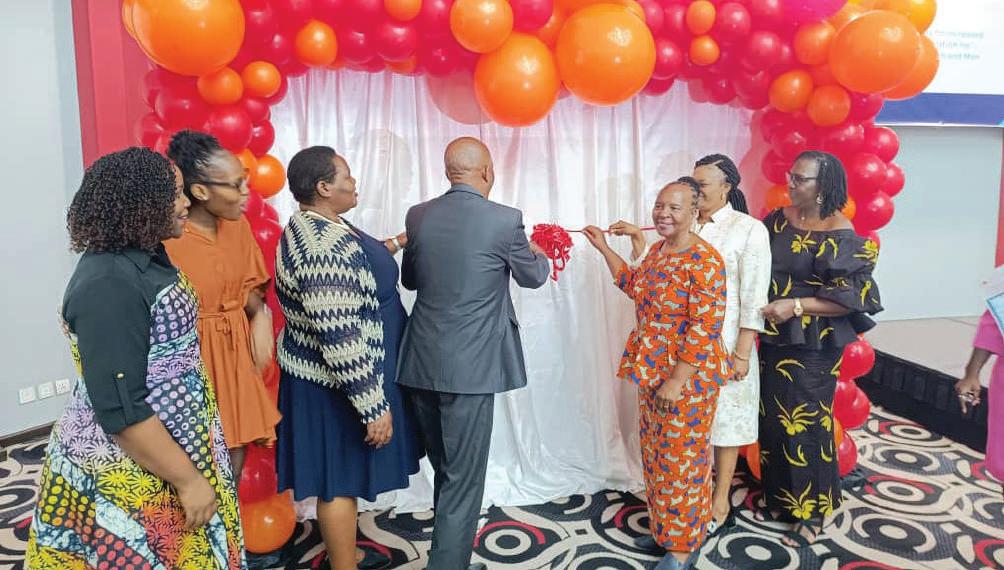
Minister of Education in Zambia, Hon. Douglas Syakalima cuts a ceremonial ribbon to signify the launch of the FAWE Zambia Strategic Plan (2024-2028) in Zambia. Looking on are Prof. Enala Tembo Mwase, Board Chairperson FAWE Zambia Board, FAWE Executive Director, Dr. Martha Muhwezi, (left) Dr. Maggie Madimbo, FAWE Africa Board Member, Ms. Chiemelie Umenyiora, Lead, Public Affairs & Communications at the Mastercard Foundation, and Ms. Teresa Omondi-Adeitan, Deputy Executive Director and Head of Programmes FAWE Africa.
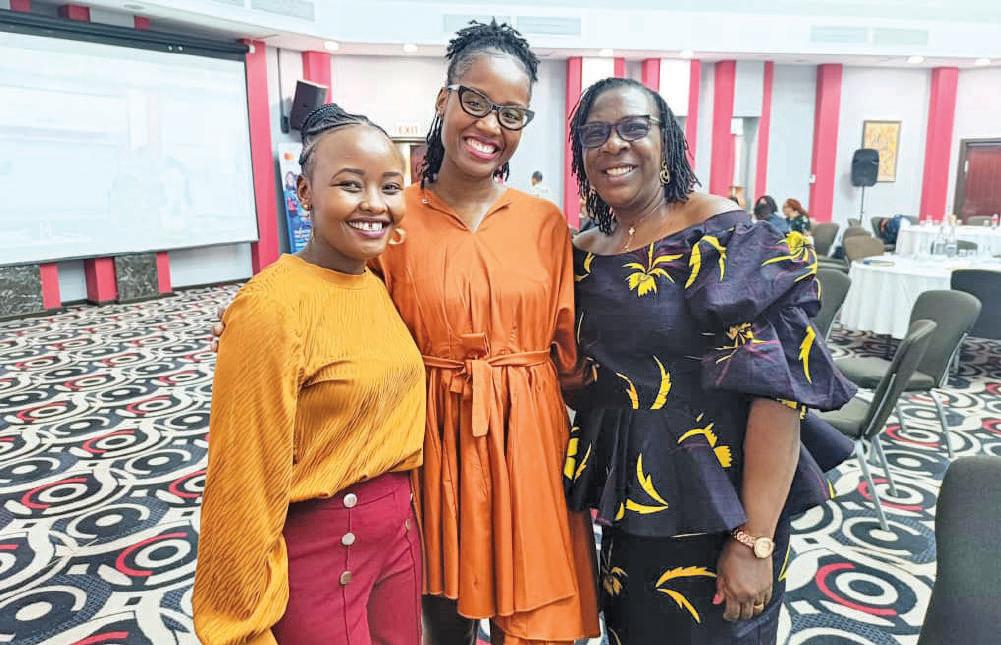
(From left) FAWE Programme Officer Ms. Naomi Kamitha, Ms. Chiemelie Umenyiora, Lead, Public Affairs & Communications at the Mastercard Foundation and FAWE Executive Director, Dr. Martha Muhwezi.
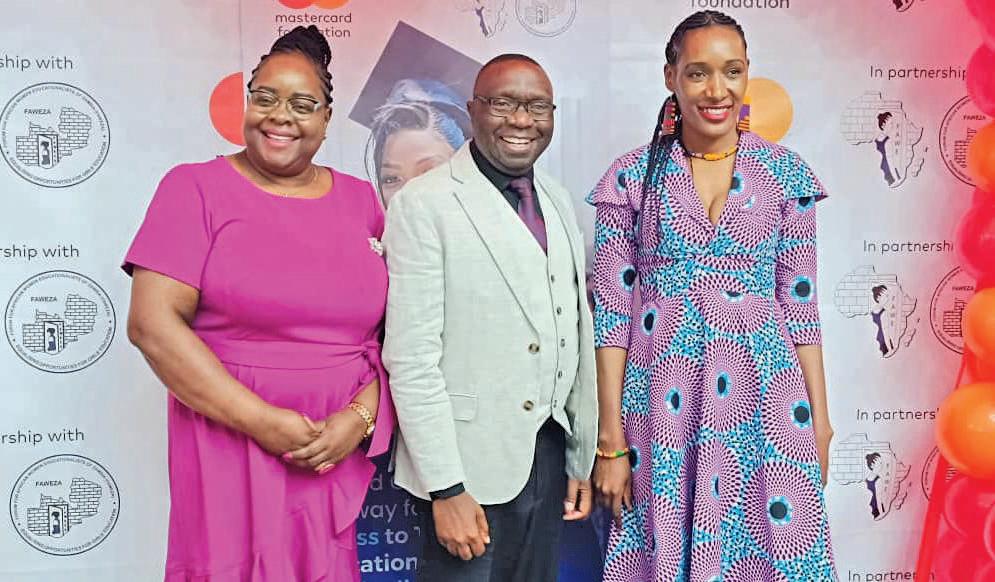
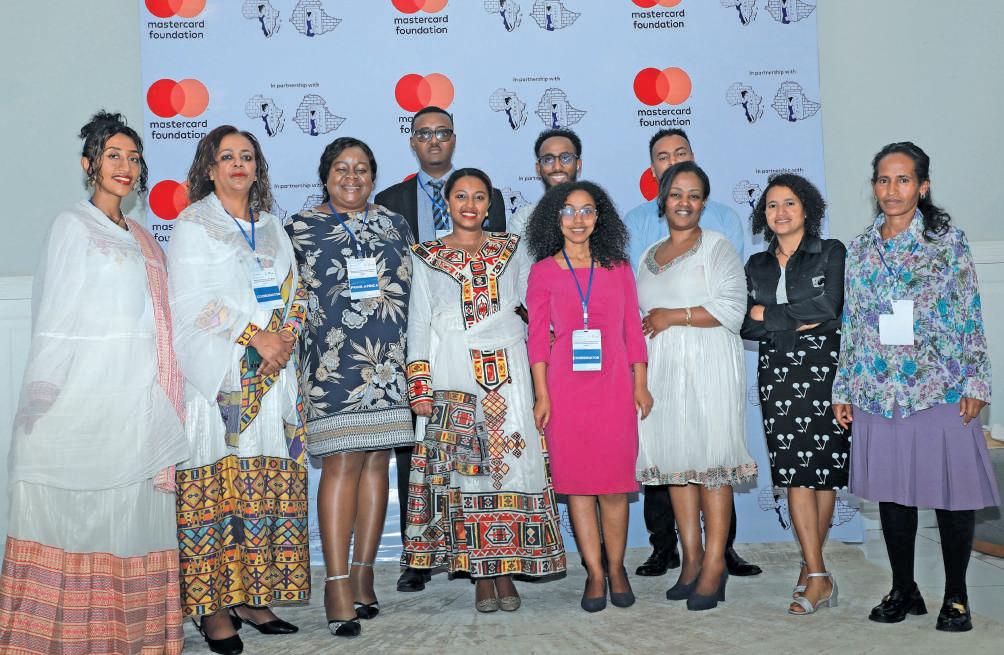
(From left) FAWE Senior Programme Officer Ms. Emily Gumba, FAWE Zambia Executive Director Mr. Costern Kanchele and FAWE Africa Finance Officer Ms. Catherine Mwangi.
FAWE Senior Programme Officer Ms. Emily Gumba (3rd left) takes a photo with FAWE Ethiopia staff.
Enrolment of Young women and Men from Disadvantaged Communities
By the end of 2024, the programme set out to enrol 1,100 participants across the four launch countries—and nearly achieved this with 1,092 enrolled (789 females and 303 males), demonstrating strong momentum from inception.
Uganda: 500 students enrolled
Ethiopia: 192 students enrolled
Zambia: 200 students enrolled
Malawi: 200 students enrolled
This success is attributed to effective mobilisation and awareness campaigns that generated strong community buy-in and encouraged young people—especially girls—to seize the opportunity for a second chance at education and improved livelihoods.
A Strategic Milestone—Partnership Launch at UNGA Side Event
The programme was officially launched on the global stage during the Powering Parity: Inclusive Education for a Sustainable Future event, held on the sidelines of the 78th United Nations General Assembly in New York. Hosted by the Mastercard Foundation, the convening brought together ministries of education, development partners, civil society, and multilateral agencies to build alignment on accelerating inclusive education for Africa’s youth.
At the heart of this convening was the signing of
the Phase II partnership between FAWE and the Mastercard Foundation—a reaffirmation of their joint vision for educational equity and genderresponsive learning.
This second phase builds on the legacy of Phase I, which expanded access to quality education for thousands of girls across Africa. With a broader scope and deeper inclusion of marginalized populations, Phase II represents an even greater commitment to transforming education systems and ensuring that no young person is left behind.
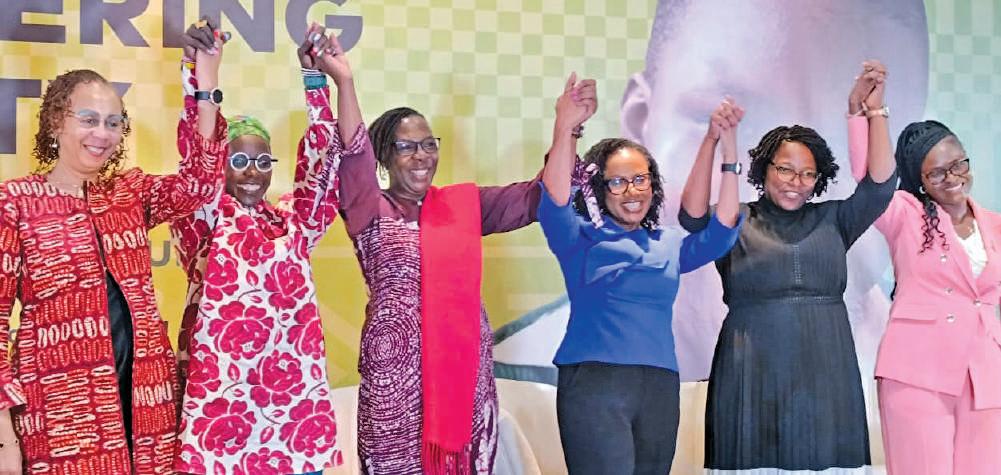
FAWE Executive Director, Dr. Martha Muhwezi (3rd left) joins key partners and stakeholders in a show of solidarity at a side event by the Mastercard Foundation held at the margins of the United Nations General Assembly in New York, USA.
The FAWE/Mastercard Foundation Scholars Program: A Beacon of Hope for Young Women and Men
FAWE in Partnership with the Mastercard Foundation has been providing academically talented yet financially disadvantaged young people, particularly from Africa, with access to quality and relevant secondary and university education. Students selected for the Program receive a holistic set of financial, social, and academic supports throughout their education and during their post-graduate transitions. The Program consists of a global network of education institutions and non-profit organizations. In Ethiopia, the program has reached a total of 800 young women and men (600 girls and 200 boys) while in Rwanda, the program has supported 1200 young women to get quality education throughout secondary school and university.
600
200
1,200
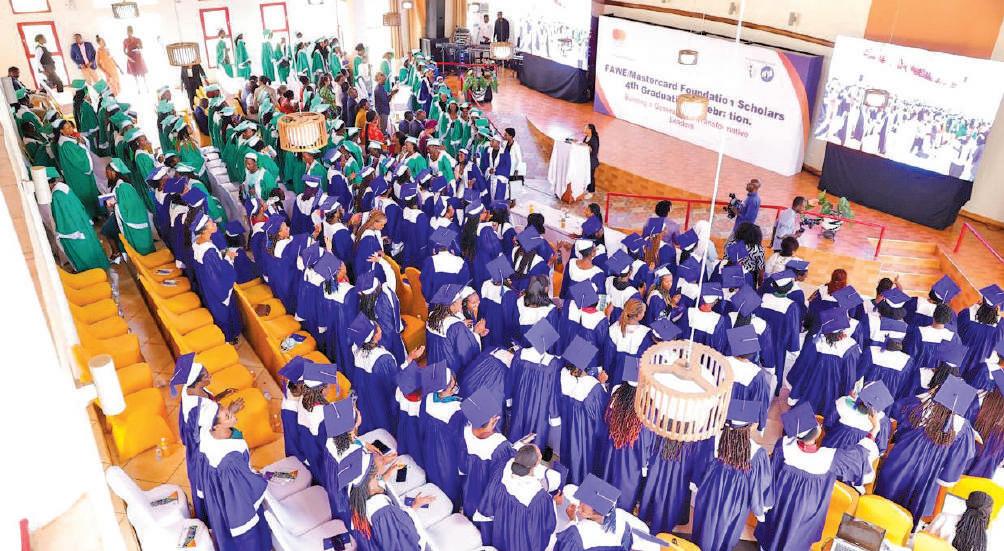
272 FAWE/Mastercard Foundation Scholars Graduate in Rwanda
On 27th September 2024, FAWE Rwanda hosted a heartwarming ceremony to celebrate the graduation and the success of 272 young women who were part of the scholarship program, made possible through a partnership with FAWE Africa and the Mastercard Foundation. These scholars have graduated from the
University of Rwanda and INES Ruhengeri, marking a significant milestone in their academic and personal journeys.
The graduation was honored by the presence of distinguished partners from Ministries, development
Young women in Ethiopia reached by FAWE/ Mastercard Foundation Scholars Program
Young men in Ethiopia reached by FAWE/ Mastercard Foundation Scholars Program
Young women supported by the program to get quality education throughout secondary school and university in Rwanda.
FAWE/Mastercard Foundation Scholars Program participants at their graduation ceremony in Kigali, Rwanda.
partners, public sector, FAWE members and FAWE Alumni, all of whom had come together to celebrate this great milestone. The event was filled with joy and pride, as these young women not only completed their education but also developed crucial skills that will guide them in the future. Thanks to the support from the Mastercard Foundation. This comprehensive scholarship includes tuition, stipend, mentorship, career guidance, leadership training, entrepreneurship skills, and business development support. These resources have prepared the graduates to confidently step into the next phase of their lives, whether they are entering the workforce or pursuing further studies. This graduation celebration not only highlighted the individual achievements of these scholars but also showcased the impact that comprehensive support can have on shaping successful futures for young women in Rwanda.
During this ceremony, FAWE Rwanda awarded the staff that have worked a long and tough journey with the scholars for a period of 10 years since they joined the program. They have worked tirelessly and contributed to the success of these scholars. These people who are not only staff of FAWE Rwanda have worked and are still working so hard to make sure that these scholars get all the support they need and they are physically and psychologically doing well , they follow them up day and night regardless of the time to make sure that there is nothing that will stop the scholar to perform well in school and that is why the scholars call them Aunties and Uncles. Also the scholars who are best performers, who have been great leaders in various ways were awarded.
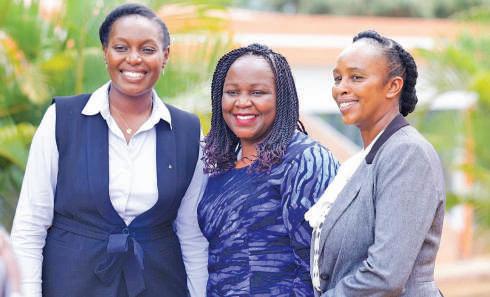
Hon. Claudette Irere, Minister of State for Education, Rwanda, Ms. Teresa Omondi-Adeitan, Deputy Executive Director and Head of Programmes FAWE Africa and FAWE Rwanda National Chapter Coordinator Ms. Antonia Mutoro at the FAWE/Mastercard Foundation Scholars Program graduation ceremony in Kigali, Rwanda.
704
Young women have graduated through this partnership, with over 75% successfully transitioning into dignified employment and 29% among them continuing with higher education to date.
To date, 704 young women have graduated through this partnership, with over 75% successfully transitioning into dignified employment and 29% among them continuing with higher education. This achievement is a testament to the power of education and the commitment of organizations like FAWE and the Mastercard Foundation to uplift young women and help them achieve their dreams.
The closing Keynote was delivered by the State Minister for Education Hon. Irere Claudette praised FAWE Rwanda for its vital contribution to Rwanda and Africa’s future. She reminded graduates that graduation brings great responsibility and urged them to continue striving for excellence, as they are key to driving progress.

Ms. Teta Kayitaba, Board Member, Fawe Rwanda,(far right), Mr. Daniel Mundeva Lead, Scholars Program Network at Mastercard Foundation together with FAWE Rwanda staff at the FAWE/Mastercard Foundation Scholars Program graduation ceremony in Kigali, Rwanda.
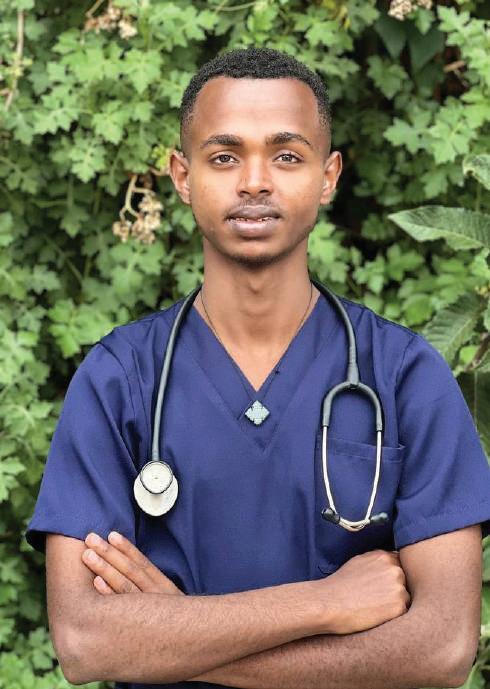
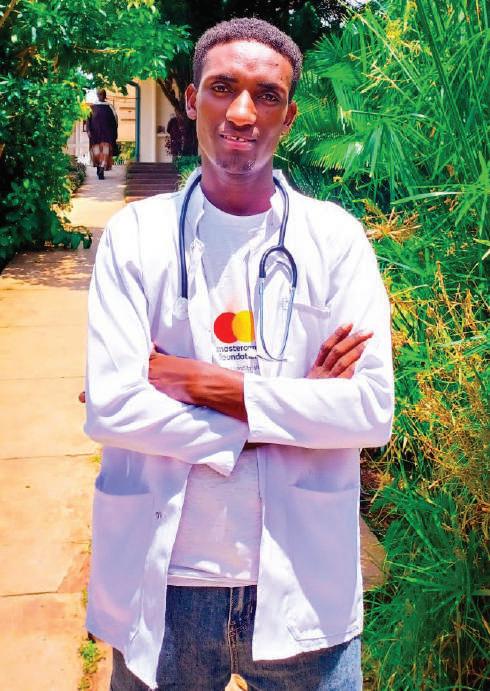
3 Ethiopian Scholars Get Another Chance at Education
In nearby Ethiopia, FAWE-Ethiopia received an urgent call for support through its alumni network—three medical students faced the heartbreaking risk of dropping out due to financial hardship. One had already left medical school. Understanding the gravity of the situation, FAWE Ethiopia quickly sprung into action. Through their intervention, two students—Wontesha Woma and Tsedeke Wondesen—received non-tuition support, including a monthly stipend, medical expenses, educational materials, sanitary supplies, and clothing, ensuring they could continue their studies uninterrupted. Meanwhile, the third student, Habtamu Abebe, who had already dropped out, was assisted with tuition to pursue Business Management until he later transitioned to the National Air Force College, where his expenses were fully covered by the government.
Today, Wontesha and Tsedeke continue their journey to becoming doctors, while Habtamu pursues a new path with confidence. Their success stories stand as a testament to the power of timely intervention and the unwavering dedication to shaping future professionals.
Today, Wontesha and Tsedeke continue their journey to becoming doctors, while Habtamu pursues a new path with confidence. Their success stories stand as a testament to the power of timely intervention and the unwavering dedication to shaping future professionals.
Tsedeke Wondesen, FAWE/Mastercard Foundation Scholars Alumni.
Wontesha Woma, FAWE/Mastercard Foundation Scholars Alumni.
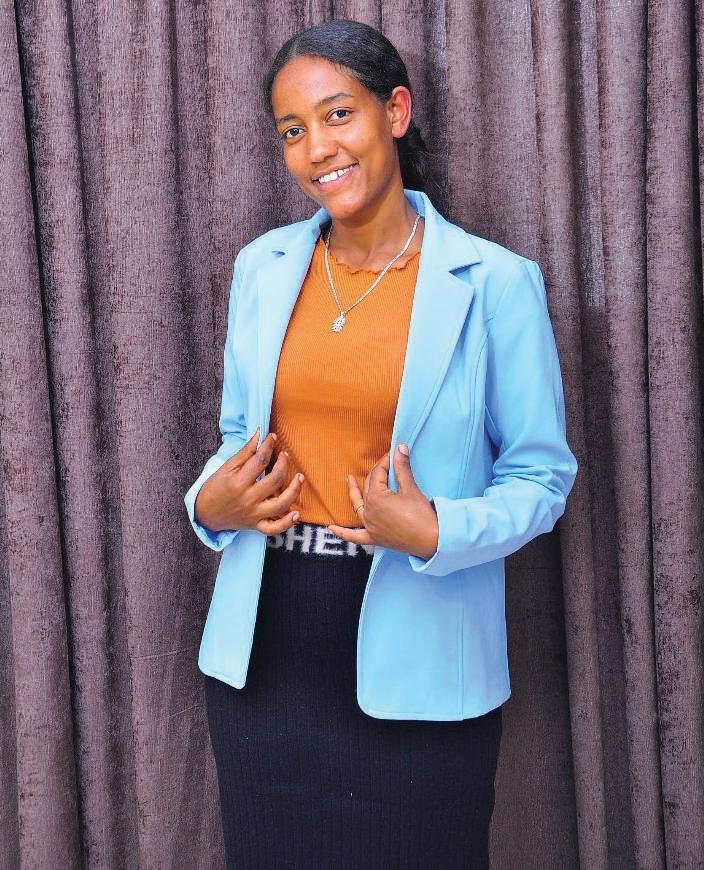
Sindu Yitna, FAWE/ Mastercard Foundation Scholars Alumni.
From a Small Village to Empowering Unity at Woldia University – Sindu Yitna’s Story
Sindu Yitna, a tenacious young woman hailing from a humble village, has transformed challenges into an inspirational odyssey that echoes through generations. Raised by her dedicated mother following her father’s demise, Sindu’s pursuit of education serves as a beacon of resilience. Overcoming financial constraints, Sindhu’s academic prowess led her to FAWE in 2014, where she found invaluable support such as career guidance and counselling, mentors service, language training, and empowerment.
Fueled by her passion for learning and a determination to surmount obstacles in her village, Sindu relocated to Adama City where she lived at her aunt’s house. Her academic journey continued at Woldia University in 2010 E.C., marking a pivotal chapter in Sindu’s quest for knowledge and personal development.
Throughout her narrative, Sindu’s unwavering determination and commitment to education stand as a testament to the transformative power of resilience and the pursuit of one’s aspirations.
While at Woldia University, Sindu and Rahel Tekalign, former FAWE scholars, embarked on a mission to unite students across societal divisions. Their vision materialized in the Ethiopianisim club, a symbol of unity celebrating Ethiopia’s rich history.
Sindu Yitna, a tenacious young woman hailing from a humble village, has transformed challenges into an inspirational odyssey that echoes through generations.
The Ethiopianism Club, born out of their vision, aimed to transcend ethnic divisions and foster problem-solving skills among students The association was a bastion for unity, organizing celebrations and contributing to the cultural and literary landscape. Their programs ranged from exploring historical literature and hosting panel discussions to organizing charity events that uplifted street children and the impoverished. Sindhu’s leadership acumen and unwavering dedication set her apart, earning recognition within and beyond the university walls. Her involvement in cultural programs, poetic expressions, and commitment to charitable endeavors became emblematic of her character. Seeking to expand her impact, Sindu immersed herself in online program management training, a testament to her resilience and determination.
Lifting High the Kenyan Girl: The Imarisha Msichana Project
Teenage pregnancy remains a significant challenge in Kenya, particularly in the wake of the COVID-19 pandemic. To address this, FAWE Kenya, in partnership with the Mastercard Foundation, is implementing the Imarisha Msichana Project across 20 counties, including Migori, Homa Bay, Siaya, Busia, Nairobi, Machakos, Kiambu, and beyond. This initiative is transforming the lives of thousands of girls by raising awareness on human sexuality education, promoting the reacceptance of teenage mothers in schools, and enhancing digital literacy for learners.
One of the key strategies driving this change is Tuseme— FAWE’s empowerment model that encourages girls and boys to speak out against barriers to education. In response to the digital age, FAWE has digitized the Tuseme model, expanding its reach and impact. The pilot phase in Kenya has reached 160 schools, trained 8,000 learners in digital literacy and online safety, and enrolled over 15,000 students in the Tuseme App for online training.
The project has enabled over 5,000 teenage mothers to return to school, reclaiming their right to education and future. Notably, 153 of these girls have received full scholarships, covering more than just tuition and ensuring holistic support.
The Imarisha Msichana Project has also strengthened multi-sectoral collaboration, engaging stakeholders in all 20 counties to reinforce referral systems and promote Sexual and Reproductive Health and Rights (SRHR).
A major milestone was the launch of the Situational Analysis Report on Teen Pregnancies, which brought
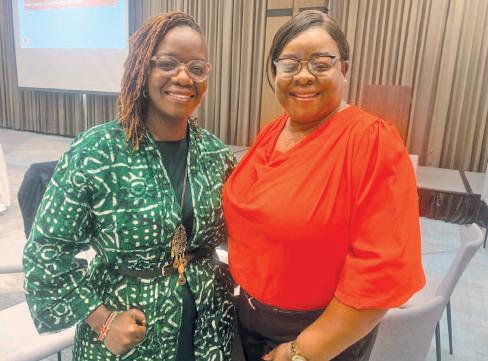
together stakeholders, including government officials and development partners, to inform policy and action.
In a further effort to sustain impact, the project has rolled out a media engagement and awards component, training journalists on gender-responsive reporting and recognizing those who have excelled in highlighting girls’ education and gender issues.
Looking ahead, the Tuseme App, currently piloted in Kenya, is set for a continental rollout, ensuring that thousands more young people across Africa gain access to this transformative digital platform. Below are stories of change as a result of the Programme.
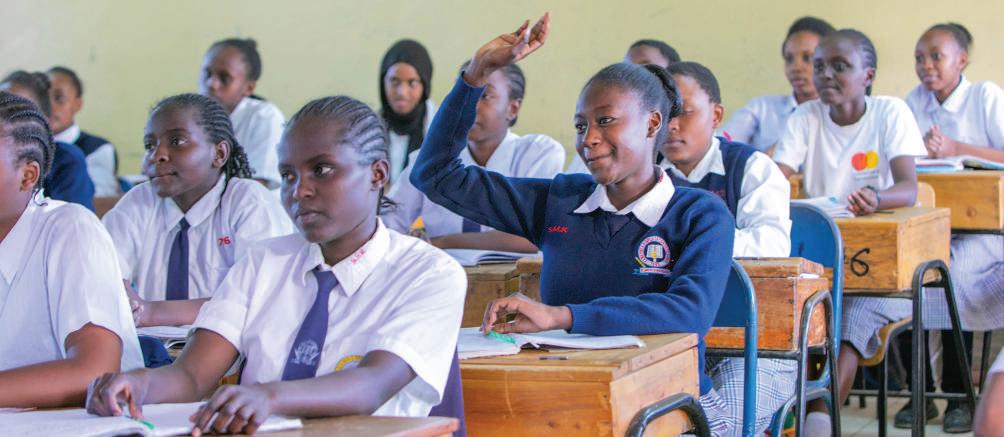
Ms. Ruth Oloo, Program Lead, Gender at Mastercard Foundation with FAWE Senior Programme Officer Ms. Emily Gumba at the launch of the Imarisha Msichana Situational Analysis report on Teenage Pregnancy in Kenya and Media Awards in Nairobi, Kenya.
Mary’s Triumph Amidst Great Odds
Meet Mary Wanjiru Mbugua, from Murungaru town in Kinangop, Nyandarua County, whose story is like no other. Mary was just a teenager when she fell pregnant in 2020. She lost all hope in ever realizing her dream of completing her education when she was forced to drop out of school as her parents could not support her and her child.
In June 2022, her life took a turn for the better when she enrolled back in school. She joined the Tuseme club where she was mentored and supported to cope with her unique situation as a teen student mother; a fact that saw her teased and taunted by her schoolmates. She was able to gain hope and confidence, and finally rose to serve in TUSEME Club, as the chairperson where she championed for protection of girls from abuse and teenage pregnancies and involvement of girls in STEM education and promoted environmental conservation with the support of the Green Belt Movement. She was also elected to serve as the Head girl in school, inspiring other girls to be leaders.
In 2024, Mary sat for her KCSE examinations at Murungaru Secondary School and she score an overall grade of B (PLAIN). This stellar performance will see her secure a spot in one of Kenya’s universities in the ongoing placements. She is planning to pursue a Bachelor of Science Degree in Nursing, as well be a role model to girls that despite past situations, one is
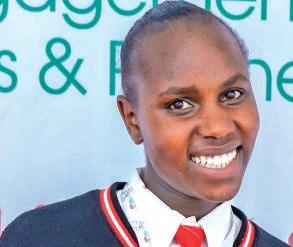

Mary Mbugua, a participant of the Imarisha Msichana Program.
not limited to achieving their goals. With the support of organizations like FAWE, she intends to be a mentor to support teen mothers re-enroll back to school and revive their dreams. The school management has offered her an opportunity where she is currently serving as a mentor to her peers.
In her own words, Mary says,
I would like to thank FAWE for their input towards girls’ and women empowerment. All the good that you do will continue to transform the girl child and society in general. It is my belief that FAWE is like an oasis in a desert to many girls. You have extended hope to those of us who only saw darkness in our paths. I personally thank you wholeheartedly for allowing me to be part of your story. The journey to the Gender is My Agenda Campaign Conference, Ghana to represent FAWE in the launch of FAWE’s School Related Gender Based Violence (SRGBV) Manual in July 2024 was the apex of any schoolgirl’s dream. Continue to hold the light for others. God bless you monumentally. Thank you.” Mary Wanjiru Mbugua
As students face life’s challenges, it is noticeable that life’s ebbs and flows present uniqueness in its course. Tuseme clubs are not only for teenage mothers who have secured
a second chance at education through re-entry back to school. Sharlyne’s story below shows how Tuseme has been a blessing in the most unexpected ways.
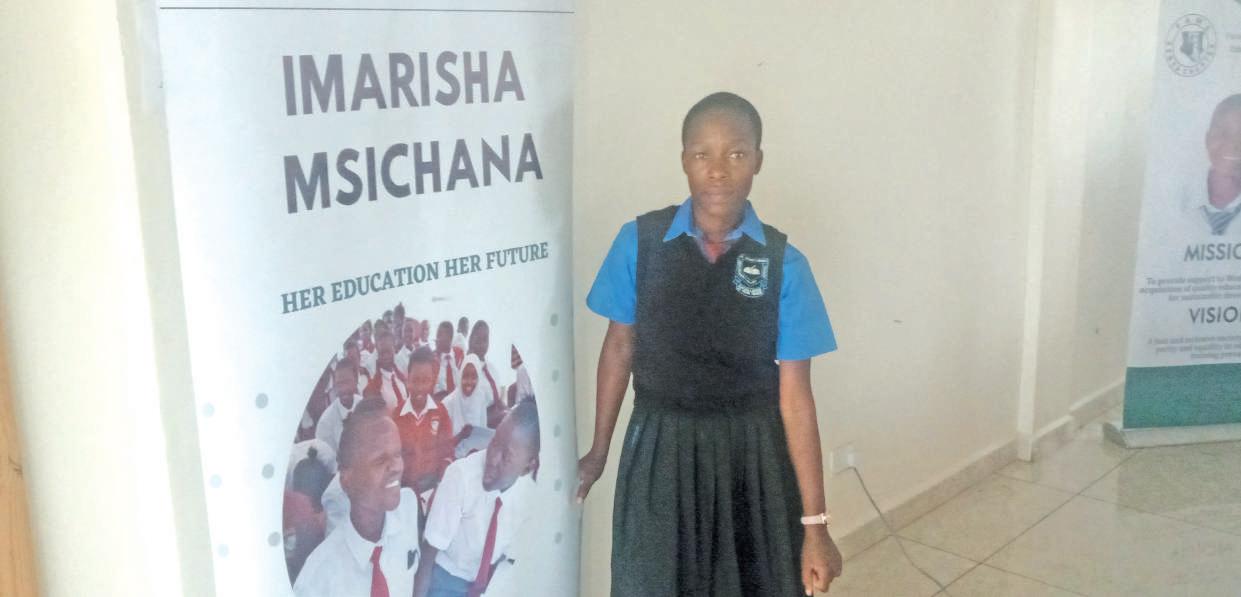
Sharlyne Achieng’, a participant of the Imarisha Msichana Program.
Sharlyne Achieng’s Best Gain from Tuseme Clubs
Sharlyne Achieng’ hails from Bungoma County. Her hope to continue with her education was shattered when her mother passed away in 2020 during the December holidays. She scored 313 marks when the KCPE results were released a few days later. Her maternal aunt took her in however, instead of taking her to school, she did her work as a bar maid in a local bar where she was arrested for working as an underage worker. Sharlyne ran away after being released to stay with her maternal uncle who took her to secondary school. This was unfortunately short lived as she had to momentarily drop out due to internal family matters. Sharlyne then found a well-wisher who took her back to school where she joined Tuseme Club.
Together with other members, Sharlyne Achieng got deeply involved in the activities of the club. Members began speaking out about the challenges that were affecting them and with specialized guidance from patrons, they started to share experiences that included academic and social hindrances to their development. It was at this point that Sharlyne shared her challenges with the patrons of the club. She had been rescued by a well-wisher who, however, could not pay for her school fees. Through the club, she managed to get another well-wisher who supported her with school fees.
Soon, Sharlyne’s social and academic life began changing positively. With a surety of accommodation and fee payment, she started improving in her academic work. Socially, she gained the confidence to say NO to socio-cultural activities that undermine the well-
being and the development of a girl child. Through her active participation, she represented the club in various forums organized by FAWE in the county due.
Before joining Tuseme Club, her performance was at D+ and below but she began to improve. Her behaviour was exemplary in school which enabled her to guide other learners in school. Sharlyne sat for KCSE in 2024 and scored a C+ grade, qualifying for direct entry to university. She desires to have a career in the health sector.
When interviewed at the Imarisha Msichana review meeting, Sharlyne said,
Tuseme club is a blessing to me, I never had the courage to stand in front of people and address them, but through Tuseme and the teachings in the club, I gained courage to talk about issues affecting me, I didn’t have a place to stay but through Tuseme I was able to get a well-wisher to support me with school fees and a place to call home.”, Sharlyne when she was sharing her story during the IMP review meeting in Bungoma in 2024. Sharlyne Achieng
Mary and Sharlyne’s stories are some of the many positive stories thatd emerge from the installation of Tuseme Clubs in schools in Kenya. Each student who joins the club has a unique positive story to tell about the club’s impact in their lives and the lives of those close to them. Tuseme Clubs is the gift that keeps on giving.
Promoting Gender Responsive Best Practices in Journalism
Media is an essential part of communication as we know it today. Media plays a critical role in informing, persuading, and changing the culture of the public on various topical issues. It has been at the forefront of the fight against teenage pregnancy and child marriage in the African continent, especially in Kenya. However, human beings do not exist in a vacuum as they are products of their societies and environments. It is therefore likely that even as journalists write stories on topics such as teenage pregnancy and child marriage, personal biases and stereotypes may crop up. It is for this reason that FAWE through FAWE Kenya organized a training of 60 Journalists on Gender Responsive Reporting and Writing. Drawn from the 20 counties that the Imarisha Msichana Programme is implemented, this activity was aimed at equipping reporters with the necessary skills to cover gender specific stories in a responsible and dignifying manner.
The participants were representatives of journalists working in print, broadcast, and social media from various local and international media houses and freelance journalists.
In an effort to recognize and promote excellence in gender-responsive reporting, FAWE organized a Media Awards event to celebrate trained journalists who demonstrated outstanding commitment and excellence to highlighting gender issues through their stories. The event was a culmination of efforts to encourage inclusive reporting that amplifies the voices of marginalized groups and promotes gender equity. A total of 45 stories were submitted by journalists from counties where our projects are being implemented, showcasing a rich diversity of narratives and impactful reporting. An independent panel of judges, comprising experienced journalists from the media council of Kenya and the Association of Media Women in Kenya (AMWIK) reviewed the submissions. The evaluation criteria focused on:
Relevance and impact of the story
Depth of research and factual accuracy
Innovative storytelling approaches
Ethical reporting and sensitivity to gender issues
Nancy Kering, a Broadcast journalist reporting for Citizen TV emerged as the winner. Her winning story highlighted the ply of girls who get married before the age of 18 years shortly after undergoing Female Genital Mutilation (FGM) in Kajiado County in Kenya. In her piece, Nancy showcased efforts that FAWE has taken in the fight against child marriage and FGM such as establishing Tuseme Clubs in schools and advocating for the re-entry of teenage mothers back to school.
FAWE, through the Imarisha Msichana Programme team and the journalists, have established a formidable working relationship. The Journalists have also committed to improving and increasing their reporting on matters Gender.
Scan to Watch the Winning Story. https://www. youtube.com/
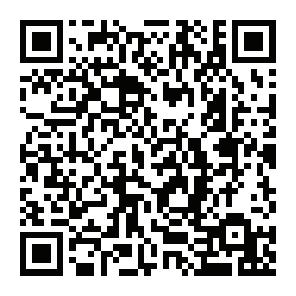
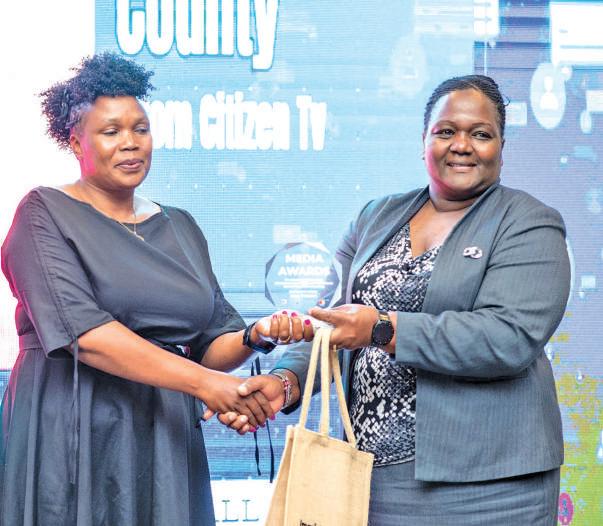
Citizen TV Journalist Nancy Kering (left) receives an award for excellence in gender media reporting from Ms. Catherine Matara, representative from the Ministry of Education, Kenya at the launch of Imarisha Msichana’s Situational Analysis Report on Teenage Pregnancy in Kenya and Media Awards.
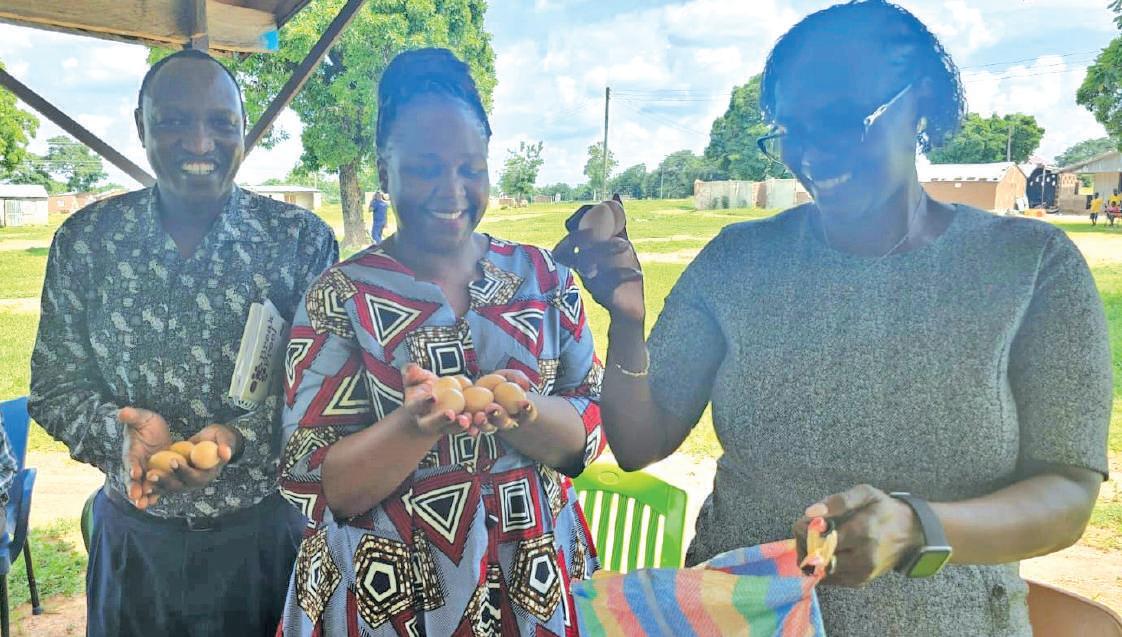
SHARE: Advancing Gender Equality and Health Rights in Africa
The SHARE (Sexual Health and Reproductive Education) programme continues to promote gender equality and the health rights of marginalized girls and young women across Ghana and Uganda. Anchored in community-driven solutions, the programme, founded by Global Affairs Canada, empowers young women and strengthens local systems to support their rights, education, and wellbeing.
In Uganda, FAWE facilitated the successful school re-entry of 247 girls , helping them resume their education after periods of disruption—often due to early pregnancy or child labour. A significant policy achievement was the passage of a local by-law in Buyende District, banning child fishing and night markets—both of which are known to expose girls to exploitation and school dropouts.
Additionally, 53 young women were equipped with essential life skills and psychosocial support, while 71 members of the Community of Practice (CoP) were trained in female leadership and advocacy strategies. These efforts are building a strong grassroots network
committed to advancing gender-responsive education and health systems.
In Ghana, advocacy efforts focused on challenging harmful gender norms and addressing the root causes of teenage pregnancy, gender-based violence (GBV), and ineffective parenting. The programme trained 78 community leaders on sexual and reproductive health and rights (SRHR), equipping them to lead informed conversations and interventions within their communities.
Furthermore, 21 journalists were trained in advocating for adolescent sexual and reproductive health and rights (ASRHR), with an emphasis on gender-sensitive reporting. This has led to a noticeable shift in media narratives—highlighting responsible, rights-based coverage of issues affecting girls and young women.
The SHARE programme stands as a powerful example of how collective advocacy, local leadership, and youth empowerment can create environments where girls are protected, supported, and empowered to thrive.
(From left) Mr. Richard Chelagat, FAWE Finance and Administration Director, Prof. Hazel Mumbo, Honorary Treasurer to the FAWE Board and Ms. Teresa Omondi-Adeitan, Deputy Executive Director and Head of Programmes FAWE Africa receive eggs from the community in Ghana.
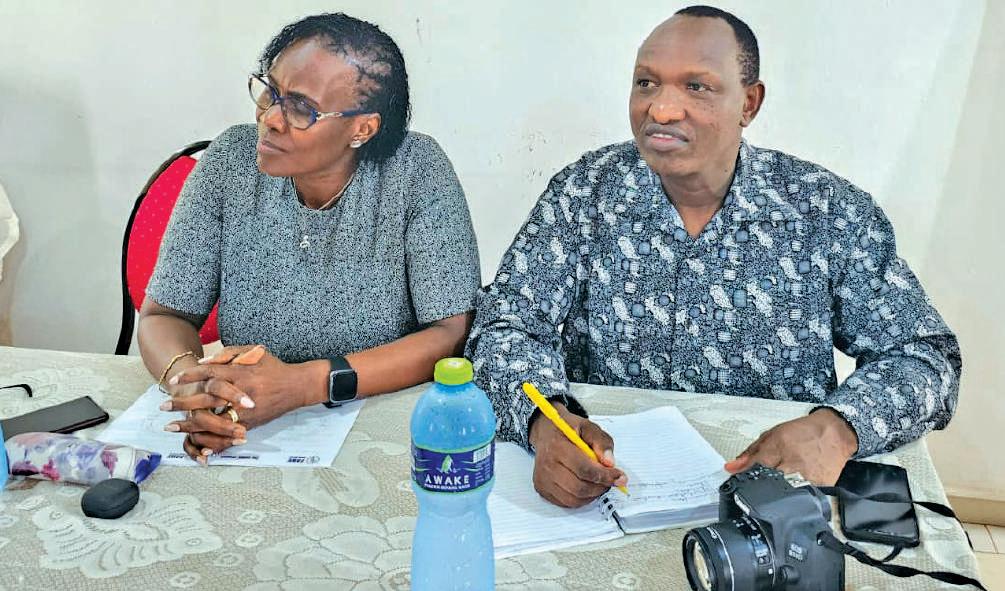
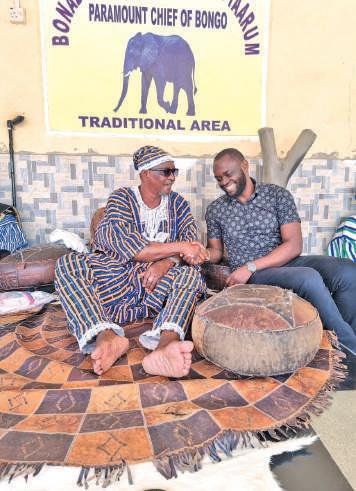
Information Moves Closer to the Communities in Ghana
In 2024, FAWE Africa, in partnership with FAWE Ghana under the SHARE Programme, established 16 Community Information Centers (CICs) across four districts in northern Ghana to expand access to Sexual and Reproductive Health and Rights (SRHR) information. Spearheaded by FAWE leadership, including Prof. Hazel Miseda Mumbo, Ms. Teresa Omondi-Adeitan, and Mr. Richard Chelagat, the CICs serve as safe, community-managed spaces that facilitate learning, dialogue, and referrals in collaboration with health personnel and local leaders. In their first year, the CICs engaged 609 individuals—437 women and girls and 172 men and boys—deepening awareness of adolescent SRHR and strengthening community support systems, in line with FAWE’s commitment to inclusive, grassroots-driven empowerment.
In 2024 alone, the CICs hosted community engagement sessions that reached 609 individuals—437 women and girls and 172 men and boys. 609
Mr. Richard Chelagat, FAWE Finance and Administration Director and Prof. Hazel Mumbo, Honorary Treasurer to the FAWE Board in a meeting in Ghana.
(From left) – The Paramount Chief of Bongo Traditional Area in the Upper East of Ghana Nana Baba Salifu Atamale Lemyaarum with FAWE Programme Officer
Mr. Martin Okhako. The FAWE team paid the chief a courtesy visit under the SHARE Programme.
Building Inclusive Healthcare: 120 Health Workers Trained on SRHR and Sign Language
In 2024, FAWE made a significant stride in promoting inclusive health systems by training 120 healthcare workers on Sexual and Reproductive Health and Rights (SRHR) and basic sign language. The initiative, implemented under the Make Way programme, focused on equipping healthcare providers with the skills needed to offer accessible and youth-friendly services to young people with disabilities.
The training addressed a critical gap in the healthcare system— the need for providers who understand and respond to the diverse needs of all young people, particularly those living with disabilities. By building capacity in both SRHR and sign language, the programme improved communication between healthcare workers and clients, enhancing access to essential services for marginalized youth.
This approach aligns with Make Way’s core principle: using an intersectional lens to dismantle barriers to SRHR. The programme recognizes that young people may face multiple, overlapping forms of discrimination—related to disability, gender, ethnicity, or social status—that compound their vulnerability and limit their access to health services.
Through this intervention, FAWE has not only strengthened service delivery but also contributed to shifting perceptions and practices within the healthcare system. As a result, healthcare providers are now more aware, better equipped, and more inclusive—laying the foundation for a system that ensures no young person is left behind in accessing their SRHR.
This work is part of FAWE’s broader advocacy for a world where every young person—regardless of background or ability—has access to comprehensive sexuality education, self-determination, contraception, and quality care.
Through this intervention, FAWE has not only strengthened service delivery but also contributed to shifting perceptions and practices within the healthcare system. As a result, healthcare providers are now more aware, better equipped, and more inclusive—laying the foundation for a system that ensures no young person is left behind in accessing their SRHR.
FAWE made a significant stride in promoting inclusive health systems by training 120 healthcare workers on Sexual and Reproductive Health and Rights (SRHR) and basic sign language in 2024.
Women in Political Participation: Empowering the Next Generation of African Leaders
For the past five years, FAWE has been a key implementing partner of the Women in Political Participation (WPP) project, led by International IDEA in collaboration with six regional and continental partners. The initiative is designed to increase women’s participation and influence in political and public life across Africa, in line with the Maputo Protocol, the Sustainable Development Goals (SDGs), and regional governance frameworks.
The WPP project is currently active in eight countries—Botswana, Côte d’Ivoire, the Democratic Republic of Congo, Eswatini, Kenya, Senegal, Tanzania, and Zimbabwe—where it promotes inclusive political systems and strengthens the capacities of aspiring and current women leaders.
In 2024, FAWE led high-level engagements in Kenya, including a workshop targeting young women leaders and political aspirants. The event featured participation from the Independent Electoral and Boundaries Commission (IEBC) and the Office of the Registrar of Political Parties (ORPP). The workshop sensitized participants on electoral systems, legal frameworks, and political party structures—while promoting early preparation for future elections.
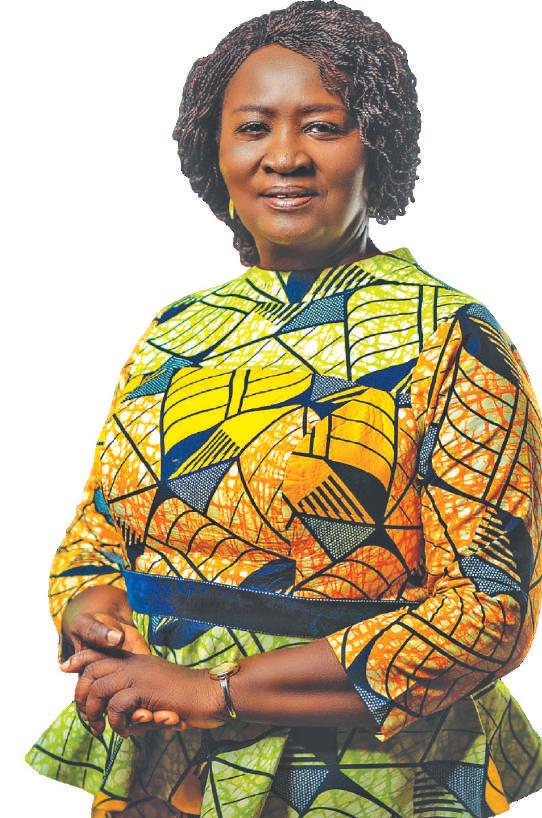
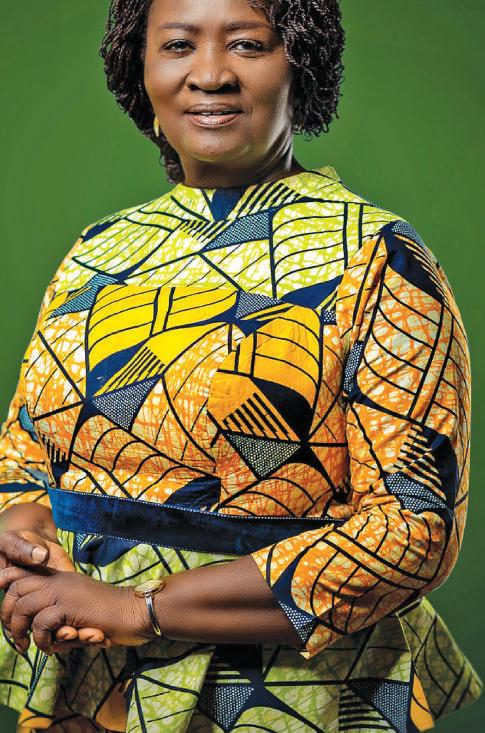
led by seasoned women parliamentarians, including Hon. Millie Odhiambo Mabona, who shared personal experiences and offered practical guidance to young women seeking entry into political life.
A highlight of the meeting was a mentorship session
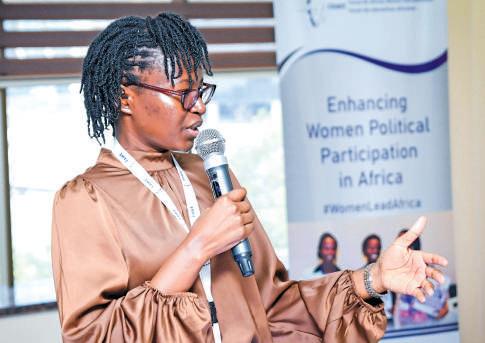
Regionally, FAWE contributed to the launch of the second edition of the WPP Barometer in South Africa—an advocacy and accountability tool that tracks and highlights progress in women’s political participation across the continent.
In parallel, FAWE developed a Regional Model School Module aimed at instilling leadership values among girls and young women. The module promotes ethical, inclusive, and civic-minded leadership from an early age, laying the groundwork for a future generation of transformative female leaders.
Through these efforts, FAWE continues to reinforce its commitment to building inclusive governance systems where African women and girls can participate, and lead.
Prof. Nana Jane Opoku Agyemang, Vice President of Ghana.
Ms. Cynthia Barasa, FAWE Programme Assistant speaking at a WPP event.
Data for Change II: Using Evidence to End SchoolRelated Gender-Based Violence
The Data for Change II Programme is a collaborative initiative between FAWE and Together for Girls, building on the successes of the first phase to drive systems change through evidence-based interventions.
Phase I of the programme focused on collecting and analyzing data to improve education outcomes for refugees and forcibly displaced populations, with a deliberate emphasis on gender-disaggregated data. This included a special focus on adolescent girls and young women in host communities, providing vital insights into their unique challenges and educational needs.
Phase II now shifts from data collection to action and implementation. The programme is currently piloting FAWE’s School-Related Gender-Based Violence (SRGBV) manual in Nigeria, Malawi, and Zimbabwe. This manual is designed as a practical toolkit for educators, school leaders, and administrators, equipping them with strategies to prevent and respond to SRGBV.
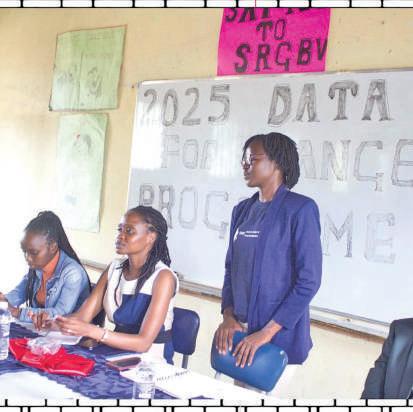
(Standing) Ms. Cynthia Barasa, FAWE Programme Assistant speaking at a workshop in Zimbabwe organized by the Data for Change II Programme.
In addition to the manual, factsheets and awareness materials are being disseminated to support training and raise community awareness. The overarching goal is to strengthen school systems, build safe learning environments, and eliminate SRGBV in and around schools and other learning institutions.
Through the Data for Change II Programme, FAWE is reaffirming its commitment to safe, inclusive, and gender-responsive education—ensuring that every girl can learn in an environment free from violence and fear
Building Safer Learning Spaces: Co-Creating a GBV Prevention Manual for Higher Education
In 2024, FAWE participated in the Mastercard Foundation Phase Zero Program through a six-month collaborative initiative with Wellesley Centers for Women (WCW), Gender Centre–Ghana, and CREAW–Kenya. This foundational phase sought to develop a culturally informed and context-specific approach to preventing Sexual and Gender-Based Violence (SGBV) in institutions of higher learning that host Mastercard Foundation Scholars.
The initiative took an ecological and participatory approach, emphasizing local context and cultural nuance. FAWE’s contribution during this period focused on gathering contextual data, identifying key issues, and
engaging with stakeholders to inform the co-creation of a comprehensive programme.
The ultimate goal is to co-develop a GBV prevention and response manual tailored for higher education settings, particularly those affiliated with the Foundation’s scholars’ programs. Once finalized, the manual will serve as a key resource in promoting safe, inclusive, and supportive academic environments for young women and men across Africa.
This Phase Zero marks the beginning of a longer journey toward sustainable solutions to SGBV in tertiary institutions—laying the groundwork for a co-creation phase and eventual scale-up.
Advancing Gender-Responsive Teaching through the Echidna Programme
The Echidna Global Scholars Programme continued to support FAWE’s advocacy for gender-responsive teaching practices across Eswatini, Tanzania, South Sudan, and Nigeria in 2024. The initiative aimed to improve learning environments by addressing systemic barriers that hinder girls’ access to quality education.
In Tanzania, FAWE collaborated with the Institute of Adult Education to review teaching modules with a gender lens. The chapter also showcased its leadership in teacher capacity-building at the East African Community Regional Education Conference in Arusha, where it advocated for the implementation of school re-entry policies for young mothers.
In Eswatini, FAWE developed a comprehensive advocacy strategy and commissioned research to examine the
status of girls’ education and the impact of early pregnancies on dropout rates. These efforts aim to inform national policies that foster inclusive learning environments.
In Nigeria, FAWE launched a baseline report on teenage pregnancy, which highlighted the compounded effects of insecurity on girls’ education. The chapter also developed a scorecard to assess the country’s implementation of the Maputo Protocol, revealing persistent cultural barriers to addressing gender-based violence and ensuring access to education for girls.
Through the Echidna Programme, FAWE and its chapters are building evidence, influencing policy, and equipping education systems to respond more effectively to the needs of girls and young women across Africa.
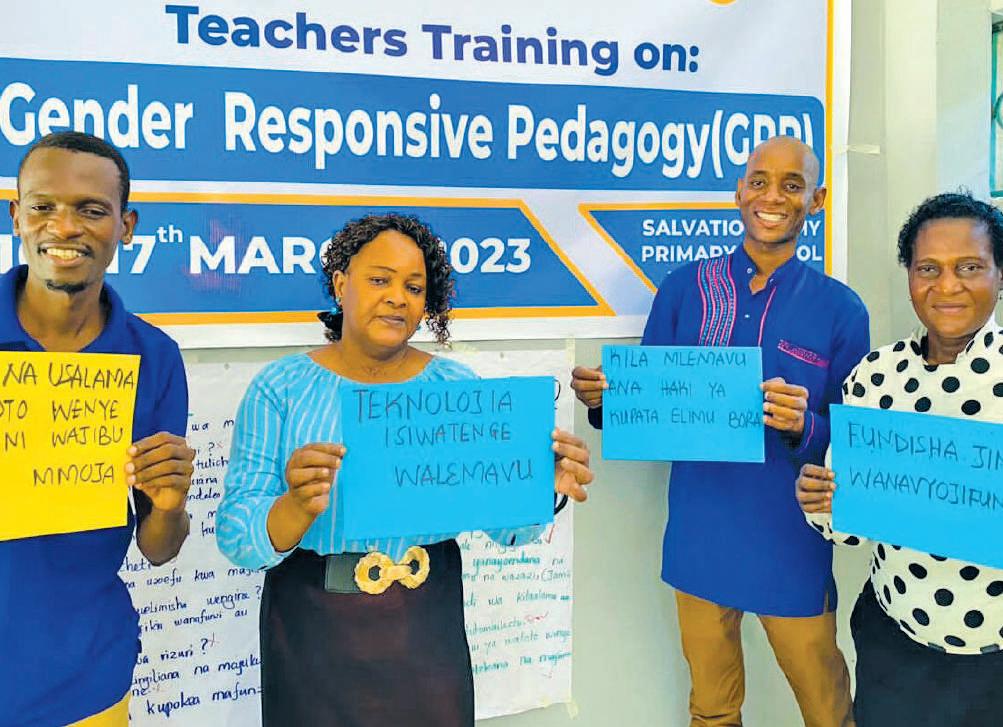
School teachers from Tanzania hold up messages at a past GRP training.
Opening Doors, Changing Lives: FAWE’s Scholarship
Initiatives for Girls’ Education
Education is more than a right—it’s a lifeline. At FAWE, scholarships are not just about tuition; they’re a pathway to dignity, opportunity, and transformation. Across Africa, FAWE’s scholarship initiatives are tailored to reach the most marginalized—teen mothers, young girls from impoverished communities, and aspiring researchers. These programmes reflect FAWE’s belief that every girl, no matter her background or circumstance, deserves the chance to learn and lead.
In Numbers
17
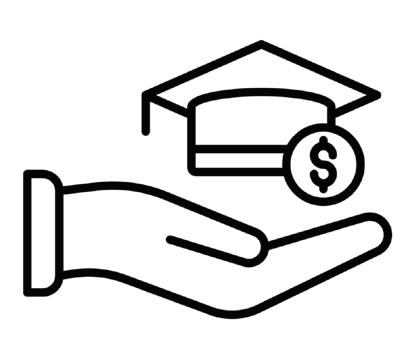
153
14 women from 14 countries were successfully awarded Commonwealth Scholarships for the 2024/2025 academic year.
17 women from 14 countries were successfully awarded Commonwealth Scholarships for the 2024/2025 academic year.
FAWE awarded 153 comprehensive scholarships to teenage mothers at risk of dropping out of school. These scholarships are more than financial—they include mentorship, psychosocial support, and community advocacy to combat stigma.
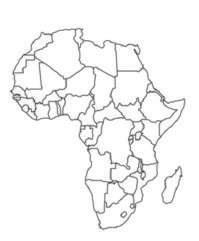
Commonwealth Scholarships: Advancing Women’s Leadership Through Postgraduate Education
FAWE’s collaboration with the Commonwealth Scholarship Commission continues to open global academic pathways for African women. These prestigious scholarships, funded by the UK government, offer full support for postgraduate studies in the United Kingdom, empowering scholars to contribute to sustainable development and innovation in their home countries.
In 2024, FAWE played a key role in nominating talented female candidates across Africa. Out of 52 submissions—comprising 27 Master’s and 25 PhD applicants—17 women from 14 countries were successfully awarded Commonwealth Scholarships for the 2024/2025 academic year.
This partnership is more than an academic opportunity—it is a strategic investment in Africa’s future. The selected scholars are poised to become influential leaders in science, education, public policy, and development, strengthening the continent’s voice in global research and innovation spaces.
Education is more than a right—it’s a lifeline. At FAWE, scholarships are not just about tuition; they’re a pathway to dignity, opportunity, and transformation.
The African Girls’ Education Fund (AGEF): A Homegrown Commitment to Second Chances
Launched in 2022, the African Girls’ Education Fund (AGEF) is FAWE’s flagship initiative to support some of the most vulnerable girls in Africa—particularly teenage mothers—by giving them a second chance at education. The fund currently supports girls in Kenya, Togo, Eswatini, Liberia, and Burundi, reflecting FAWE’s commitment to leave no girl behind.
In 2024, FAWE deepened this commitment with the launch of AGEF for the West African SubRegional Office (WASRO). The launch took place during FAWE’s Annual Planning and Review Meeting in Naivasha, Kenya, where staff demonstrated remarkable solidarity by making personal contributions, symbolizing a collective pledge to expand opportunities for girls across the continent.
AGEF also continued to benefit from corporate generosity. North and South Travel, led by Kanveer Lochab, sponsored two additional teenage mothers in Kenya this year. This brought the total number of girls supported under the fund to five, including one who successfully completed secondary school and is now preparing to begin a diploma course in 2025
Through AGEF, FAWE showcases how African-led
Imarisha Msichana Scholarships: Second Chances for Teen Mothers
Under the Imarisha Msichana programme, FAWE awarded 153 comprehensive scholarships to teenage mothers at risk of dropping out of school. These scholarships are more than financial—they include mentorship, psychosocial support, and community advocacy to combat stigma. The programme is a cornerstone of FAWE’s mission to ensure girls who face early pregnancy are not permanently excluded from the education system. Imarisha proves that with the right support, girls can return to school, thrive, and rewrite their futures.
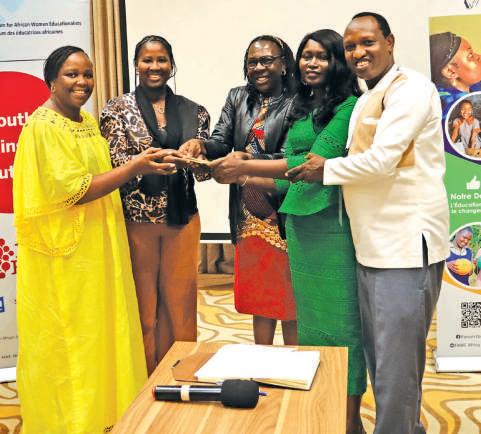
left) Ms. Teresa Omondi-Adeitan, Deputy Executive Director and Head of Programmes FAWE Africa, Ms. Catherine Badji, Finance Officer, Dr. Martha Muhwezi, Executive Director FAWE Africa, Dr. Bity Diene, WASRO Coordinator and Mr. Richard Chelagat, FAWE Finance and Administration Director take a photo at the handover of AGEF funds to the WASRO office. This was held in Naivasha, Kenya.
philanthropy and public-private partnerships can create tangible impact—restoring hope, rebuilding futures, and reaffirming the transformative power of education for every African girl.
Staff-Led Social Welfare Scholarships: Solidarity in Action
At FAWE, commitment begins from within. In 2024, FAWE staff continued their grassroots initiative to support girls’ education by pooling resources to fund secondary education for young girls in Kenya. This internal welfare programme reflects the values that drive FAWE’s mission—solidarity, empathy, and action. It shows that change doesn’t always require external funding; it can start with staff who believe in the power of collective action.
(From
Restoring Dreams: Alice’s Fight for Education
Alice Meseno Pere’s journey from despair to triumph began with a documentary and culminated in her proudly holding a Kenya Certificate of Secondary Education (KCSE) result slip. Her story is one of resilience, unwavering hope, and the transformative power of education.
Born in the scenic Narok County, Kenya, Meseno was the eldest child of Mr. and Mrs. Pere. She grew up dreaming of becoming a lawyer, inspired by the stories of Maasai women who had defied cultural barriers—escaping female genital mutilation (FGM) and child marriage to pursue legal careers. Determined to follow in their footsteps, she worked hard at Naning’oi Primary School despite the school’s limited resources, which included inadequate classrooms and the absence of a library.
However, her path took an unexpected turn in 2020 during the COVID-19 pandemic. When schools closed nationwide, countless girls faced increased vulnerability, and Meseno was no exception. At just 14, she became pregnant shortly after completing her Kenya Certificate of Primary Education (KCPE). She gave birth to a baby boy in early 2021, just as schools were reopening.
Her story caught the attention of FAWE when she was featured in the documentary Her Stolen Childhood, which highlighted the struggles of girls who became pregnant during the pandemic. Her situation worsened when her father, unable to afford her secondary school fees, arranged for her to be married off at 15. But her mother, a firm believer in education, refused to give up. With the help of Meseno’s uncle, she secured a place for her daughter at Melelo Secondary School.
News of her plight reached the FAWE Regional Secretariat, where staff came together in a remarkable show of solidarity. They raised funds to cover her school fees, boarding needs, uniform, and stationery—not only ensuring her return to school but also covering her tuition for the following term.
“I was devastated when I heard my eldest daughter was about to be married off. It broke my heart to think she would live the same life I did. I have always dreamed of educating my children so they can have better lives. I prayed, and God answered my prayers,” said her mother, Mrs. Noontawaua Pere.
Given a second chance, Meseno committed herself fully to her studies. She sat for her KCSE exams and earned a C-. Though she no longer dreams of becoming a lawyer, she has discovered a new passion—Human Resource Management—and is preparing to join a tertiary institution to pursue a diploma in the field.
“I am so grateful to FAWE. Without their quick action, I would never have gone to secondary school. Now, I have a future—not just for myself but for my child as well. Even my father has changed his perspective, and all my siblings, both boys and girls, are in school. The Pere home will be a home of educated people, and that makes me so happy,” Meseno shared.
Her story is not unique. Across Africa, too many girls face the risk of losing their education due to financial hardship, teenage pregnancy, or forced marriage. It is for this reason that FAWE launched the African Girls Education Fund in November 2022. The fund has already supported four girls in Kenya, ensuring they can complete their secondary education.
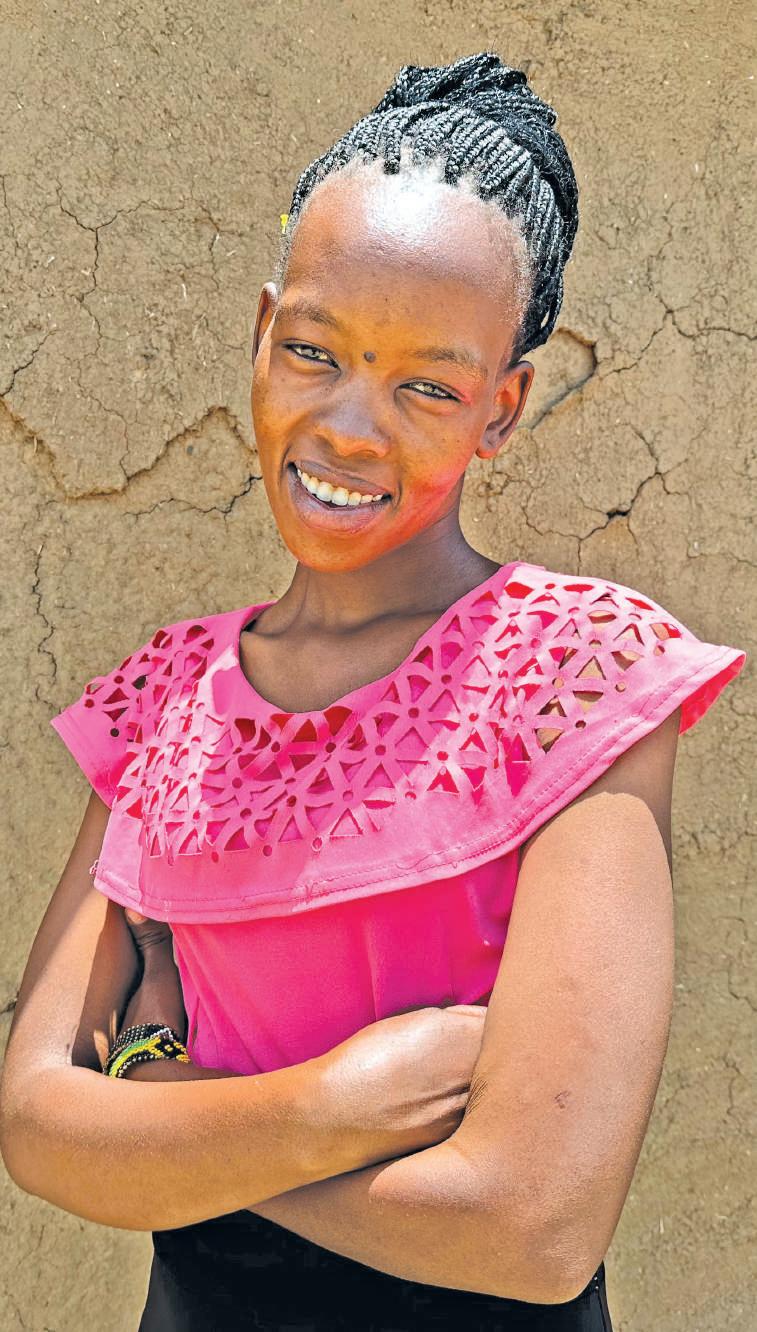
I am so grateful to FAWE. Without their quick action, I would never have gone to secondary school. Now, I have a future—not just for myself but for my child as well. Even my father has changed his perspective, and all my siblings, both boys and girls, are in school. The Pere home will be a home of educated people, and that makes me so happy,” Meseno
Alice Meseno Pere, Beneficiary of FAWE’s social welfare.
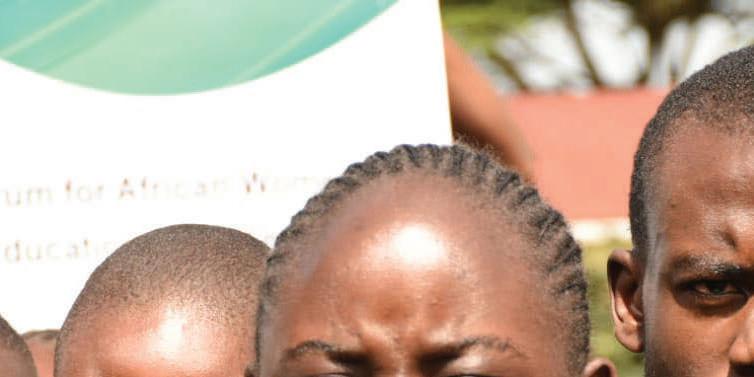
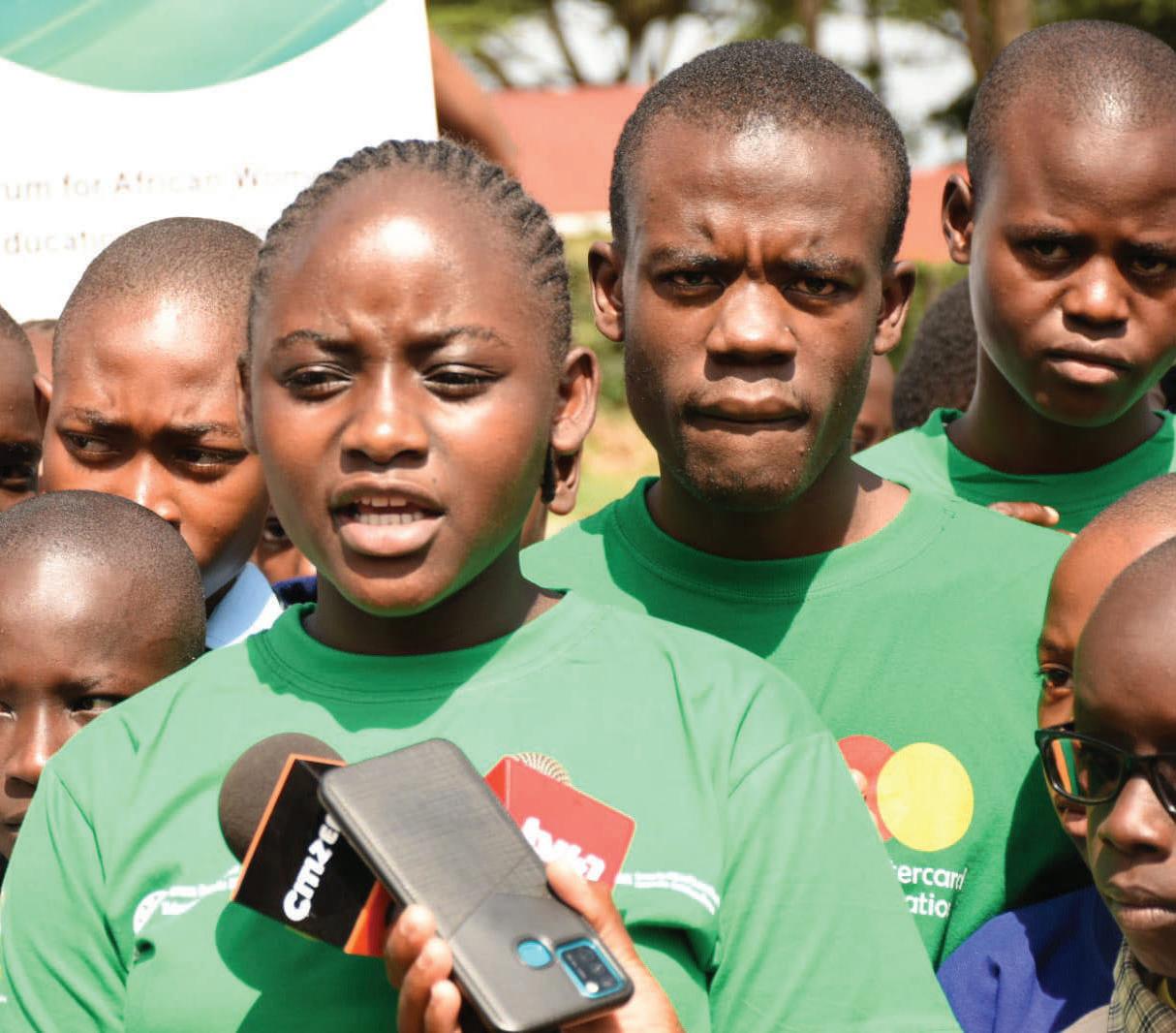
to the press on the Day of the African Child 2024.
Kenyan school children speak
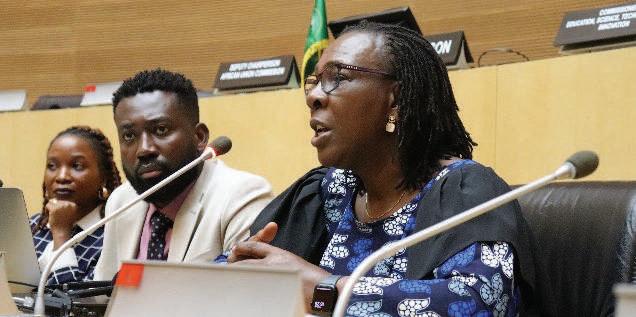
The AU Year of Education 2024: A Defining Moment for Africa’s Education Future
Education is the foundation of Africa’s progress, shaping the continent’s social, economic, and political trajectory. Recognizing this, the African Union (AU) declared 2024 as the Year of Education, a landmark initiative aimed at catalyzing action towards building resilient, inclusive, and quality education systems across the continent. This year signified more than just a renewed commitment; it was a call to break down systemic barriers, embrace innovation, and prioritize education as the driving force for sustainable development.
A Turning Point for Africa’s Education Agenda
For decades, education in Africa has faced persistent challenges: low enrollment rates, high dropout numbers, inadequate infrastructure, and gender disparities that continue to exclude millions of children, especially girls. According to UNESCO (2023):
The AU Year of Education provided a unique opportunity to confront these challenges with urgency and purpose. Governments, civil society organizations, and global
32 million
Children of primary school age remain out of school, with girls constituting the majority of those excluded.
Only 30% of African students transition to secondary education, limiting access to economic opportunities and lifelong learning.
Less than 28% of STEM graduates in Africa are women, highlighting persistent gender gaps in science and technology fields.
FAWE’s Executive Director Dr. Martha Muhwezi speaking at the AU Pan African Conference on Girls and Women’s Education held in Addis Ababa, Ethiopia.
partners mobilized to advance policies and programs that promote inclusive, quality education for all.
Major Achievements of the AU Year of Education 2024
This year witnessed transformative progress in several key areas:
• Policy and Investment Commitments: African governments pledged to increase education budgets, aiming to meet the global benchmark of allocating 20% of national expenditures to education (Global Education Monitoring Report, 2024).
• Expansion of Digital Learning: The push for technology-driven education saw increased adoption of digital tools and platforms, bridging learning gaps in remote and underserved regions.
• Strengthened TVET and Workforce Readiness: Greater emphasis was placed on Technical and Vocational Education and Training (TVET) to equip young Africans with skills relevant to evolving labor markets.
• Enhanced Regional Collaboration: The AU spearheaded efforts to align national education frameworks with the Continental Education Strategy for Africa (CESA 16-25) and Agenda 2063, ensuring a cohesive approach to education development.
The Gender Imperative: Advancing Education for Girls and Women
While education for all is a universal goal, the reality remains that girls and young women continue to face significant barriers to accessing and completing their education. The AU Year of Education amplified the urgency of closing the gender gap by:
• Promoting Safe and Inclusive Schools: Addressing issues such as School-Related Gender-Based Violence (SRGBV) and lack of menstrual hygiene facilities, both of which are leading causes of school dropouts among girls.
• Scaling Gender-Responsive Pedagogy (GRP): Encouraging African education systems to integrate teaching methodologies that promote gender equity in classrooms.
• Increasing Female Participation in STEM: Governments and institutions ramped up initiatives to increase the representation of women in science, technology, engineering, and mathematics fields.
Looking Ahead: Sustaining the Momentum Beyond 2024
The AU Year of Education must not be seen as a single-year campaign but as a foundation for lasting transformation. To sustain this momentum, African leaders, educators, and stakeholders must:
• Strengthen policy implementation to ensure education reforms translate into measurable impact.
• Expand investment in girls’ education, recognizing that an educated girl is a catalyst for economic growth, poverty reduction, and social progress.
• Foster stronger partnerships between governments, civil society, and the private sector to drive innovation and long-term change.
The AU Year of Education 2024 has set the stage for a future where every African child, regardless of gender or background, has access to quality education. It was a year of renewed hope, bold commitments, and groundbreaking initiatives. As we move forward, the challenge is clear: to ensure that the progress made is not just sustained but accelerated. Africa’s education transformation has begun—now is the time to build on this momentum and create a continent where learning is truly a right for all.
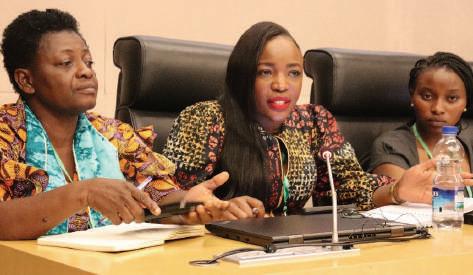
FAWE Senior Advocacy and Partnerships Officer Ms. Catherine Asego speaks at a panel on the margins of the AU Pan African Conference on Girls and Women’s Education held in Addis Ababa, Ethiopia.
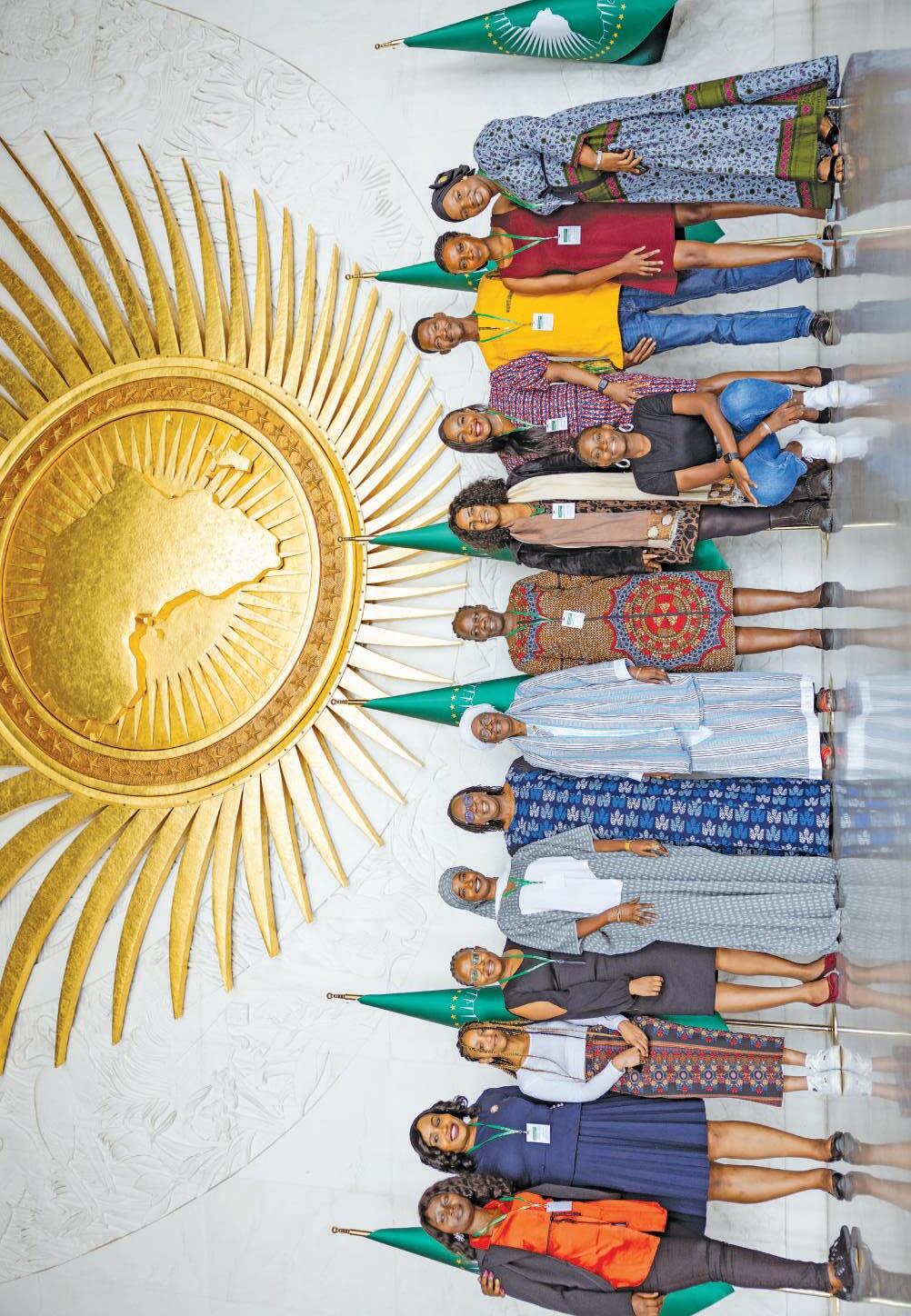
The FAWE delegation present at the AU Pan African Conference on Girls and Women’s Education in Addis Ababa, Ethiopia.
FAWE at the Committee on Status of Women (CSW68)
“Accelerating the Achievement of Gender Equality and the Empowerment of All Women and Girls by Addressing Poverty and Strengthening Institutions and Financing with a Gender Perspective’”
The month of March is Women’s month, all roads lead to the Committee on Status of Women (CSW) meetings held in New York, United States of America. The CSW is a functional commission of the United Nation’s Economic and Social Council (ECOSOC) and principal intergovernmental body exclusively dedicated to the promotion of gender equality, the rights and the empowerment of women. The CSW is the largest annual process for civil society participation within the United Nations, embodying the principles of dialogue, collaboration, and collective action that are essential to advancing gender equality and the empowerment of women and girls worldwide.
Ms. Teresa Omondi Adeitan FAWE’s Deputy Executive Director and Head of Programmes represented FAWE at the 68th CSW, 2024. This participation came after several years of FAWE’s absence at CSW as an effort to revamp visibility for girls education in Africa. FAWE was represented in events including one hosted by COCAFEM with whom FAWE partnered to implement EDUFAM grant on education in emergencies. FAWE trained various education stakeholders from Democratic Republic of Congo, Rwanda and Burundi on her models on Tuseme[1], Centres of Excellence[2] and Gender responsive pedagogy[3]. FAWE champions these models as means of accelerating gender equality and fighting poverty. The models increase access to education and retention of girls in school.
In panels hosted by Population Council and UNICEF on power, practise and potential for the protection of adolescent girls and another on driving accountability and leadership to accelerate gender equality in and through education. FAWE shared strategies implemented under the Kenya Imarisha Msichana programme on investing in education and empowerment of teenage mothers to return to school.
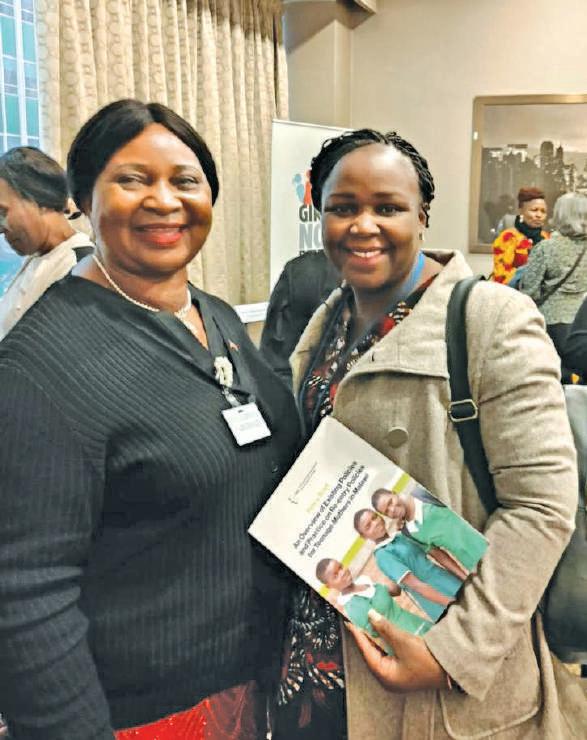
(Left) Hon. Jean Muonawauza Sendeza, Minister of Gender, Community Development and Social Welfare, Malawi with Ms. Teresa Omondi-Adeitan, Deputy Executive Director and Head of Programmes FAWE Africa, at the 68th CSW in New York, USA.
As part of social protection, re-entry polices must also target adolescent mothers who are not comfortable returning to regular primary and secondary schools. Such mothers should be supported for tertiary education at technical voluntary education training (TVETs).”
Ms Teresa Omondi – Adeitan, Deputy Executive Director FAWE Africa.
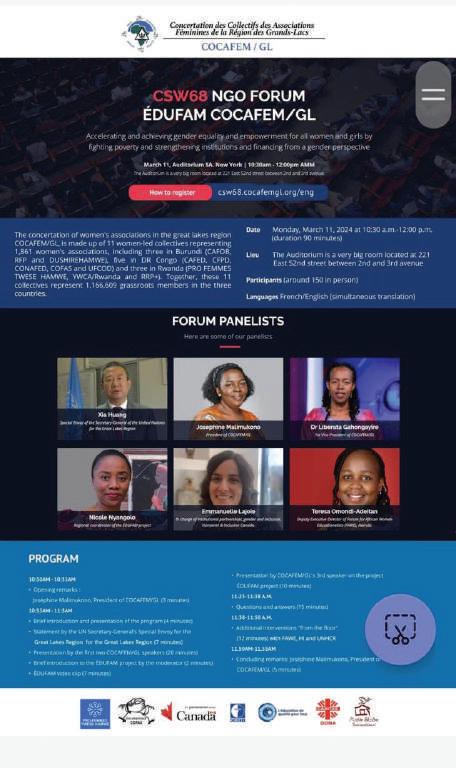

CSW68 was also a resound opportunity for FAWE as a panellist in a co-hosted event with the African Union, AU CIEFFA and UNICEF to champion for girls and women’s education, fighting against all forms of harmful practices against females in Africa. This discussion came at a time when The Gambian government had an impending private member’s bill proposing to re-introduce female genital mutilation in The Gambia.
Throughout CSW68, and for every opportunity that arose,
It is despicable for the globe to the recalled to discuss and convince certain leaders that FGM does not belong in this time and age, not in 2024 or ever. FGM gravely affects girls’ education. We must call out all leaders who wish to reintroduce retrogressive social cultural practices. We can not allow ourselves to make one step forward and three steps behind” said Ms. Teresa Omondi Adeitan Deputy Executive Director FAWE Africa.
including signing petitions, FAWE recorded her plea to The Gambian parliament not to pass such a retrogressive law. The news of the failed bill was received with jubilation not only in Africa but globally. Such laws can be fast spreading and disastrous in spaces where gender equality continues to get push back and seldom resourced.
The CSW is a bustle of activities that gives an opportunity for solidarity, mass advocacy and impactful recommendations to countries on girls and women empowerment. It is a space of determination and FAWE is determined to be annually present at the iconic global gathering to share about our work in the continent and advocate for change that we still desire.
[1] Tuseme Youth Empowerment – Forum for African Women Educationalists: FAWE
[2] Centres of Excellence / Gender Responsive Schools – Forum for African Women Educationalists: FAWE
[3] Gender-Responsive Pedagogy – Forum for African Women Educationalists: FAWE
FAWE at the Summit of the Future: Securing a Place for Girls and Young Women in Africa’s Tomorrow
From September 20 to 24, 2024, world leaders, civil society actors, and global institutions gathered at the United Nations Headquarters in New York for the much-anticipated Summit of the Future, held under the theme: “Multilateral Solutions for a Better Tomorrow.” At the heart of this high-level gathering was a call to reimagine global cooperation in the face of 21stcentury challenges—education, gender inaequality, climate change, and youth marginalization among them.
For FAWE, the Summit was not just another global convening. It was a critical opportunity to elevate the voice of African girls and young women on a global platform and ensure that education, particularly for the most vulnerable, remains central to the world’s development agenda.
FAWE co-hosted a powerful side event on intergenerational dialogue focused on accelerating progress toward SDGs 3, 4, and 5—Good Health and Well-being, Quality Education, and Gender Equality. The session brought together partners like the African Union’s CIEFFA, UN Women, Hilton Foundation, and Bakhita Partnership for Education, along with FAWE’s own youth representative on the board, Lamin Jarjusey. Together, they emphasized the value of youth leadership and the need to place girls and young women at the center of shaping educational futures.
As the Pact for the Future was adopted by UN Member States, FAWE ensured that the realities of African girls—often left behind due to poverty, conflict, or social norms—were not forgotten. During plenary discussions, FAWE’s delegation led by Dr. Martha Muhwezi, Executive Director for FAWE, advocated for an inclusive system that upholds education as a public good, and called for greater investment in girls’ leadership and empowerment across Africa.
FAWE also joined continental voices to celebrate the African Union’s Year of Education 2024, participating in events organized by the AU and its partners. Here, FAWE amplified the message that the continent’s prosperity depends on bold investments in gender-responsive education systems. We pushed for policies that bridge gender gaps in access and learning outcomes, and emphasized the importance of data, innovation, and accountability in driving long-term change.
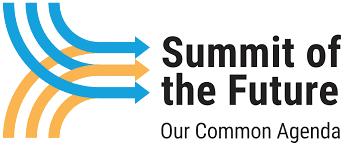
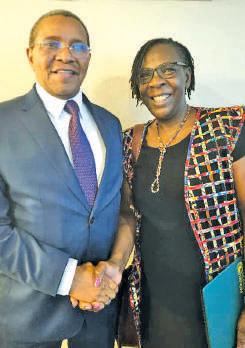
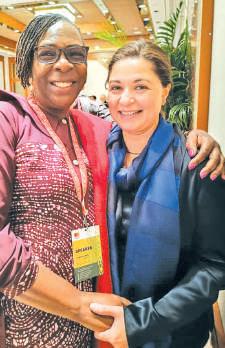
At a special session hosted by the AU’s Department of Education, Science, Technology and Innovation (ESTI), FAWE highlighted the role of TVET (Technical and Vocational Education and Training) in equipping young women with practical skills for dignified employment. Our long-standing partnership with the Mastercard Foundation was showcased as a model for how publicprivate partnerships can drive equity and impact at scale.
Participation in the Summit of the Future strengthened FAWE’s international advocacy agenda. It affirmed that youth leadership, gender equality, and education are not peripheral issues—they are foundational to global transformation. The event created new visibility for FAWE’s work, opened up new channels for strategic partnerships, and reinforced our voice in shaping policies that matter for Africa’s girls.
As the world looks toward implementing the Pact for the Future, FAWE remains committed to holding global and continental leaders accountable for their promises—because the future must belong to all of us, and that includes every girl on the African continent.
FAWE’s Executive Director Dr. Martha Muhwezi with Former President of Tanzania H.E Jakaya Mrisho Kikwete (left picture) and Ms. Hajra Zahid, Head, Girls Education at the Mastercard Foundation.
FAWE Participates in the Inaugural EAC Conference in Arusha, Tanzania
From August 12 to 15, 2024, the East African Community (EAC) hosted its first-ever Regional Education Conference in Arusha, Tanzania, under the theme:
“Transforming Education in the East African Community: From Policy to Practice.”
The landmark event brought together education ministers and senior representatives from the eight EAC Partner States, the African Union’s Commissioner for Education, Science, Technology and Innovation, Prof. Mohamed Belhocine, policymakers, parliamentarians, development partners, civil society organizations, and academic institutions. The goal: to strengthen regional collaboration and advance education reform that responds to the needs of East Africa’s learners.
FAWE participated in this pivotal convening, represented by Carolyne Datche (Programme Officer), Stanley Muigai (IT Officer), Mary Mwakawago (Programme Coordinator – FAWE Tanzania), and Catherine Asego (Senior Advocacy and Partnerships Officer).
In two well-received presentations, the FAWE team shared key insights from its advocacy and programmatic work:
• Addressing Teenage Pregnancies through Integrated Approaches
FAWE presented a consolidated overview of its multifaceted interventions tackling teenage pregnancy in Uganda, Kenya, and Tanzania. The presentation demonstrated how data-driven research, Tuseme clubs, safe spaces, community dialogue, and school reentry policies are collectively improving education access and retention for girls in the region.
• Strengthening Education Systems through Gender Responsive Pedagogy (GRP)
The team also shared experiences on scaling up FAWE’s Gender Responsive Pedagogy model, an approach that equips educators with the skills, knowledge, and attitudes to deliver inclusive and gender-sensitive instruction. The GRP model continues to prove essential in rebuilding learning environments that not only accommodate girls but help them thrive.
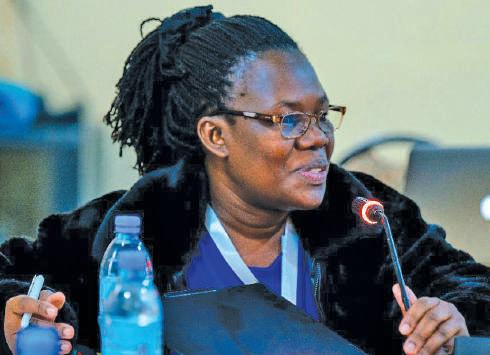
FAWE’s engagement at this high-level forum directly aligns with its Strategic Objective 1 (Access to Quality Education) . By amplifying voices of girls and advocating for proven, scalable models like GRP and Tuseme, FAWE contributed to shaping a regional education discourse that prioritizes equity, resilience, and learner well-being.
The EAC Regional Education Conference underscored the value of collaborative action—and FAWE remains a trusted partner in mobilizing solutions for gender equality and inclusive learning across East Africa.
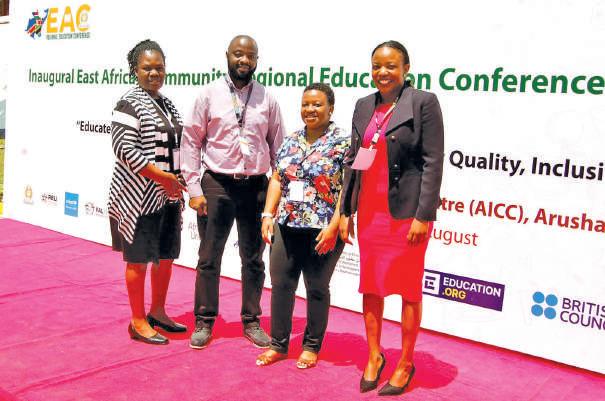
Tanzania Programme Manager Ms. Mary Mwakawago and FAWE Senior Advocacy and Partnerships Officer Ms. Catherine Asego.
FAWE Programme Officer Ms. Carolyne Datche speaking at the Inaugural EAC Conference in Arusha, Tanzania.
FAWE team take a group photo at the Inaugural EAC Conference. (From left) Programme Officer, Ms. Carolyne Datche, IT Officer Mr. Stanley Muigai, FAWE
Championing Girls’ Education: FAWE Nigeria Leads with Vision and Voice
With a bold vision for transforming education in Africa, FAWE Nigeria brought together key actors in the education ecosystem for its National Annual Girls’ Education Conference and General Assembly in November 2024 in Abuja. Held under the powerful theme “Educating and Skilling Africa for the 21st Century: Empowering Women and Girls Through Leadership and Innovation,” the gathering served as a strategic platform to inspire, inform, and mobilize action.
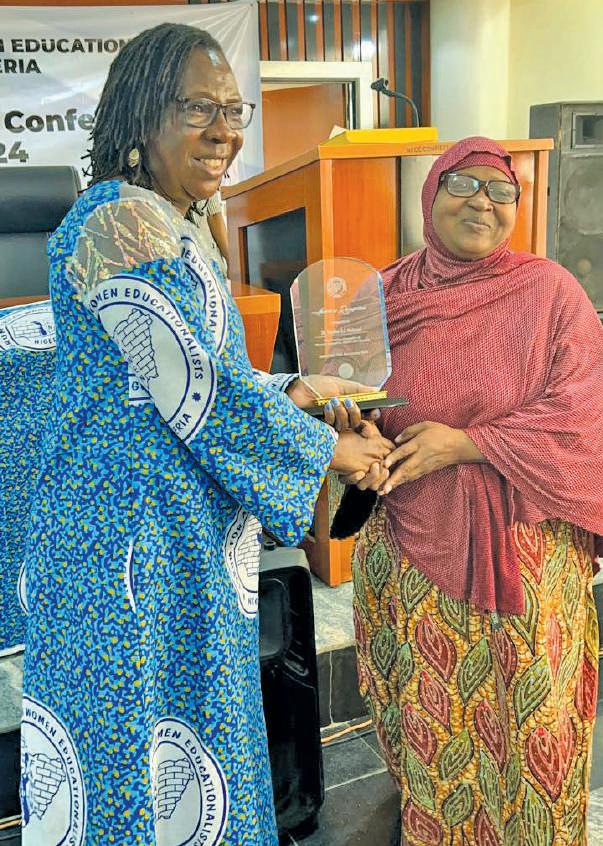
At the heart of the event was a call for collective commitment to ensure girls and young women across Nigeria are not only in school, but are equipped to lead, innovate, and thrive in a rapidly changing world.
A Spotlight on Leadership and Innovation
Delivering the keynote address, Dr. Martha Muhwezi, FAWE Africa’s Executive Director, underscored the need to nurture girls’ leadership potential and expand access to 21st-century skills. She called for increased investments in education systems that are genderresponsive, inclusive, and innovation-driven.
Her message was echoed by Prof. Umar A. Pate, Vice Chancellor of Federal University Kashere, Gombe, who hailed FAWE Nigeria for its enduring contributions to education. In his words:
Many journals never go past Volume 1 or 2, but FAWE Nigeria has demonstrated unmatched commitment through its consistent annual publication. It is a model of what sustained intellectual engagement can achieve.” Prof. Umar A. Pate
A Platform for Thought Leadership
The conference also featured the official launch of the 2024 FAWE Nigeria Journal, a publication that showcases research and perspectives from leading educationalists. With articles addressing policy, gender, pedagogy, and innovation, the journal positions FAWE Nigeria as a key voice in education reform—not just within the country but across the continent.
As conversations unfolded, one theme stood out: educating girls is not just about classrooms—it’s about leadership, dignity, and opportunity. Through this event, FAWE Nigeria reinforced its role as a driver of change and a convener of critical dialogue on the future of girls’ education in Africa.
Prof Umar A. Pate Vice Chancellor of Federal University Kashere, Gombe hands over an award to FAWE Executive Director Dr. Martha Muhwezi.
FAWE Leads GIMAC with a Focus on Education
In 2024, the African Union (AU) declared its theme of the year as ‘Educate an African fit for the 21st Century: Building resilient education systems for increased access to inclusive, lifelong, quality, and relevant learning,’ Africa’s Agenda 2063 serves as the strategic blueprint for transforming the continent into a global powerhouse. It prioritizes inclusive and sustainable development, emphasizing social and economic progress, regional integration, democratic governance, and peace. Closely aligned with Agenda 2063, the Continental Education Strategy for Africa 2016 – 2025 (CESA 16-25) aims to revolutionize education and training, ensuring that Africa’s human resources align with core African values and contribute to the vision of the African Union. Both frameworks recognize the pivotal role of education in achieving sustainable development and enhancing human capital.
At the 2024 Gender is My Agenda Campaign (GIMAC) Conferences held in Ethiopia and Ghana, particular focus was placed on increased funding to education through urging governments to allocate 20% of the national budget or a minimum of 6% of their GDP to education through gender responsive budgeting; advocating for universal free education and providing back-to-school programmes for pregnant teenagers and the eradication of child marriage; calling for investing in digital education with inclusivity in mind and gender responsive education through the implementation of gender transformative pedagogy across all levels of education.
FAWE’s role as the lead convener in 2024’s GIMAC conferences provided a unique opportunity to work hand in hand with Civil Society Organizations and governments to promote quality education for all. FAWE lead engagements at regional level with the African Union (AU) bodies, and the Regional Economic Communities (RECs) profiling gender equality in education.
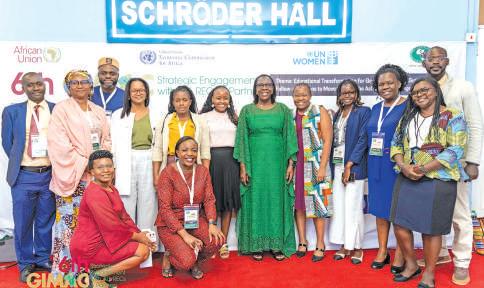
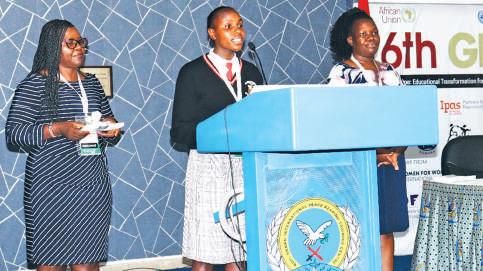
Notably, during one of the GIMAC sessions, FAWE launched its mirrored approach to School Related Gender Based Violence (SRGBV) manual that provides a holistic approach to identifying, referring, and reporting cases on SGBV. It is during this session that FAWE provided a platform to Mary Wanjiru Mbugua, a Kenyan girl who got a second chance to education after getting pregnant while in school. Mary shared that SRGBV was a major contributor to teenage pregnancy and school drop-out for girls. She urged governments and policy makers to prioritize enacting the reentry policy in their respective countries, invest more in girls education and improve collaboration between civil societies, private partners for increased financing. Mary applauded the project Imarisha Msichana by FAWE in partnership with Mastercard foundation for supporting over 2,000 girls to re-enroll in school and realize their dreams.
The key outcome from these convenings included recommendations on child marriage, teenage pregnancies, comprehensive sexual education, and school-related gender-based violence among others.
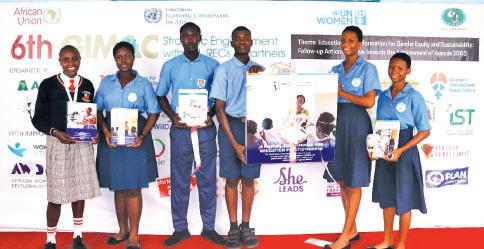
The FAWE delegation at the GIMAC.
(Right) Mary Mbugua joins other school students to pose for a photo with the newly launched FAWE SRGBV manual.
Imarisha Msichana Participant Mary Mbugua makes a presentation at the 2024 GIMAC Conference in Ghana. She is flanked by FAWE Programme Officer, Ms. Carolyne Datche and FAWE Kenya County Coordinator Ms. Eva Ojwang’.
Africa Skills Week 2024: Shifting the Narrative on TVET and Girls’ Empowerment
As part of the African Union’s Year of Education, the African Union Commission’s Department of Education, Science, Technology and Innovation (ESTI), together with its partners, convened the first-ever Africa Skills Week (ASW) in 2024. Under the theme “Skills and Jobs for the 21st Century: Quality Skills Development for Sustainable Employability in Africa”, the event brought into sharp focus the urgent need to equip Africa’s youth—especially girls—with the technical and vocational skills necessary to thrive in a dynamic and competitive global economy.
The week-long event brought together key stakeholders from across the continent, including education ministers from The Gambia, Libya, Uganda, Central African Republic, and Sierra Leone, alongside technical experts and development partners such as GIZ, ILO, UNESCO, AUDA-NEPAD, the World Bank, EU Ghana Pact for Skills, and the Mastercard Foundation, among others.
Throughout the conference, one message resonated clearly: Technical and Vocational Education and Training (TVET) must be elevated as a viable, respected, and accessible pathway—especially for girls and young women. Delegates emphasized the need to scale up
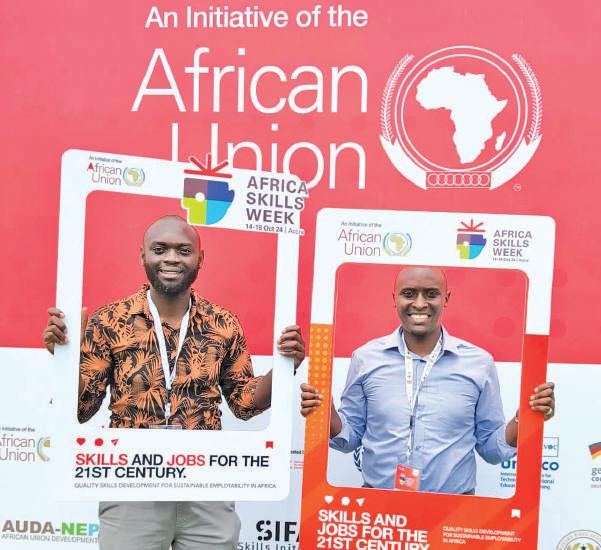
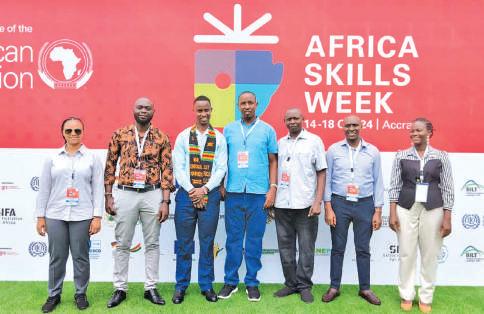
investment in STEM education and to create inclusive environments that empower girls to pursue skills training and enter technical fields traditionally dominated by men.
Governments shared promising practices, such as lowering the cost of technical training, integrating entrepreneurship into curricula, and establishing start-up support systems to foster youth-led businesses. Ghana emerged as a model of progress, demonstrating how intentional investments in skilling, particularly for girls, can lead to meaningful economic transformation.
This focus aligns strongly with FAWE’s mission to advance gender equality in education and equip girls and young women with the tools to succeed in life. For FAWE, TVET is not just an educational pathway—it is a strategy for empowerment. Across its programs, including the Second Chance Pathways for Increased Access to Tertiary Education for Marginalized Young Women and Men, FAWE continues to promote TVET and STEM education as essential levers for breaking cycles of poverty and exclusion.
As highlighted during Africa Skills Week, addressing Africa’s skills gap requires deliberate policies, increased funding, and gender-responsive planning. For FAWE, this momentum offers a powerful opportunity to scale its advocacy and programming, ensuring that no girl is left behind in Africa’s development journey.
Africa Skills Week 2024 reaffirmed a shared vision: a continent where every young person, regardless of gender or background, has access to quality, relevant skills that lead to dignified employment and sustainable livelihoods. For FAWE and its partners, this is more than a goal—it is a commitment.
The FAWE delegation at the Africa Skills Week 2024.
FAWE Programme Officer Mr. Martin Okhako (left) with FAWE Knowledge Management Officer Mr. James Njuguna at the Africa Skills Week 2024 Conference.
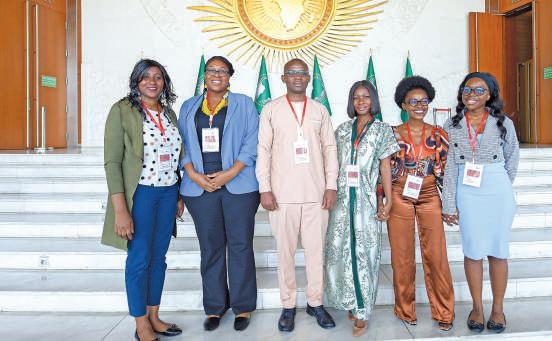
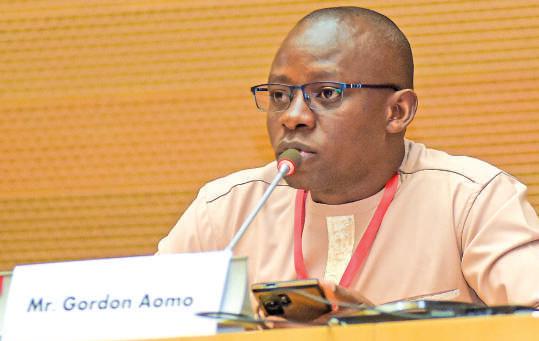
FAWE Champions Girls’ Participation in STEM at the AU Continental Conference
From November 26–28, 2024, FAWE proudly participated in the Continental Conference on Transforming STEM in Africa, organized by the African Union Commission (AUC) and UNESCO in Addis Ababa, Ethiopia. Held under the AU’s 2024 Year of Education theme, “Transforming Education in Africa,” the conference brought together policymakers, development partners, educators, and civil society organizations to reimagine STEM education as a driver for Africa’s future.
With the theme “Transforming STEM in Africa,” the conference reaffirmed education as a fundamental human right and a public good. It underscored the urgent need to reform curricula, strengthen teacher capacities, expand access to quality learning environments, and tackle gender disparities in STEM fields.
FAWE, represented by a strong delegation led by Ms. Teresa Omondi-Adeitan, Deputy Executive Director and Head of Programmes, played an active role throughout the conference. Ms. Omondi-Adeitan delivered opening remarks for Track 2 discussions on “Strengthening the Foundation of STEM Education,” calling for bold and inclusive action to expand girls’ participation in STEM.
Collectively, we have the power to reimagine Africa’s future. Let us build a STEM ecosystem that is inclusive, equitable, and capable of addressing the pressing challenges facing our continent. Let us turn dreams like Amina’s into reality,” — Teresa OmondiAdeitan, Deputy Executive Director, FAWE Africa
FAWE’s team, including Fraciah Kagu (Advocacy Officer) and Gordon Aomo (Senior Knowledge Management Officer), also shared best practices and lessons from FAWE’s gender-responsive education models, particularly how interventions like Tuseme, Centers of Excellence, and Gender Responsive Pedagogy (GRP) have opened pathways for girls into STEM across Africa.
The conference culminated in the adoption of the Addis Ababa Communiqué on Transforming STEM in Africa, which outlines commitments to:
• Expand early exposure to STEM and reform education curricula
• Strengthen teacher development for gender-sensitive STEM teaching
• Foster innovation and entrepreneurship
• Address gender stereotypes and ensure inclusive environments for girls and marginalized learners
• Boost public and private sector investments in STEM research and development
FAWE’s participation underscored its role as a leading advocate for gender equality in education and innovation. As Africa prepares to leverage the power of its youth demographic, FAWE remains steadfast in ensuring that girls are not left behind in the future of STEM.
FAWE Senior Knowledge Management Officer Mr. Gordon Aomo with fellow panelists at the STEM Conference in Addis Ababa, Ethiopia.
Mr. Gordon Aomo making his presentation at the conference.
KEEP THEM SAFE: FAWE’s Commitment to Ending GBV in Schools and Communities
From November 25 to December 10, 2024, during the 16 Days of Activism Against Gender-Based Violence, FAWE and its 34 chapters launched the Keep Them Safe online campaign to raise awareness on gender-based violence (GBV) and amplify efforts to end violence in schools and communities. The campaign, suported by the Break Free! Programme, provided an opportunity to disseminate key findings from the Together for Girls program, which focused on school-related gender-based violence (SRGBV).
Findings from the program revealed that 1 in 3 girls and 1 in 5 boys experience GBV before turning 18. This alarming statistic underscored the urgent need for intervention. FAWE’s chapters actively engaged in the campaign by sharing insights from their respective countries, shedding light on the realities of GBV in different contexts, and calling on stakeholders to intensify efforts in combating violence.
Dr. Martha Muhwezi, FAWE’s Executive Director, emphasized the importance of collective action, stating, “Ensuring the safety of children is a shared responsibility. We must work together—governments, educators, parents, and communities—to build a world where every child can learn in a safe and supportive environment.”
The campaign also leveraged the collective voice of FAWE alumni across the network, including a powerful message from Wendy Muzite, Chairperson of the FAWE Alumni Network, who urged stakeholders to take action: “Ending GBV requires more than conversations; it demands commitment, accountability, and concrete action from all of us.”
A key highlight of the campaign was a webinar held under the theme: Unite to End Violence Against Women. This virtual discussion brought together experts, educators, and advocates to explore sustainable solutions for preventing and responding to GBV in schools and communities. The dialogue reinforced the idea that eliminating violence is a shared responsibility that requires commitment from
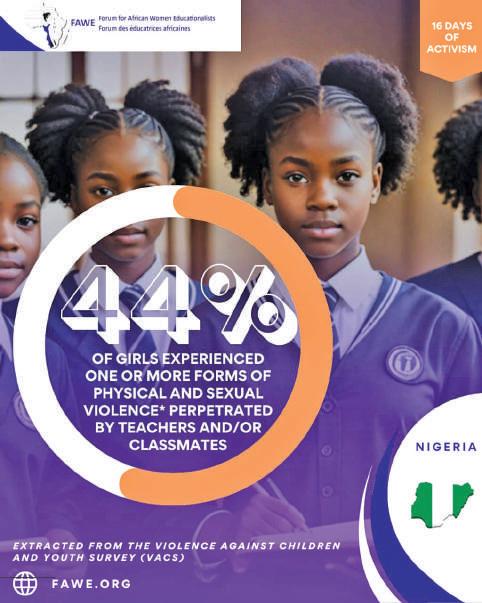
all sectors of society.
Throughout the campaign, FAWE emphasized a central message: Their safety is our responsibility. Parents, teachers, governments, and community members all play a vital role in ensuring that children grow up in safe and supportive environments, free from violence and discrimination.
The Keep Them Safe campaign reaffirmed FAWE’s commitment to advocating for safe learning spaces and strengthening institutional mechanisms to protect children from harm. By fostering partnerships, enhancing awareness, and equipping stakeholders with the right tools, FAWE continues to champion a future where every girl and boy can pursue their education without fear.

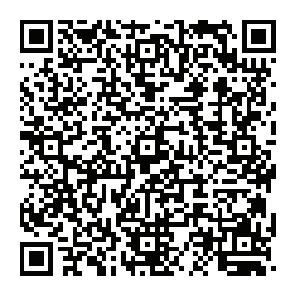
FAWE Champions Girls’ Education at the 81st Ordinary Session of the ACHPR
The Forum for African Women Educationalists (FAWE) proudly participated in the 81st Ordinary Session of the African Commission on Human and Peoples’ Rights (ACHPR), held from 17 October to 7 November 2024 in Banjul, The Gambia. The session gathered governments, civil society organizations, and human rights advocates to reflect on the state of human rights across Africa. Anchored on the African Union’s 2024 theme—“Educating an African Fit for the 21st Century”—discussions emphasized the urgent need for inclusive, lifelong, and rights-based education systems.
For the first time, FAWE delivered a formal statement before the Commission—a historic moment made possible by its recent accreditation as an Observer Organization to the ACHPR. This status marks a major milestone for FAWE’s advocacy work, granting the organization a formal platform to influence human rights discourse and push for accountability on girls’ education at the continental level.
In her address to the Commission, Ms. Teresa OmondiAdeitan, FAWE’s Deputy Executive Director and Head of Programmes, spotlighted persistent barriers to education for girls and young women. These include poverty, child marriage, school-related gender-based violence (SRGBV), and limited access to sexual and reproductive health (SRH) information. She called on state parties to:
• Scale up financing for education, particularly for girls in marginalized communities
• Enforce school re-entry and retention policies for teenage mothers
• Integrate comprehensive sexuality education to address SRGBV
• Ensure education access for displaced learners and children with disabilities
FAWE also reaffirmed the importance of Article 17 of the African Charter on Human and Peoples’ Rights and Article 12 of the Maputo Protocol, which guarantees women and girls the right to education and training.
The session concluded with strengthened commitments from member states and stakeholders to make education a lived right for every African child. FAWE’s participation underscores its role as a leading voice
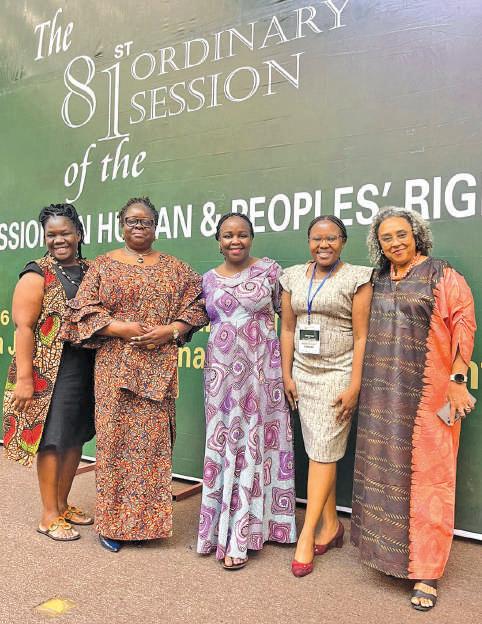
left) The FAWE team at the ACHPR Conference. Programme Officer, Ms. Carolyne Datche, Senior Programme Officer Ms. Emily Gumba, Ms. Teresa Omondi-Adeitan, Deputy Executive Director and Head of Programmes FAWE Africa, Ms. Fraciah Kagu, Advocacy and Partnerships Officer and Mrs. Yadicon Njie-Eribo, National Chapter Coordinator, FAWE Gambia.
for gender equity in education—and its Observer Status positions the organization to hold duty bearers accountable, influence policy reform, and push for systemic change across the continent.
Poverty, child marriage, school-related genderbased violence (SRGBV), and limited access to sexual and reproductive health (SRH) information are persistent barriers to education for girls and young women. Ms. Teresa Omondi-Adeitan
(From
Gender Equality in Education: FAWE’s Leadership in the CESA Girls and Women’s Education Cluster
The African Union’s Continental Education Strategy for Africa 2016–2025 (CESA 16–25) is a key pillar of Agenda 2063, Africa’s vision for inclusive and sustainable development. As a dynamic and flexible framework, CESA promotes collaboration between national, regional, and continental actors to accelerate educational transformation. To coordinate action and enhance impact, the African Union established thematic clusters—communities of practice led by institutions with technical expertise in specific areas of education.
FAWE, in collaboration with the African Union International Centre for Girls and Women’s Education in Africa (AU/CIEFFA), proudly cochairs the CESA Girls and Women’s Education Cluster. This position not only reflects FAWE’s long-standing commitment to gender equality in education, but also its growing role in shaping policy, amplifying regional dialogue, and ensuring accountability on girls’ education outcomes across the continent.
As co-lead, FAWE has used this platform to mobilize stakeholders—including governments, civil society, and development partners—to advance gender-responsive approaches in education systems. Through the cluster, FAWE has championed efforts to improve girls’ access to quality education, address barriers such as early marriage and school-related gender-based violence, and promote policies that support retention, transition, and achievement for girls at all levels of education.
By anchoring gender equality at the heart of CESA implementation, FAWE’s leadership ensures that girls’ and women’s education remains a top priority in continental education planning and reform. The cluster serves not only as a coordination mechanism but as a space for sharing innovations, tracking progress, and reinforcing collective accountability toward the goals of Agenda 2063.
Prioritizing the Rights
FAWE participated in both the 24th and 25th CSO fora on the margins of the African Committee of Experts on the Rights and Welfare of the Child (ACERWC) in Maseru, Lesotho. At the convening, FAWE highlighted the need for AU member states to protect the rights of girls and women across Africa, which was adopted in the outcome statements. In addition, there was an establishment of a sub-committee on education to further strengthen the rights of girls and promote education across the continent. The African Commission on People and Human Rights (Banjul Commission), and the African Committee of Experts on the Rights and Welfare of the Child (ACERWC). FAWE holds observer status with both Committees and presented the status of girls’ education calling for the implementation of policies that uphold the rights to education.
A number of recommendations were fronted at the committee. These included:
1. Establish a dedicated Working Group dedicated to Education to enhance Multi-Stakeholder Collaboration: FAWE recommended that the committee establishes a dedicated working group focused on education to address the pressing challenges facing girls across Africa.
2. Enhanced Education Financing – Government increased funding for education to 20% of National budgets.
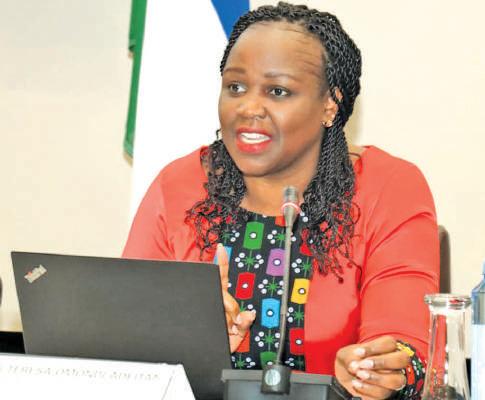
Ms. Teresa Omondi-Adeitan, Deputy Executive Director and Head of Programmes FAWE Africa.
and Welfare of the African Child
3. Implementation of Comprehensive Policy Frameworks for School Re-entry: State members should be accountable and show deliberate effort to enforce implementation of re-entry policies particularly for those affected by nonaffordability of school hidden cost and nonscholar materials, SRGBV, teenage pregnancies, or child marriage.
4. Strengthen Prevention Measures Against SRGBV and Enhance Education on Sexuality: Initiate comprehensive training for educators and school staff on sexuality education to prevent early pregnancy, gender sensitivity, anti-bullying, and violence prevention and educate communities on the importance of safe educational environments and the rights of girls.
5. Adopt demonstrative interventions to enhance gender equality in Education: FAWE has tried and tested various models that have enhanced education for girls in Africa, especially those that contribute to retention of girls in school. FAWE urged African governments to adopt interventions such as Gender Responsive Pedagogy (GRP) aimed at enhance teaching methodologies, learning materials and quality of teachers.
FAWE also applauded ACERWC’s efforts in developing a General Comment on the right to education and
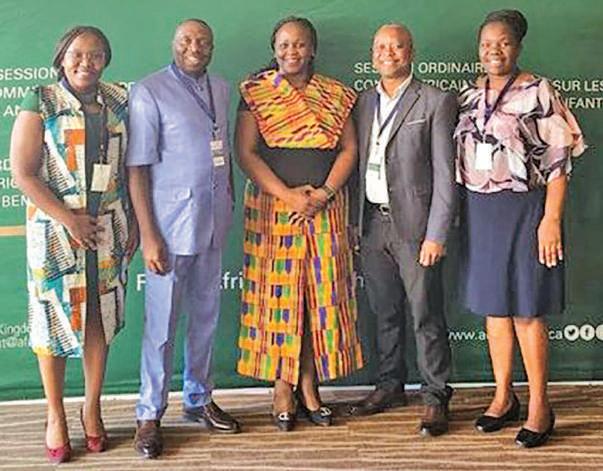
FAWE delegation at the ACERWC convening in Maseru, Lesotho. (From left) Ms. Fraciah Kagu, Advocacy and Partnerships Officer, Mr. Costern Kanchele, Executive Director, FAWE Zambia, Ms. Teresa Omondi-Adeitan, Deputy Executive Director and Head of Programmes FAWE Africa, Mr. Wesley Chabwera, National Chapter Coordinator FAWE Malawi and Programme Officer, Ms. Carolyne Datche.
reiterated its commitment to advocating for the rights of African girls. FAWE is a firm believer of education being the greatest equalizer and calls for shared responsibility to create a future where every girl can realize her full potential.
FAWE Champions Girls’ Education at CIES 2024 in Miami
The 2024 Comparative and International Education Society (CIES) Annual Conference was held from March 10 to 14 in Miami, Florida, centering on the theme “The Power of Protest.” This gathering brought together educators, researchers, and activists to explore the role of protest in shaping educational landscapes. FAWE was represented by the Executive Director, Dr. Martha Muhwezi and Senior Advocacy and Partnerships Officer who actively participated in the conference, contributing to discussions on advancing girls’ and women’s education in subSaharan Africa. Dr. Martha participated in a panel
discussion under the Coalition of Good Schools; Voices from the Global South while Catherine shared case studies by FAWE in regard to collective action to champion girls education in Africa.
Both Dr. Martha and Catherine shared insights from our initiatives, highlighting strategies to overcome educational barriers and promote gender equity across the continent. Their involvement underscored FAWE’s commitment to empowering African women through education and fostering collaborative efforts within the global educational community.
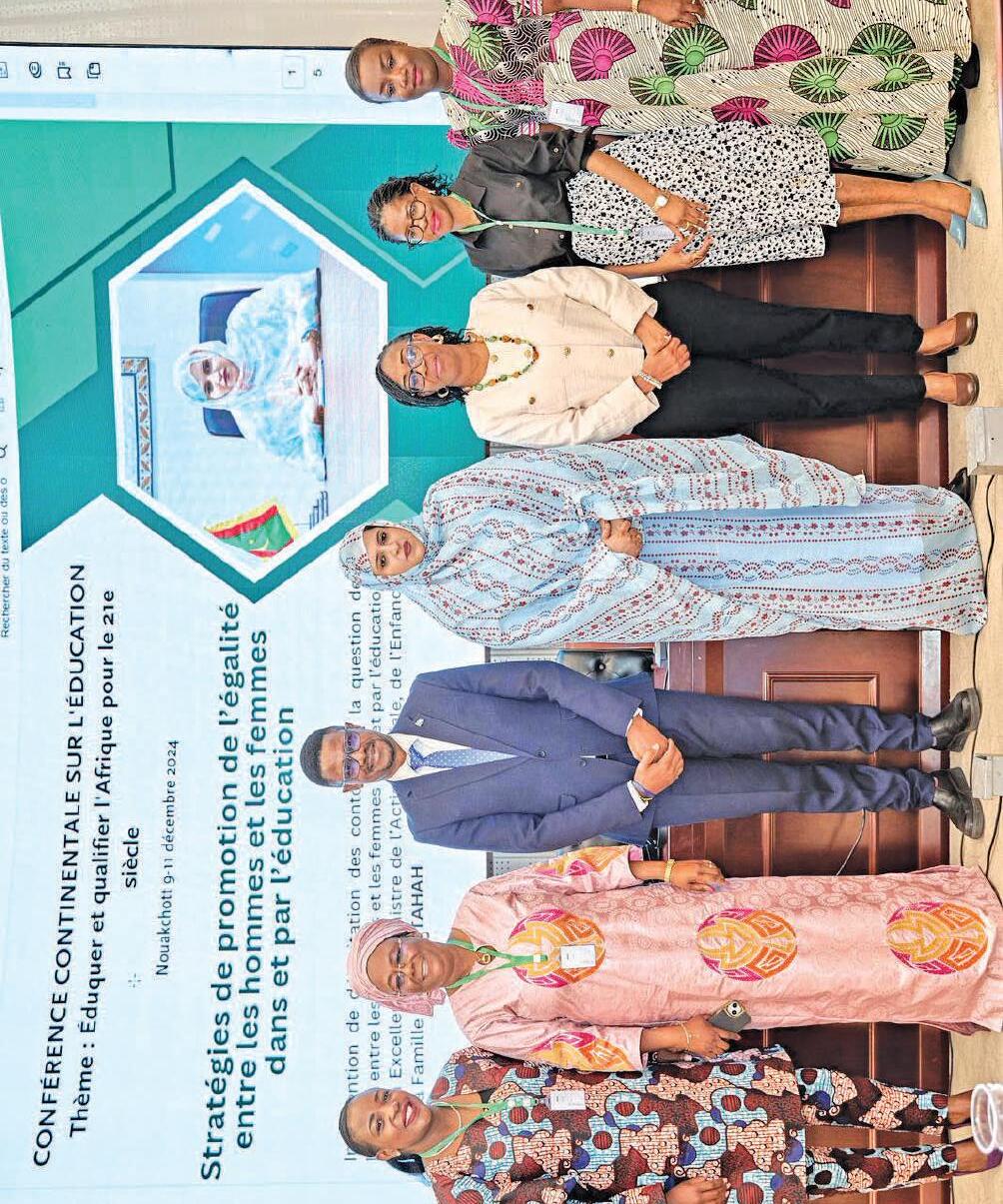
FAWE convenes a high-level dialogue with ministers of education across Africa during the Continental Education Conference in Nouakchott, Mauritania. (From left) Senior Advocacy and Partnerships Officer Ms. Catherine Asego, Mme. Alima Boukary Marcos, Education Specialist, GCIUNGEI, Hon. Sarjoh Aziz Kamara, Deputy Minister of Technical and Higher Education, Sierra Leone, Hon. Savia Mint N’Tahah, Minister of Social Work, Childhood and Family, Mauritania, Mrs. Simone Yankey-Ouattara, Coordinator of the African Union/ International Centre for Girls and Women’s Education (AU/CIEFFA), and Dr. Georgette Brou Coulibaly, Expert, MENA Gender Equality and Equity Committee.
Shaping Africa’s Education Future: FAWE at the AU Continental Education Conference
In December 2024, FAWE joined the African Union Commission, UNICEF, education ministries, and partners in Nouakchott, Mauritania, for the Continental Education Conference, marking the AU Year of Education. Held under the theme “Educate and Skill Africa for the 21st Century,” the forum was a call to action for inclusive, quality, and gender-responsive education systems.
FAWE’s delegation, led by Catherine Asego Senior Advocacy and Partnership Officer and Naomi Kamitha, Programme Officer, showcased its leadership as co-
Key takeaways included:
lead of the AU Cluster on Women and Girls’ Education. A highlight was FAWE’s contribution on Gender Responsive Pedagogy (GRP) during a panel on teacher professional development, where successes in Malawi and Tanzania were shared.
FAWE also co-led a session on equity in education alongside AUCIEFFA, UNGEI, and UNICEF, emphasizing the need to dismantle gender barriers, improve financing, and ensure safe learning spaces. The organization framed its interventions around girls’ education, positive masculinity, and youth engagement.
A growing demand for GRP integration into national teacher training; Alignment between FAWE’s strategy and the upcoming CESA 2026–2035 framework; Momentum for positioning FAWE as a research hub on girls’ education; The importance of engaging boys and alumni in promoting gender equity; Opportunities to scale FAWE’s models in education-in-emergency contexts.
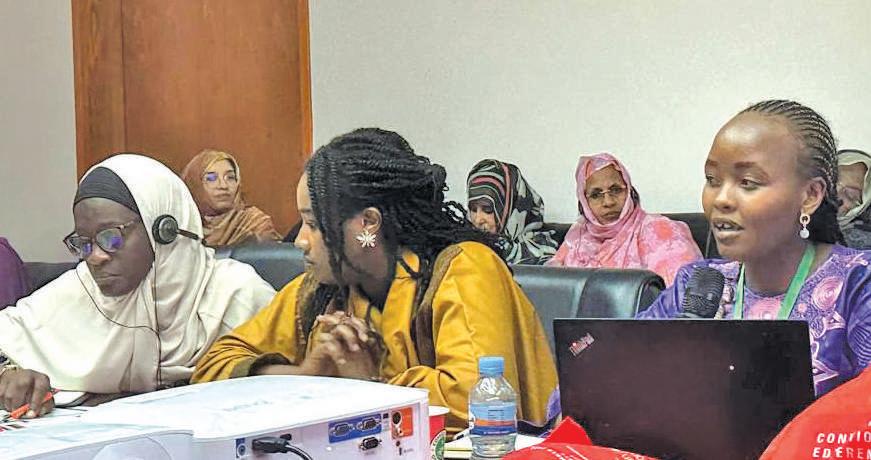
FAWE Programme Officer Ms. Naomi Kamitha (right) makes a presentation at the Continental Education Conference in Nouakchott, Mauritania.
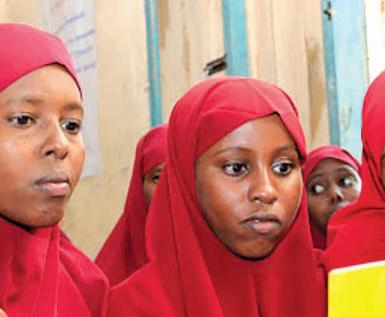
School students from Kenya read a report by the Ministry of Education, Kenya.
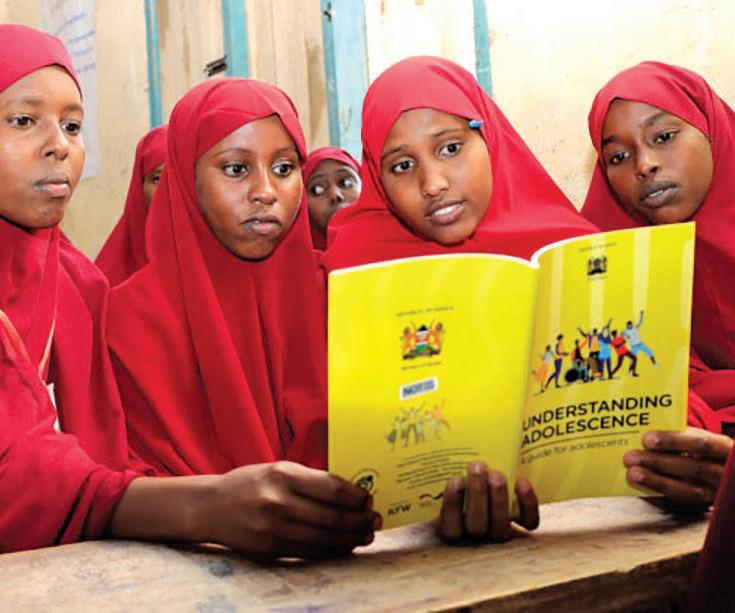
CHAPTER
Bringing Research to Life: Documenting Children’s Experiences in Ghana and Senegal
In a powerful effort to bridge research and real-life impact, FAWE partnered in 2024 with UNESCO’s Global Education Monitoring (GEM) Report team and the Association for the Development of Education in Africa (ADEA)—hosted by the African Development Bank—to support the Spotlight on Africa deep dive reports.
This collaboration focused on capturing the lived experiences of children in Ghana and Senegal as they begin their primary education journey. By following the stories of four young learners, the initiative set out to humanize the data presented in the Spotlight reports and shed light on what Foundational Literacy and Numeracy (FLN) looks like from the child’s perspective.
Through documentary-style storytelling, the project explores the barriers and breakthroughs these children face in attaining basic reading, writing, and numeracy skills. From access to quality instruction and learning materials to the influence of family, community, and school infrastructure—the realities revealed offer a compelling view into the early stages of education in West Africa.
By making research more relatable and accessible, this initiative supports broader advocacy goals: ensuring education systems respond to the needs of every learner and that policies and investments in FLN are grounded in the actual experiences of African children. For FAWE, this partnership is yet another example of how data and storytelling can work together to drive change.
Building Gender-Responsive Schools for Sustainable
Change
Despite education being a fundamental human right, access to quality learning remains deeply unequal in West and Central Africa—particularly for girls. Across the region, a significant learning crisis persists most 10-year-olds are unable to read and understand a simple text, and girls are disproportionately affected. While boys also face barriers, girls are more likely to be out of school from an early age, with exclusion
intensifying during adolescence due to gender-based discrimination, early marriage, and social norms.
In response to these persistent challenges, FAWE developed and implemented the Gender-Responsive Schools Model—a holistic approach aimed at promoting gender equality and improving girls’ learning outcomes. The model integrates gender-responsive school management, pedagogy, teaching and learning materials, safe and inclusive environments, and active community engagement.
To evaluate the model’s effectiveness, FAWE conducted a multi-country study across ten schools in four African countries using both qualitative and quantitative methods. The findings revealed that the model significantly contributed to girls’ retention, participation, and perseverance in school. However, the research also highlighted critical areas for improvement, particularly in remedial academic support, leadership development, menstrual hygiene management, and the availability of learning materials.
In parallel, FAWE conducted another study—“Gender Social Norms and Girls’ Education in West Africa: A Comparative Approach”—in Burkina Faso, the Democratic Republic of Congo (DRC), Sao Tomé and Principe, and Chad. The research aimed to deepen understanding of how gender norms influence education outcomes and to identify pathways for sustainable behavior change. Using life stories, focus group discussions, and surveys, the study identified several persistent barriers including:
• Household poverty versus the high cost of schooling
• Early marriage and teenage pregnancy
• Limited family support
• Disproportionate burden of domestic responsibilities on girls
Importantly, the study emphasized the need to integrate cultural specificities into the design and implementation of education policies to ensure their relevance and effectiveness.
Education in Crisis: Giving Refugee and Internally
Across Africa, conflict, climate disasters, and political instability are forcing millions of children out of school. From the war in Sudan to the displacement crises in the Democratic Republic of Congo, Mozambique, and the Sahel, the right to education is under siege. As refugee and internally displaced persons (IDP) camps swell with families fleeing violence and hardship, education—often the first casualty of crisis—is left in the shadows.
For displaced girls, the situation is even more dire. Many never return to school, face heightened risks of early marriage, gender-based violence, and
economic exploitation. The longer they are out of the classroom, the slimmer their chances of ever going back. The result? A lost generation, stripped of the opportunities that education could provide to break the cycle of poverty and displacement.
But even in these dire situations, hope remains. One initiative offering a practical, scalable solution is the GPE KIX Tuseme Project, a partnership led by FAWE, HERS-EA, and ACER-UK to adapt and implement gender-responsive education in refugee and IDP settings in Kenya, Uganda, and Ethiopia.
The Education Emergency: Numbers That Tell a Story
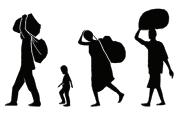
Africa hosts some of the world’s largest displaced populations, with over 40 million refugees and IDPs—half of whom are children.
Less than 50% of refugee children attend primary school; the number drops dramatically for secondary education, especially for girls.
40 million 50% 3%
Only 3% of refugee youth worldwide have access to higher education.
The education crisis in emergency settings is not just about access to schools. It is about the kind of education children receive and whether it equips them to navigate their realities, protect themselves, and build a future.
Displaced Children a Voice Through GPE KIX Tuseme
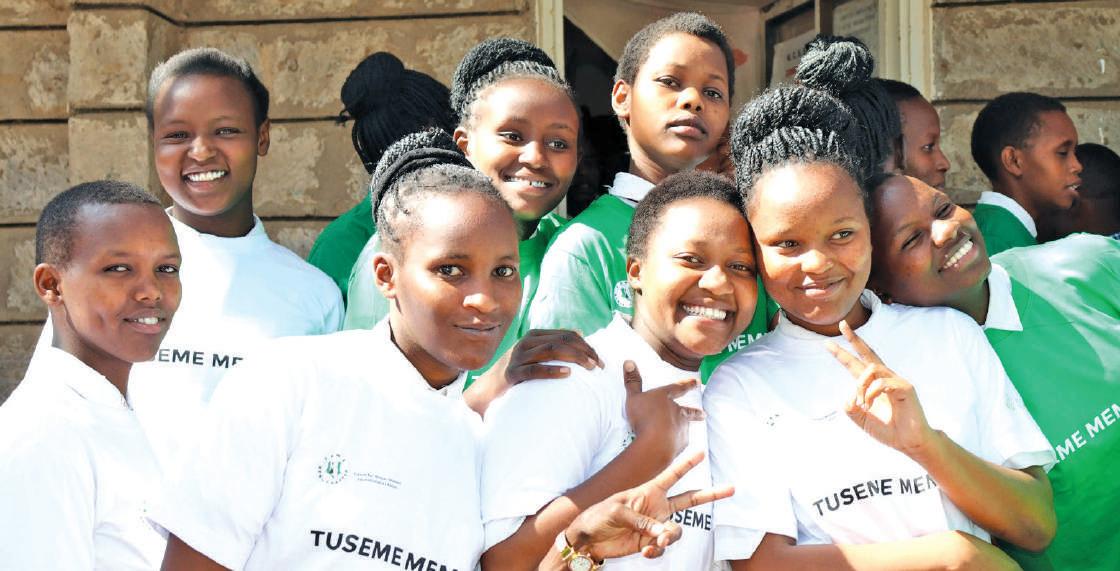
Tuseme:
A Voice in the Chaos
Tuseme, which means “Let us speak out” in Kiswahili, is a proven empowerment model that has helped thousands of young people across Sub-Saharan Africa develop critical thinking, leadership, and advocacy skills to fight for their right to education and gender equality.
• Now, FAWE is exploring how the Tuseme model can be adapted for refugee and internally displaced (IDP) communities—settings where instability, trauma, and cultural barriers often
Through the GPE KIX Tuseme Research Project, FAWE is investigating how the model can be effectively applied or modified to meet the unique needs of displaced learners.
silence young people, especially girls. Through the GPE KIX Tuseme Research Project, FAWE is investigating how the model can be effectively applied or modified to meet the unique needs of displaced learners.
• Using storytelling, drama, debate, and mentorship as core tools, the project seeks to:
• Assess how displaced youth can be empowered to speak out against gender-based violence and discrimination.
• Explore strategies to engage boys as allies in promoting gender equality in fragile environments.
• Equip teachers, parents, and local leaders with approaches to support girls’ education amid displacement.
• Build resilience and leadership skills among children, enabling them to advocate for their rights even during crisis.
Tuseme Club members from a school in Kenya.
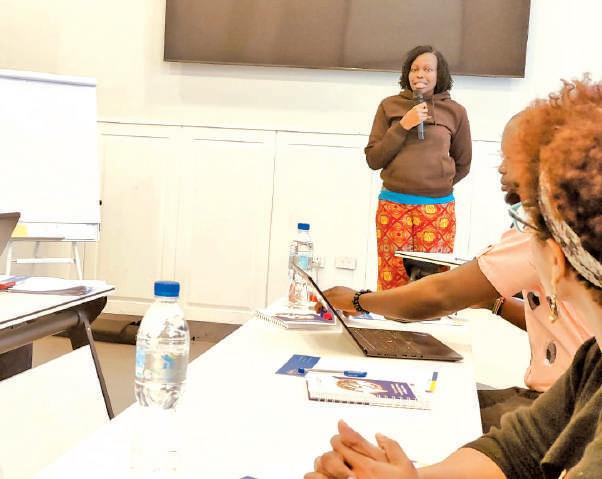
Lessons from the Field: What Works in Fragile Settings
During the first phase of the Tuseme Project, 12 schools across Kenya, Uganda, and Ethiopia piloted the model alongside other FAWE-led interventions, such as gender-responsive pedagogy and gendersensitive school infrastructure.
• Key lessons included:
Safe spaces for dialogue are critical. Joint discussions between boys and girls on issues like menstruation foster empathy and support.
• Parental engagement challenges restrictive norms. When parents are part of the conversation, girls are more likely to stay in school.
• Education must be flexible. Club schedules and locations need to accommodate the realities of displaced children, ensuring accessibility and safety.
• Long-term solutions must be institutionalized. Teacher turnover is high in crisis settings, making it crucial to integrate genderresponsive approaches into national education policies.
Beyond Tuseme: A Call for Holistic Solutions
While the GPE KIX Tuseme Project is making an impact, education in emergencies requires multi-pronged, systemic action:
• Governments must prioritize education funding for displaced populations.
• More investment is needed in teacher training for crisis-affected schools.
• Technology and flexible learning models can bridge education gaps for children in displacement.
• Stronger partnerships between NGOs, humanitarian agencies, and local communities can scale interventions like Tuseme across conflict zones.
Education is more than a tool for individual success—it is a lifeline in emergencies, a shield against exploitation, and the foundation for rebuilding societies.
As Africa continues to face conflicts, climate disasters, and forced displacement, we must act now to ensure that education remains a right—not a privilege—for every child, no matter where they come from. When young people find their voice, they don’t just survive the crisis—they change the future.
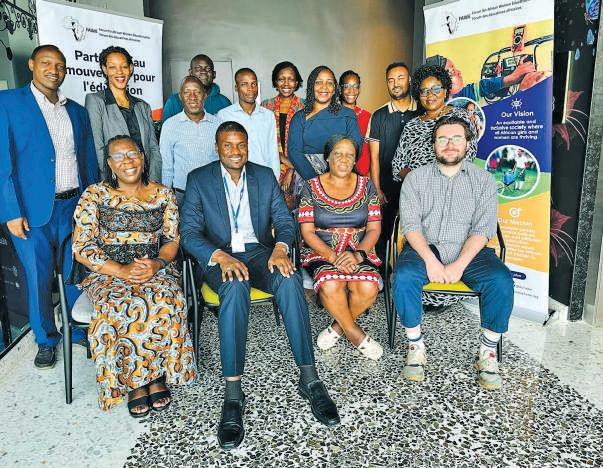
FAWE Programme Officer Ms. Rose Atieno makes a presentation at the regional GPE KIX Tuseme Programme meeting in Addis Ababa, Ethiopia.
A group photo consisting of all the GPE KIX Tuseme Programme implementing partners.
Strengthening Knowledge Systems: Laying the Foundation for a Research Hub on Girls’ Education in Africa
Research and evidence generation remain central to FAWE’s mission of transforming education systems to be more gender responsive. In 2024, FAWE deepened its focus on knowledge systems through a key collaboration with the Bill and Melinda Gates Foundation, aimed at establishing a strong foundation for FAWE to emerge as a research hub on girls’ education in Africa.
With this support, FAWE initiated the development of a comprehensive research strategy—a critical step toward aligning its evidence-generation efforts with advocacy and program delivery. This included operationalizing the strategy’s implementation plan and mapping out key institutional partners essential to advancing the research agenda.
A cornerstone of this initiative was the partnership with the Center for Research Institute in East Africa (CRI-EA). Through this collaboration, FAWE codeveloped tailored research strategies and enhanced its internal capacity on knowledge management, positioning the organization to lead on genderfocused research across the continent.
This marks a significant milestone in FAWE’s journey toward becoming a continental knowledge leader in girls’ education—one that not only generates data but transforms it into action for systemic change.
The FAWE School Related Gender Based Violence (SRGBV) Manual
FAWE’s School-Related Gender-Based Violence (SRGBV) Manual serves as a comprehensive toolkit designed to equip educators, school administrators, and key stakeholders with the knowledge and skills to prevent and respond to gender-based violence in and around school settings. The manual aims to foster safer, more inclusive learning environments by strengthening school systems and accountability mechanisms.
Specifically, the manual seeks to:
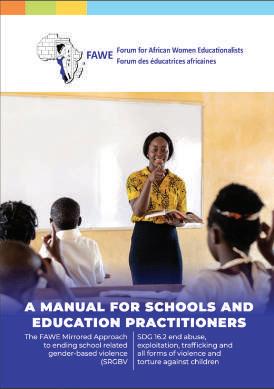
1. Identify prevailing forms and root causes of SRGBV within educational settings.
2. Develop and integrate effective, school-based interventions that address these drivers.
3. Monitor implementation progress, evaluate the effectiveness of interventions, and refine strategies to ensure continued improvement.
The model targets both duty bearers —including school administrators, teachers, parents, and community leaders—as well as rights-holders, specifically learners, recognizing the need for a holistic, community-driven approach to eliminating SRGBV.
The SRGBV manual was officially launched in 2024 during the Gender is My Agenda Campaign (GIMAC) conference in Accra, Ghana. The launch provided a high-level platform to spotlight the need for targeted policies and practical tools to address SRGBV across Africa.
In addition to its regional rollout, the manual has been piloted in Zimbabwe, Nigeria, and Malawi under Data for Change Phase II, a collaborative initiative between FAWE and Together for Girls. These pilot programmes are generating valuable data and insights to inform future scale-up and integration of SRGBV prevention and response mechanisms within national education systems. Through this manual, FAWE continues to advocate for transformative education environments where every learner— especially girls—can feel safe, supported, and empowered to reach their full potential.
Scan to Access the SRGBV Manual.
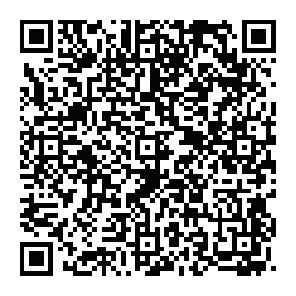
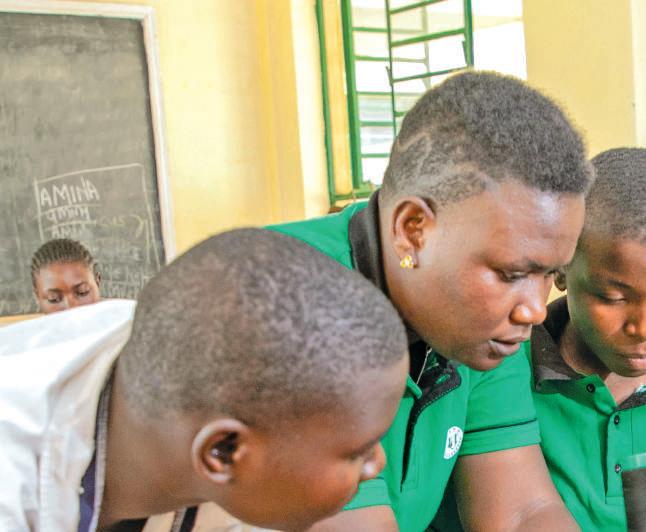
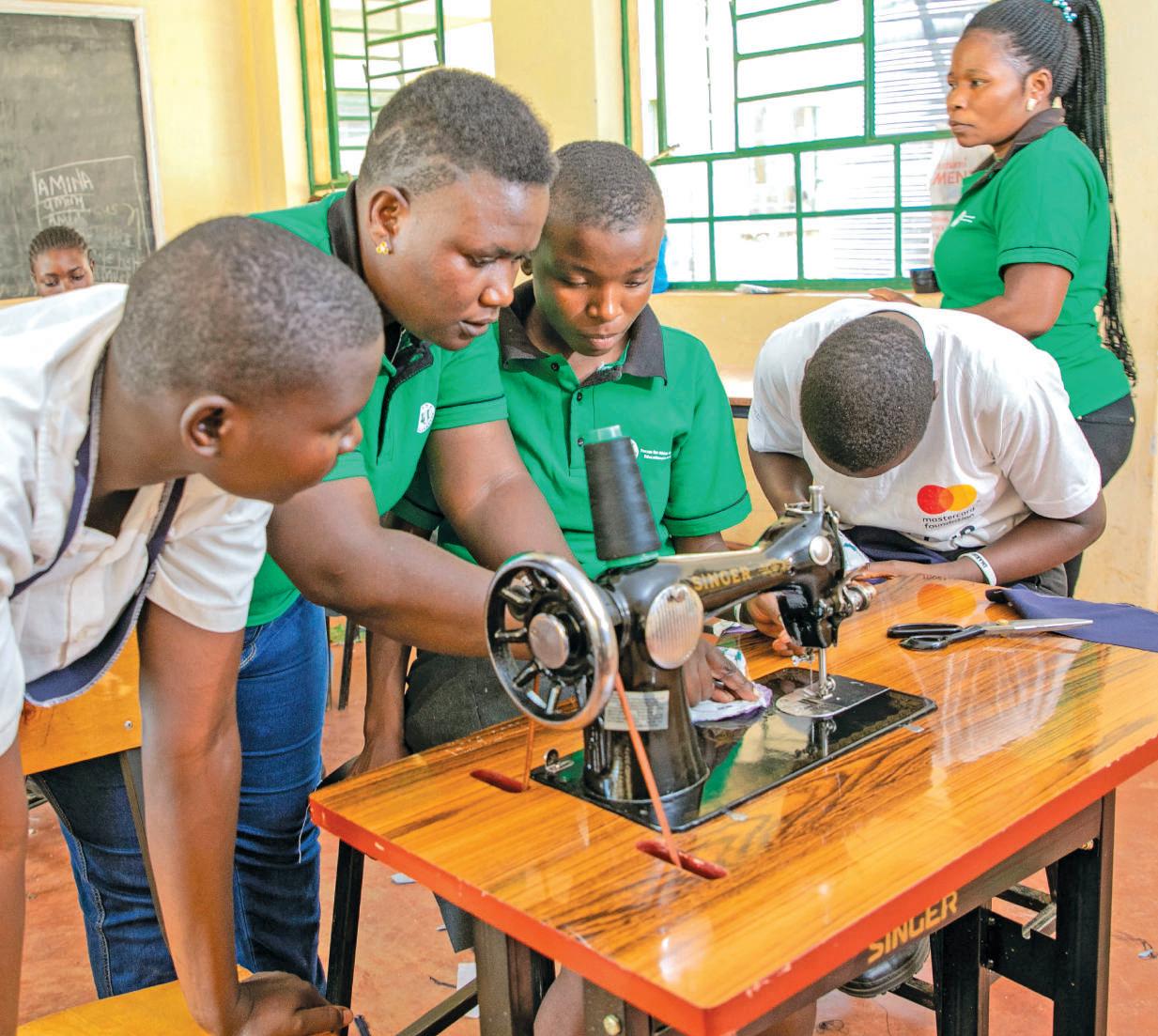
CHAPTER
Students participate in a needlework lesson activity in Kenya.
FAWE’s Models: The Driving Force Behind Access to Quality Education,
Training and Well-being of Young Africans
In the pursuit of excellence in promoting gender equality in education, FAWE employs a variety of demonstrative interventions which include Gender Responsive Pedagogy (GRP), STEM, Centers of Excellence and Tuseme (Swahili for Let’s Speak Out).
For over three decades, FAWE’s models have been instrumental in the journey of emancipating the African girl from the shackles of illiteracy, lack of education and miseducation. These models ensure that our beneficiaries receive a holistic education are well prepared for the world of work and to face life in general. Get to know more about our FAWE models below:
Gender Responsive Pedagogy (GRP)
Gender Responsive Pedagogy (GRP) equips educators with the knowledge, skills, and attitudes to make their teaching practices inclusive and responsive to the specific learning needs of both girls and boys. Recognizing that traditional teaching methods often unconsciously reinforce gender bias, GRP addresses both content and pedagogy—ensuring classroom processes promote equity and learning outcomes.
With support from UNICEF, FAWE digitized GRP and rolled it out in 15 countries. In 2024 alone, 551 individuals enrolled in the GRP course, with 205 completing the full training. A total of 1,212 teachers
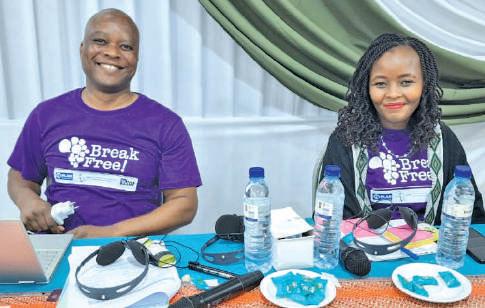
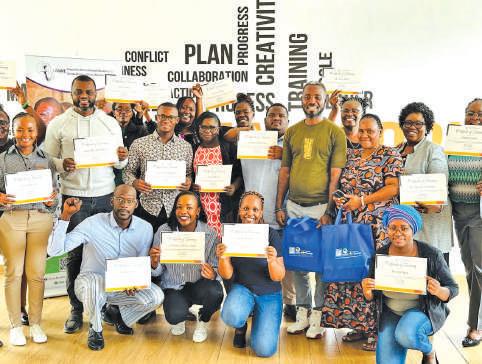
and stakeholders were trained from across FAWE chapters, including Zimbabwe, Ghana, Uganda, Eswatini, Liberia, Malawi, Tanzania, Zanzibar, Ethiopia, Zambia, and Kenya. As a result, action plans were developed in over 100 schools to embed genderresponsive practices.
In Rwanda, the digitized GRP training was delivered to a wide range of actors—from ministry officials to secondary school teachers—reaching approximately 4,000 educators. GRP remains a flagship FAWE model and a key lever for achieving gender equity in classrooms across the continent.
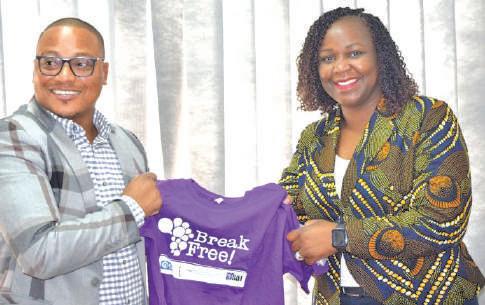
Staff from FAWE RS and FAWE Kenya pose with their certificates after a three-day GRP training in Nairobi, Kenya.
Mr. Wesley Chabwera, National Chapter Coordinator for FAWE Malawi with Ms. Naomi Kamitha, Programme Officer FAWE at a GRP training session held in Mozambique.
Ms. Teresa Omondi-Adeitan, Deputy Executive Director and Head of Programmes FAWE Africa with Dr. José Sousa, the National Director of the Department of the Transversal Affairs of the Ministry of Education Mozambique.
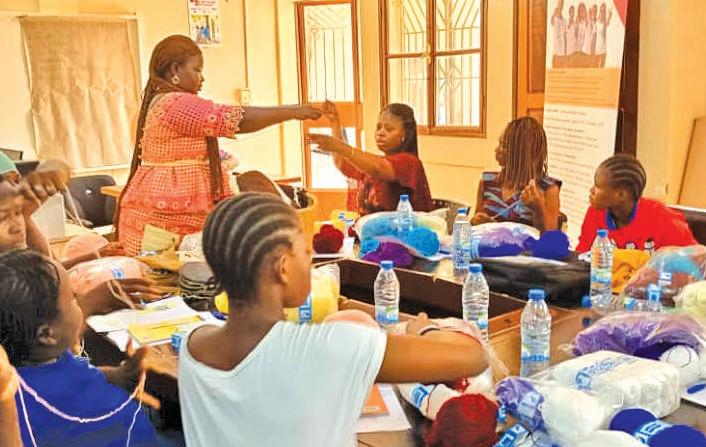
Tuseme: Let Us Speak Out
Tuseme uses theatre-for-development techniques to empower young people, particularly girls, to speak out against barriers that hinder their education. It builds leadership, self-confidence, and life skills while fostering positive masculinities and peer solidarity.
In 2024, the Tuseme model was implemented and scaled across numerous countries. FAWE Kenya, through the Imarisha Msichana Programme, supported 160 schools with ICT equipment, enabling over 10,000 students to access SRHR information and revise coursework. In Rwanda, university-based Tuseme clubs facilitated the reintegration of 11 street children into education and led awareness campaigns on early pregnancy and GBV.
Additional scale-ups were recorded in Benin, where a club secured materials for a new metal workshop, and in Burkina Faso, where club members showcased tailoring skills and used proceeds to sustain club
activities. Tuseme was introduced or revived in schools across Zanzibar, Mozambique, Namibia, Mali, Burkina Faso, Zimbabwe, Benin, and the DRC, with over 15,000 students actively engaged in Tuseme activities continent-wide.
Centres of Excellence (CoE)
FAWE’s Centres of Excellence transform ordinary schools into inclusive and supportive learning environments that meet the academic, physical, and psychosocial needs of all learners. These schools offer trained teachers, gender-aware materials, and community support structures that contribute to improved retention and performance.
In 2024, FAWE Sierra Leone established CoEs in 27 schools, allowing 13,500 marginalized girls to access education. In Tanzania and Zanzibar, 243 educators and stakeholders were sensitized on integrating SchoolRelated Gender-Based Violence (SRGBV) into the CoE approach.
Ms. Natacha Danfourou of FAWE Burkina Faso (receiving thread) joins a group of school girls for a Mothers Club activity.
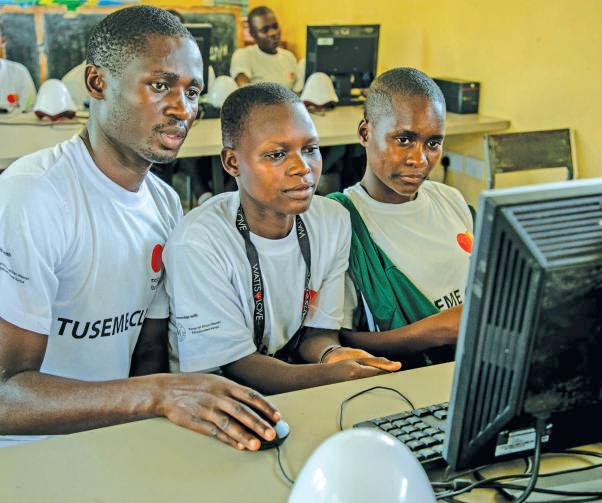
Science, technology, engineering, and mathematics(STEM)
FAWE’s STEM model addresses the persistent gender gap in science, technology, engineering, and mathematics. The approach includes training educators in gender-responsive STEM teaching, engaging policymakers, and sensitizing communities on the importance of girls’ participation in STEM.
In Senegal, with support from the Housing Bank of Senegal, FAWE provided supplementary STEM classes to 150 vulnerable girls. These targeted interventions have enhanced performance and interest in STEM subjects, preparing more girls to pursue careers in science and innovation.
Mothers Clubs
Mothers’ Clubs are community-based support systems that mobilize resources, offer mentorship, and champion girls’ education—especially for teenage mothers and vulnerable girls.
In 2024, FAWE Kenya supported Mothers’ Clubs in five counties, helping young mothers stay in school through mentorship and life-skills training, such as making
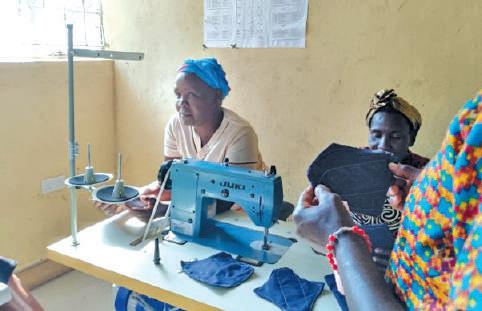
reusable sanitary pads. In The Gambia, Mothers’ Clubs were set up in seven regions to address teenage pregnancy and promote school re-entry.
FAWE Zambia, in collaboration with CAMFED, engaged 162 community leaders and advocated for the adoption of statutory re-entry policy instruments. These efforts have helped bridge the gap between schools and communities, ensuring girls receive the support they need to complete
Technical Vocational Education and Training (TVET)
FAWE recognizes TVET as a vital pathway for girls to acquire practical skills and economic independence. In 2024, FAWE Liberia hosted a GRP training for TVET institutions, forming a technical working group to integrate GRP and Tuseme into TVET curricula. In Somalia, FAWE renovated a greenhouse training center in Burtinle, enhancing youth resilience through agricultural skills development.
Addressing School-Related Gender-Based Violence (SRGBV)
FAWE’s SRGBV model provides educators and school leaders with tools to identify, prevent, and respond to violence in and around schools. In 2024, 111 participants from Zimbabwe, Nigeria, Kenya, and Malawi were trained using FAWE’s SRGBV manual. The model has contributed to improved student safety, re-entry of teenage mothers, and increased enrolment. Ethiopia also trained youth advocates to address early marriage and conflict-related barriers to education.
A computer teacher engages students in a computer laboratory in Kenya.
Members of Mothers Clubs attending a session in Kenya.
Giving Back with Purpose: FAWE Alumni Build Legacy
At the heart of FAWE’s mission is the belief that education is not just about personal achievement—it is about empowering young people to transform their communities. This spirit of giving back is a central pillar of FAWE’s work, and it continues to shine through the actions of its alumni network.
During a recent mission to Ethiopia, the FAWE Regional Office team, together with representatives from national chapters, had the privilege of visiting Sedekias Home for the Elderly in Adama, a town just over an hour from Addis Ababa. This remarkable assisted living facility was founded by FAWE Ethiopia alumni, who have taken the values of leadership and service beyond the classroom to make a lasting impact in society.
The Sedekias Home is not only a sanctuary for elderly citizens—it is a thriving example of sustainability and community-driven innovation. On the premises, cattle are raised to generate income and support the home’s operations, ensuring long-term resilience and dignity for its residents. During the visit, the team witnessed a special moment: one of the cows gave birth. In a beautiful tribute to FAWE’s work, the newborn calf was named Tuseme, after FAWE’s flagship empowerment model that inspires young people to speak out and lead change.
As part of the visit, the FAWE delegation also planted trees across the compound—each chapter and the Regional Secretariat contributing to a collective act of
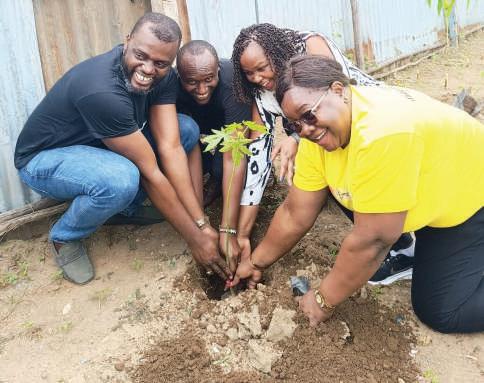
(From left) Mr. Kossi Tsenou, Senior Communication Officer, Mr. James Njuguna, Knowledge Management Officer, Ms. Teresa Omondi-Adeitan, Deputy Executive Director and Head of Programmes and Ms. Emily Gumba, Senior Programme Officer plant a tree at the Sedekias Home.
hope and legacy. These trees are a living symbol of FAWE’s deep-rooted presence and its commitment to nurturing environments of care, equity, and transformation.
The Sedekias Home stands as a powerful testament to what happens when young women and men are given the tools to lead—and the heart to give back. Through initiatives like this, FAWE’s impact continues to grow, one community at a time.
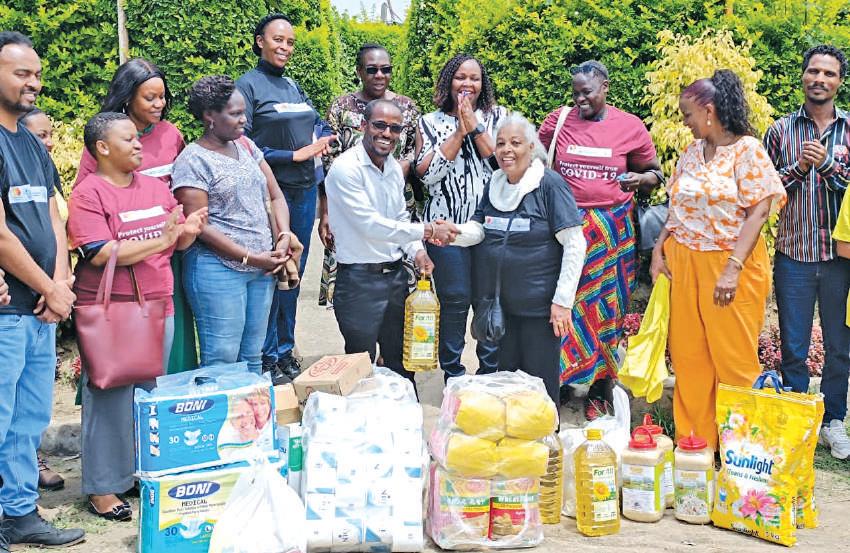
FAWE staff from RS, FAWE Ethiopia, FAWE Zimbabwe, FAWE Uganda, FAWE Rwanda and FAWE Tanzania hand over food stuff and essentials to the head of Sedekias Home in Addis Ababa, Ethiopia.

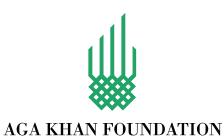
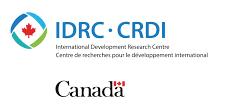
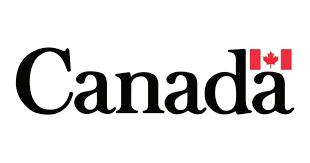


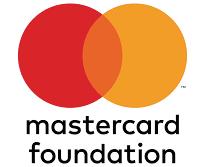


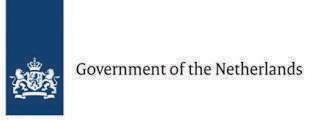

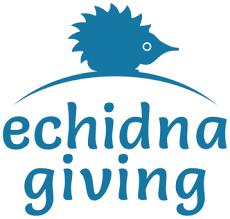
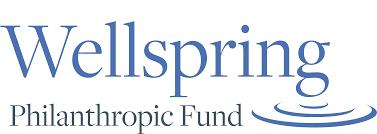



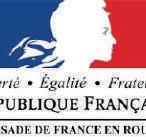
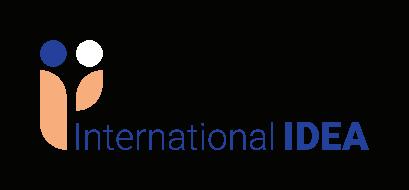
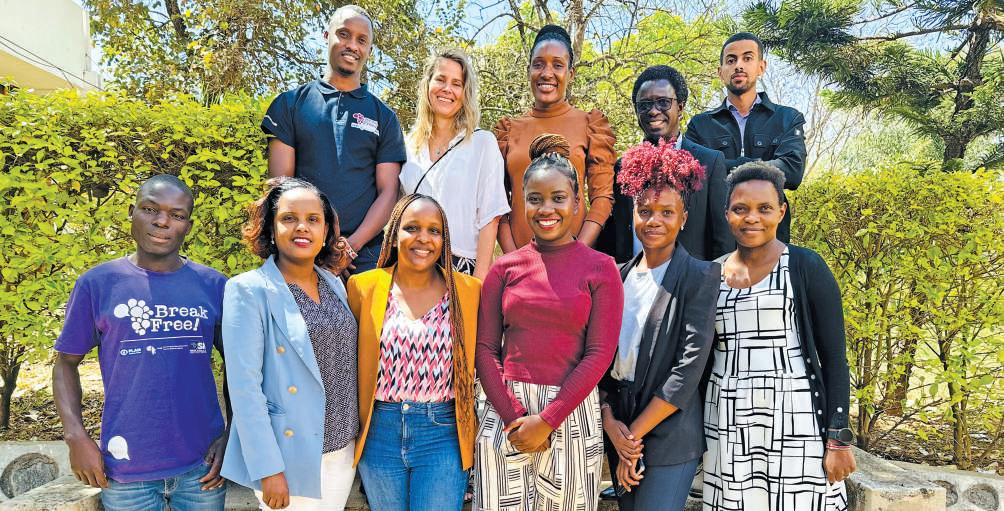
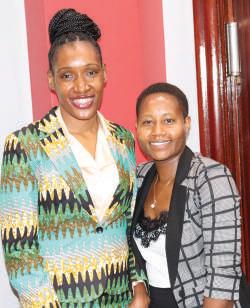
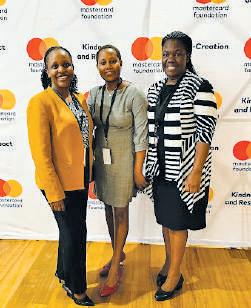
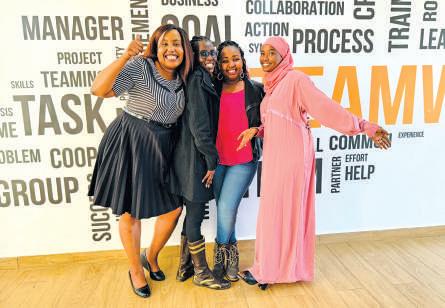
and
left) FAWE Communication Officer Ms. Emily Buyaki, Finance Officer Ms. Lilian Bett and Programme Officer Ms. Carolyne Datche at the Mastercard Foundation Partners Convening Meeting in Nairobi, Kenya.
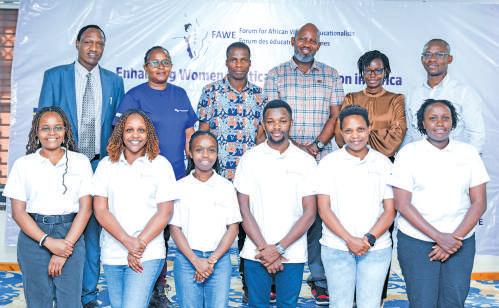
left) Ms. Naomi Susa, Executive Assistant to the Executive Director, Ms. Joan Too, IT and Admin Assistant, Ms. Grace Wambua, Senior Human Resources Officer and Ms. Fatimata Kane, Programme Officer at the FAWE GRP training in Nairobi, Kenya.
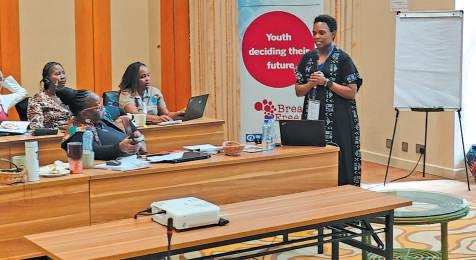
Ms. Anne Motanya, Knowledge Management Officer makes a presentation at the FAWE annual review and planning meeting in Naivasha, Kenya.
Members of the Regional Break Free! Consortium take a photo at the Annual meeting in Lilongwe, Malawi.
FAWE Finance Officers Ms. Catherine Mwangi (left)
Ms. Lilian Bett (right) at the launch of the FAWE Strategic Plan in Lusaka, Zambia.
FAWE delegation at the WPP Workshop in Nairobi, Kenya.
(From
(From
